
As Comic-Con winds down on the shortened Day 4, we conclude our coverage with two panels that exemplify what Comic-Con is all about. As promised, we dissect the “Comics Design” panel of the world’s top logo designers deconstructing their work, coupled with images of their work. We also bring you an interesting panel of ethnographers, consisting of undergraduate and graduate student, studying the culture and the varying forces that shape Comic-Con. Seriously, they’re studying nerds! Finally, we are delighted to shine our ScriptPhD.com spotlight on new sci-fi author Charles Yu, who presented his new novel at his first (of what we are sure are many) Comic-Con appearance. We sat down and chatted with Charles, and are pleased to publish the interview. And of course, our Day 4 Costume of the Day. Comic-Con 2010 (through the eyes of ScriptPhD.com) ends under the “continue reading” cut!
Comics Design

We are not ashamed to admit that here at ScriptPhD.com, we are secret design nerds. We love it, particularly since good design so often elevates the content of films, television, and books, but is a relatively mysterious process. One of THE most fascinating panels that we attended at Comic-Con 2010 was on the design secrets behind some of your favorite comics and book covers. A panel of the world’s leading designers revealed their methodologies (and sometimes failures) in the design process behind their hit pieces, lifting the shroud of secrecy that designers often envelop themselves in. An unparalleled purview into the mind of the designer, and the visual appeal that so often subliminally contributes to the success of a graphic novel, comic, or even regular book. We do, as it turns out, judge books by their covers.
As promised, we revisit this illuminating panel, and thank Christopher Butcher, co-founder of The Toronto Comic Arts Festival and co-owner of The Beguiling, Canada’s finest comics bookstore. Chris was kind enough to provide us with high-quality images of the Comics Design panel’s work, for which we at ScriptPhD.com are grateful. Chris had each of the graphic artists discuss their work with an example of design that worked, and design that didn’t (if available or so inclined). The artist was asked to deconstruct the logo or design and talk about the thought process behind it.
Mark Ciarello – (art + design director at DC Comics)
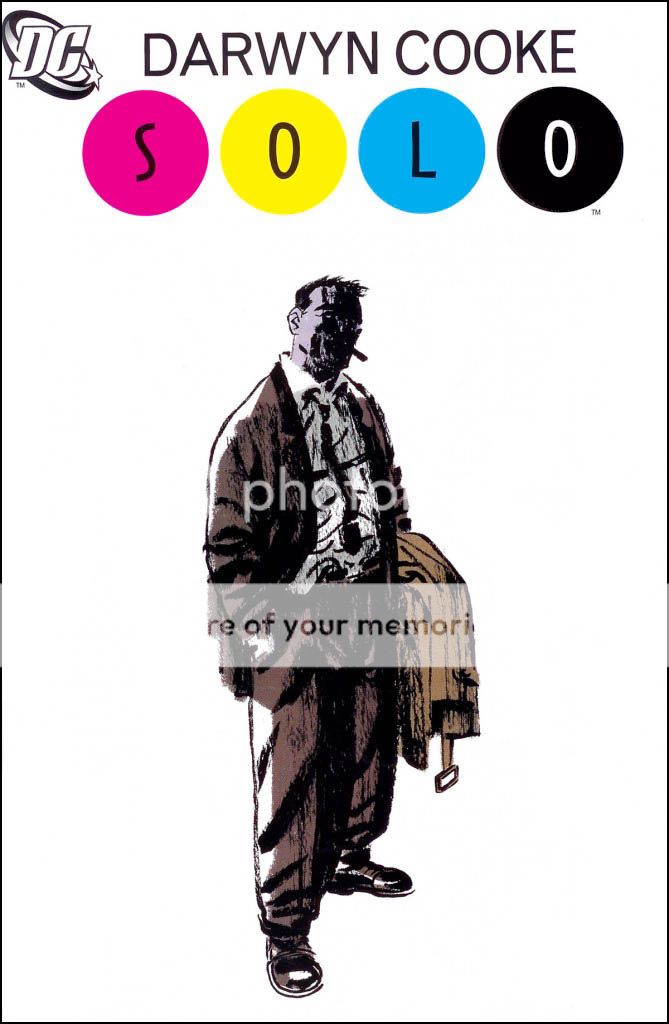
Mark chose to design the cover of this book with an overall emphasis on the individual artist. Hence the white space on the book, and a focus on the logo above the “solo” artist.
Adam Grano – (designer at Fantagraphics)
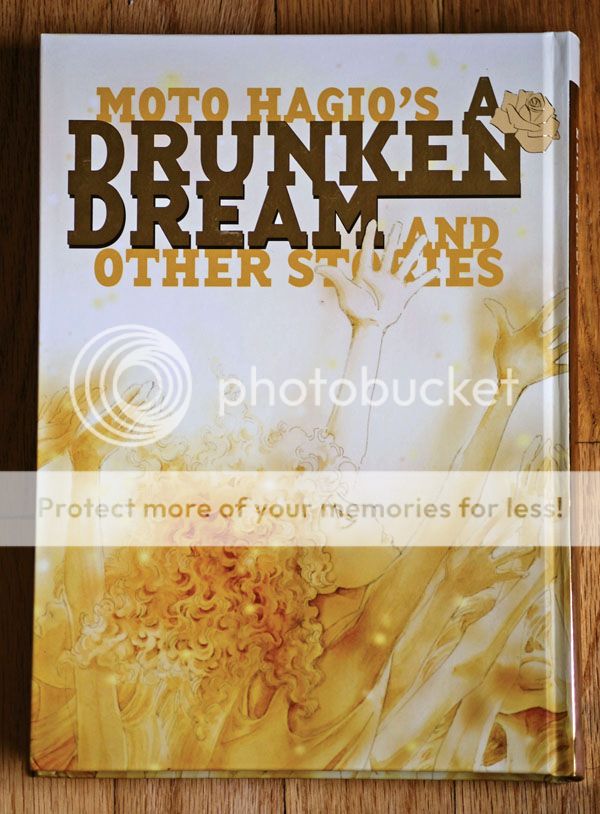
Adam took the title of this book quite literally, and let loose with his design to truly emphasize the title. He called it “method design.” He wanted the cover to look like a drunken dream.
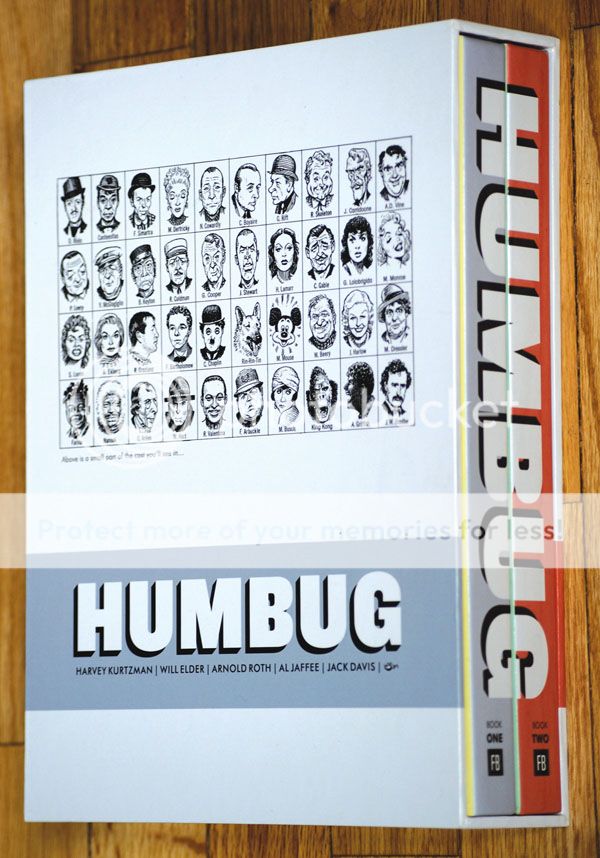
For the Humbug collection, Grano tried hard not to impress too much of himself (and his tastes) in the design of the cover. He wanted to inject simplicity in a project that would stand the test of time, because it was a collector’s series.
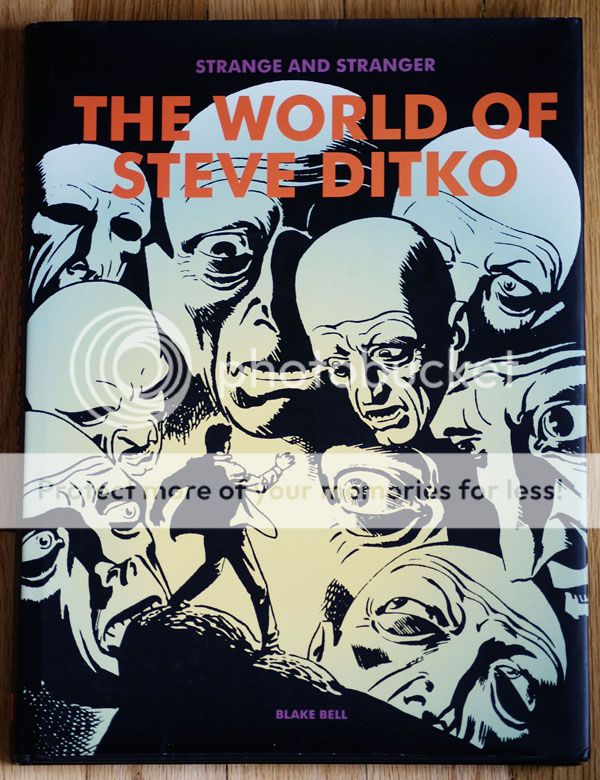
Grano considered this design project his “failure.” It contrasts greatly with the simplicity and elegance of Humbug. He mentioned that everyone on the page is scripted and gridded, something that designers try to avoid in comics.
Chip Kidd – (designer at Random House)
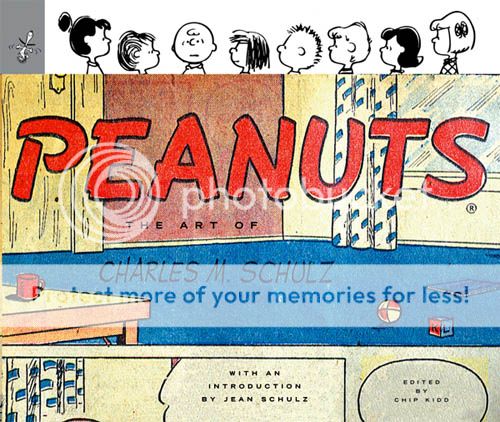
Chip Kidd had the honor of working on the first posthumous Peanuts release after Charles M. Schultz’s death, and took to the project quite seriously. In the cover, he wanted to deconstruct a Peanuts strip. All of the human element is taken out of the strip, with the characters on the cover up to their necks in suburban anxiety.
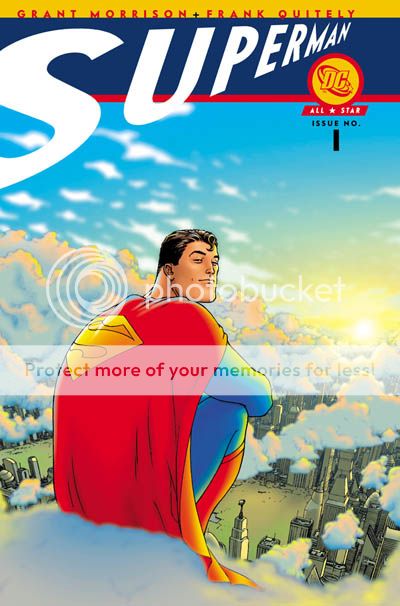
Kidd likes this cover because he considers it an updated spin on Superman. It’s not a classic Superman panel, so he designed a logo that deviated from the classic “Superman” logo to match.
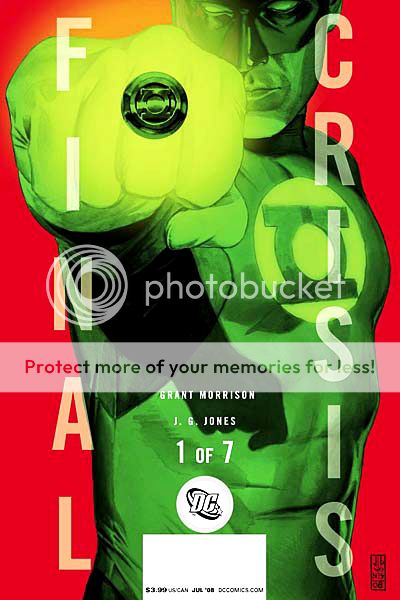
Kidd chose this as his design “failure”, but not the design itself. The cover represents one of seven volumes, in which the logo pictured disintegrates by the seventh issue, to match the crisis in the title. Kidd’s only regret here is that he was too subtle. He wishes he’d chosen to start the logo disintegration progression sooner, as there’s very little difference between the first few volumes.
Fawn Lau – (designer at VIZ)

Fawn was commissioned to redesign this book cover for an American audience. Keeping this in mind, and wanting the Japanese animation to be more legible for the American audience, she didn’t want too heavy-handed of a logo. In an utterly genius stroke of creativity, Lau went to an art store, bought $70 worth of art supplies, and played around with them until she constructed the “Picasso” logo. Clever, clever girl!
Mark Siegel – (First Second Books)
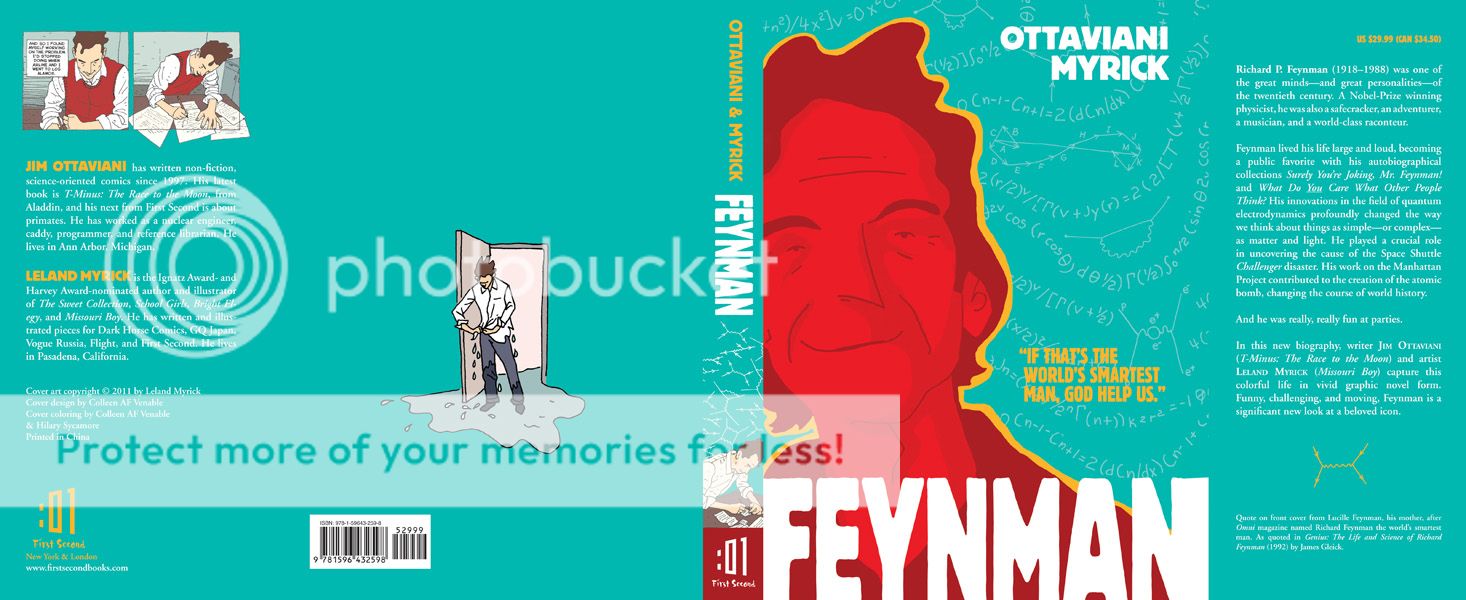
Mark Siegel was hired to create the cover of the new biography Feynman, an eponymous title about one of the most famous physicists of all time. Feynman was an amazing man who lived an amazing life, including a Nobel Prize in physics in 1965. His biographer, Ottaviani Myrick, a nuclear physicist and speed skating champion, is an equally accomplished individual. The design of the cover was therefore chosen to reflect their dynamic personalities. The colors were chosen to represent the atomic bomb and Los Alamos, New Mexico, where Feynman assisted in the development of The Manhattan Project. Incidentally, the quote on the cover – “If that’s the world’s smartest man, God help us!” – is from Feynman’s own mother.
Keith Wood – (Oni Press)
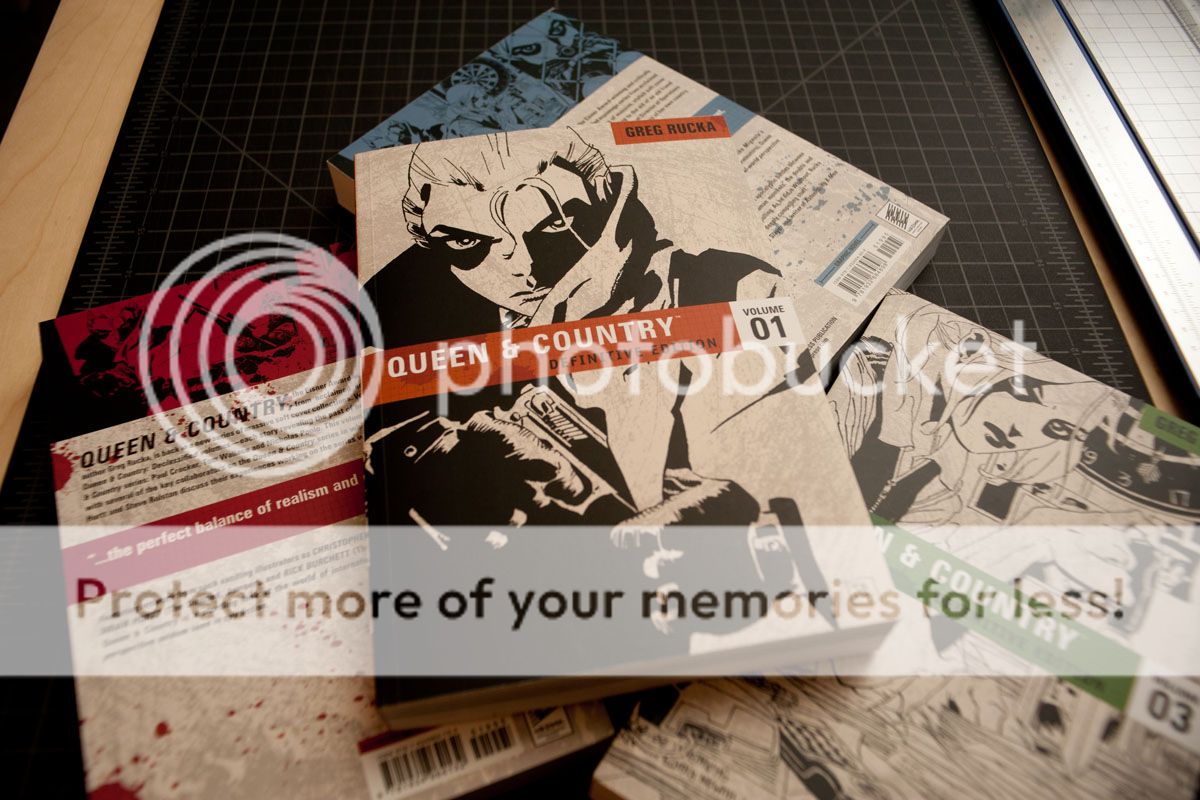
Wood remarked that this was the first time he was able to do design on a large scale, which really worked for this project. He chose a very basic color scheme, again to emphasize a collection standing the test of time, and designed all the covers simultaneously, including color schemes and graphics. He felt this gave the project a sense of connectedness.
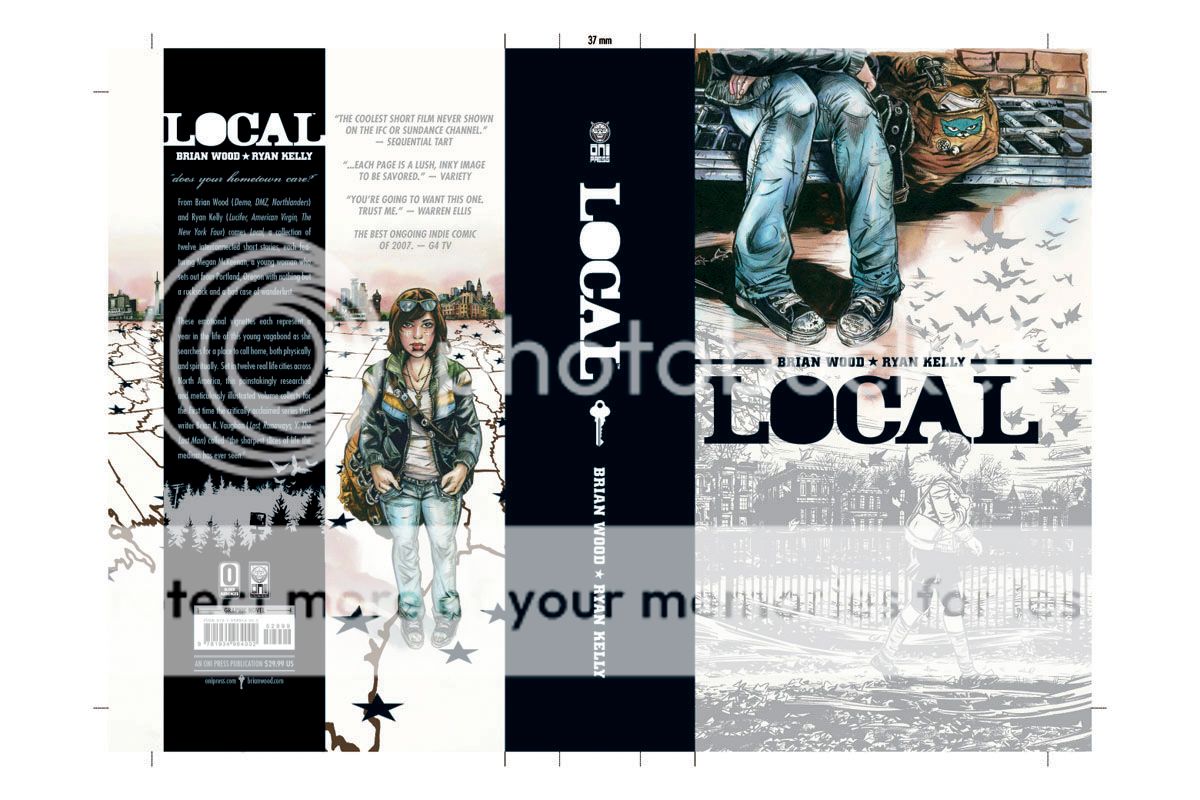
Wood chose a pantone silver as the base of this design with a stenciled typeface meant to look very modern. The back of the cover and the front of the cover were initially going to be reversed when the artists first brought him the renderings. However, Wood felt that since the book’s content is about the idea of a girl’s traveling across the United States, it would be more compelling and evocative to use feet/baggage as the front of the book. He was also the only graphic artist to show a progression of 10-12 renderings, playing with colors, panels and typeface, that led to the final design. He believes in a very traditional approach to design, which includes hand sketches and multiple renderings.
The Culture of Popular Things: Ethnographic Examinations of Comic-Con 2010
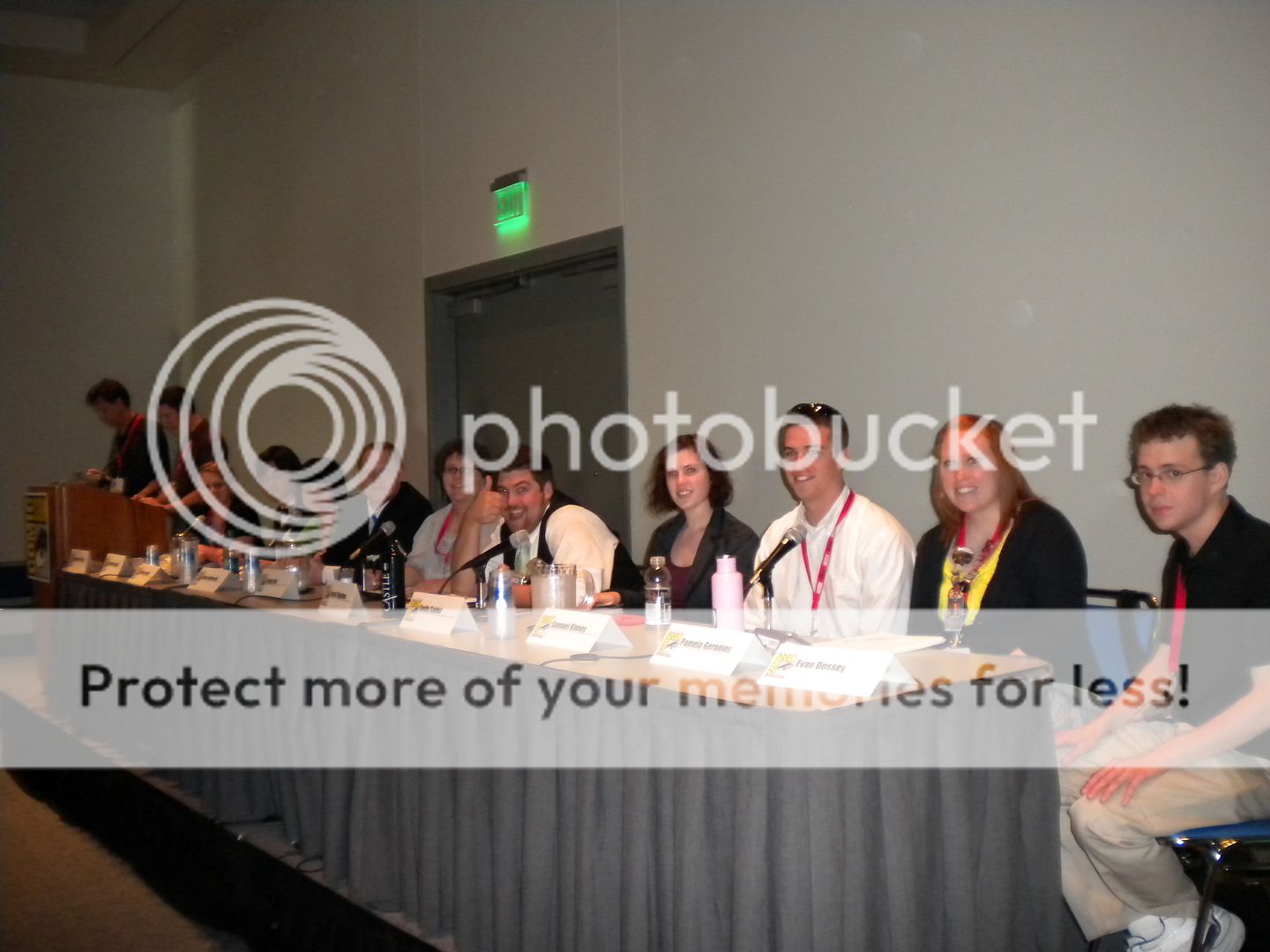
Each year, for the past four years, Comic-Con ends on an academic note. Matthew J. Smith, a professor at Wittenberg University in Ohio, takes along a cadre of students, graduate and undergraduate, to study Comic-Con; the nerds, the geeks, the entertainment component, the comics component, to ultimately understand the culture of what goes on in this fascinating microcosm of consumerism and fandom. By culture, the students embrace the accepted definition by famous anthropologist Raymond J. DeMallie: “what is understood by members of a group.” The students ultimately wanted to ask why people come to Comic-Con in general. They are united by the general forces of being fans; this is what is understood in their group. After milling around the various locales that constituted the Con, the students deduced that two ultimate forces were simultaneously at play. The fan culture drives and energizes the Con as a whole, while strong marketing forces were on display in the exhibit halls and panels.
Maxwell Wassmann, a political economy student at Wayne State University, pointed out that “secretly, what we’re talking about is the culture of buying things.” He compared Comic-Con as a giant shopping mall, a microcosm of our economic system in one place. “If you’ve spent at least 10 minutes at Comic-Con,” he pointed out, “you probably bought something or had something tried to be sold to you. Everything is about marketing.” As a whole, Comic-Con is subliminally designed to reinforce the idea that this piece of pop culture, which ultimately advertises an even greater subset of pop culture, is worth your money. Wassmann pointed out an advertising meme present throughout the weekend that we took notice of as well—garment-challenged ladies advertising the new Green Hornet movie. The movie itself is not terribly sexy, but by using garment-challenged ladies to espouse the very picture of the movie, when you leave Comic-Con and see a poster for Green Hornet, you will subconsciously link it to the sexy images you were exposed to in San Diego, greatly increasing your chances of wanting to see the film. By contrast, Wassmann also pointed out that there is a concomitant old-town economy happening; small comics. In the fringes of the exhibition center and the artists’ space, a totally different microcosm of consumerism and content exchange.
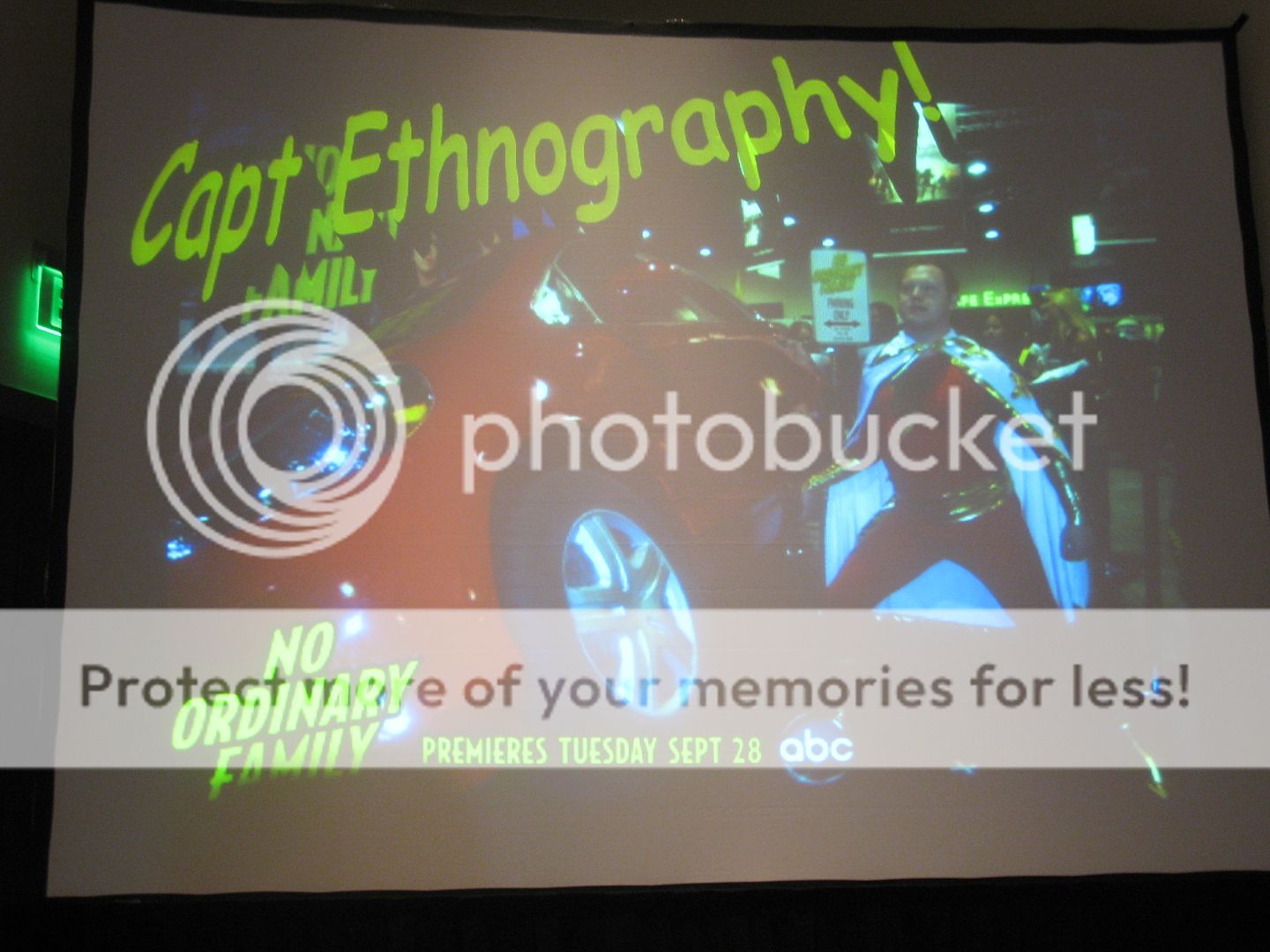
Kane Anderson, a PhD student at UC Santa Barbara getting his doctorate in “Superheroology” (seriously, why didn’t I think of that back in graduate school??), came to San Diego to observe how costumes relate to the superhero experience. To fully absorb himself in the experience, and to gain the trust of Con attendees that he’d be interviewing, Anderson came in full costume (see above picture). Overall, he deduced that the costume-goers, who we will openly admit to enjoying and photographing during our stay in San Diego, act as goodwill ambassadors for the characters and superheroes they represent. They also add to the fantasy and adventure of Comic-Con goers, creating the “experience.” The negative side to this is that it evokes a certain “looky-loo” effect, where people are actively seeking out, and singling out, costume-wearers, even though they only constitute 5% of all attendees.
Tanya Zuk, a media masters student from the University of Arizona, and Jacob Sigafoos, an undergraduate communications major at Wittenberg University, both took on the mighty Hollywood forces invading the Con, primarily the distribution of independent content, an enormous portion of the programming at Comic-Con (and a growing presence on the web). Zuk spoke about original video content, more distinctive of new media, is distributed primarily online. It allows for more exchange between creators and their audience than traditional content (such as film and cable television), and builds a community fanbase through organic interaction. Sigafoos expanded on this by talking about how to properly market such material to gain viral popularity—none at all! Lack of marketing, at least traditional forms, is the most successful way to promote a product. Producing a high-quality product, handing it off to friends, and promoting through social media is still the best way to grow a devoted following.
And speaking of Hollywood, their presence at Comic-Con is undeniable. Emily Saidel, a Master’s student at NYU, and Sam Kinney, a business/marketing student at Wittenberg University, both took on the behemoth forces of major studios hawking their products in what originally started out as a quite independent gathering. Saidel tackled Hollywood’s presence at Comic-Con, people’s acceptance/rejection thereof, and how comics are accepted by traditional academic disciplines as didactic tools in and of themselves. The common thread is a clash between the culture and the community. Being a member of a group is a relatively simple idea, but because Comic-Con is so large, it incorporates multiple communities, leading to tensions between those feeling on the outside (i.e. fringe comics or anime fans) versus those feeling on the inside (i.e. the more common mainstream fans). Comics fans would like to be part of that mainstream group and do show interest in those adaptations and changes (we’re all movie buffs, after all), noted Kinney, but feel that Comic-Con is bigger than what it should be.
But how much tension is there between the different subgroups and forces? The most salient example from last year’s Con was the invasion of the uber-mainstream Twilight fans, who not only created a ruckus on the streets of San Diego, but also usurped all the seats of the largest pavilion, Hall H, to wait for their panel, locking out other fans from seeing their panels. (No one was stabbed.) In reality, the supposed clash of cultures is blown out of proportion, with most fans not really feeling the tension. To boot, Seidel pointed out that tension isn’t necessarily a bad thing, either. She gave a metaphor of a rubber band, which only fulfills its purpose with tension. The different forces of Comic-Con work in different ways, if sometimes imperfectly. And that’s a good thing.
Incidentally, if you are reading this and interested in participating in the week-long program in San Diego next year, visit the official website of the Comic-Con field study for more information. Some of the benefits include: attending the Comic-Con programs of your choice, learning the tools of ethnographic investigation, and presenting the findings as part of a presentation to the Comics Arts Conference. Dr. Matthew Smith, who leads the field study every year, is not just a veteran attendee of Comic-Con, but also the author of The Power of Comics.
COMIC-CON SPOTLIGHT ON: Charles Yu, author of How To Live Safely in a Science Fictional Universe.
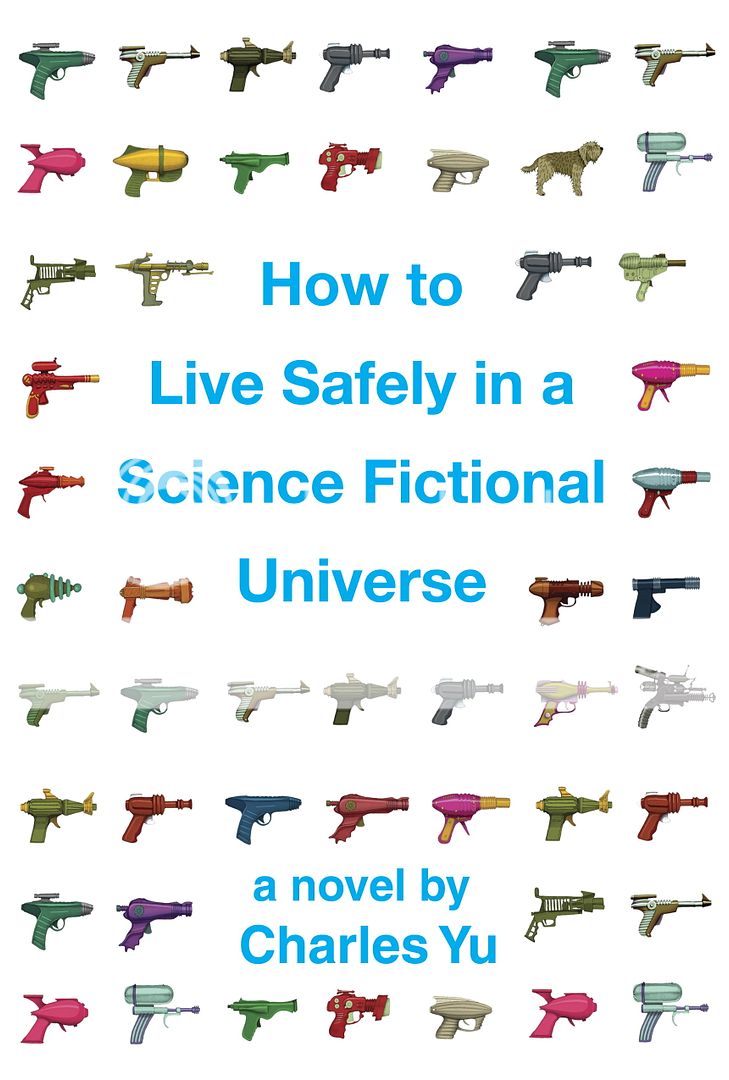
Here at ScriptPhD.com, we love hobnobbing with the scientific and entertainment elite and talking to writers and filmmakers at the top of their craft as much as the next website. But what we love even more is seeking out new talent, the makers of the books, movies and ideas that you’ll be talking about tomorrow, and being proud to be the first to showcase their work. This year, in our preparation for Comic-Con 2010, we ran across such an individual in Charles Yu, whose first novel, How To Live Safely in a Science Fictional Universe premieres this fall, and who spoke about it at a panel over the weekend. We had an opportunity to have lunch with Charles in Los Angeles just prior Comic-Con, and spoke in-depth about his new book, along with the state of sci-fi in current literature. We’re pretty sure Charles Yu is a name science fiction fans are going to be hearing for some time to come. ScriptPhD.com is proud to shine our 2010 Comic-Con spotlight on Charles and his debut novel, which is available September 7, 2010.
How To Live Safely in a Science Fictional Universe is the story of a son searching for his father… through quantum-space time. The story takes place on Minor Universe 31, a vast story-space on the outskirts of fiction, where paradox fluctuates like the stock market, lonely sexbots beckon failed protagonists, and time travel is serious business. Every day, people get into time machines and try to do the one thing they should never do: try to change the past. That’s where the main character, Charles Yu, time travel technician, steps in. Accompanied by TAMMY (who we consider the new Hal), an operating system with low self-esteem, and a nonexistent but ontologically valid dog named Ed, Charles helps save people from themselves. When he’s not on the job, Charles visits his mother (stuck in a one-hour cycle, she makes dinner over and over and over) and searches for his father, who invented time travel and then vanished.
Questions for Charles Yu
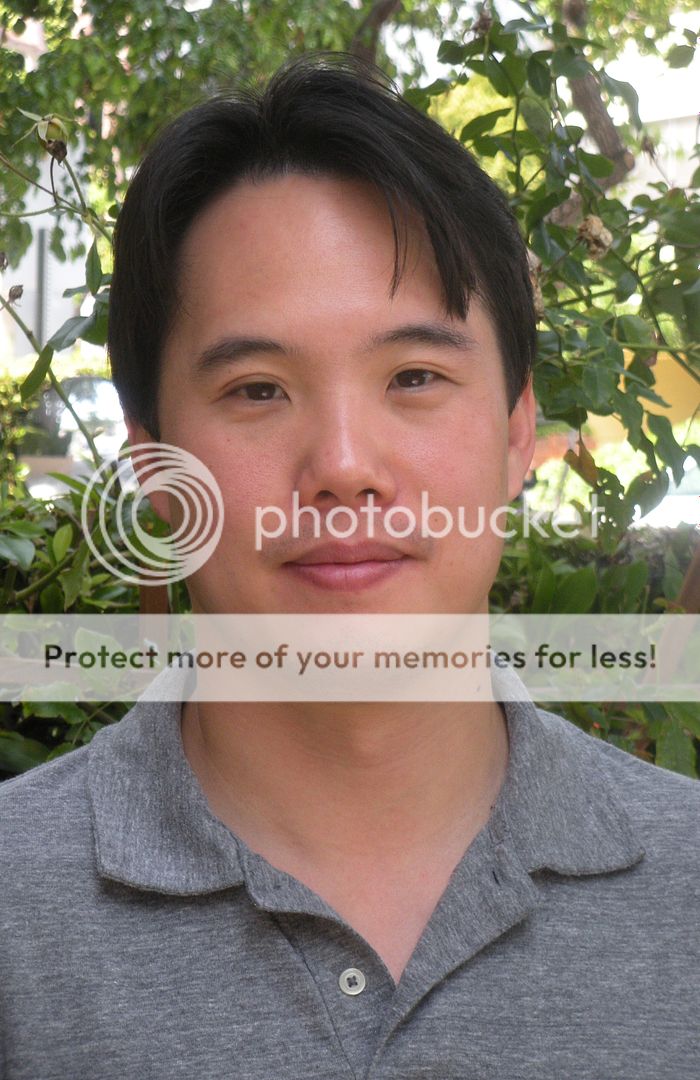
ScriptPhD.com: Charles, the story has tremendous traditional sci-fi roots. Can you discuss where the inspiration for this came from?
Charles Yu: Well the sci-fi angle definitely comes from being a kid in the 80s, when there were blockbuster sci-fi things all over the place. I’ve always loved [that time], as a casual fan, but also wanted to write it. I didn’t even start doing that until after I’d graduated from law school. I did write, growing up, but I never wrote fiction—I didn’t think I’d be any good at it! I wrote poetry in college, minored in it, actually. Fiction and poetry are both incredibly hard, and poetry takes more discipline, but at least when I failed in my early writing, it was a 100 words of failure, instead of 5,000 words of it.
SPhD: What were some of your biggest inspirations growing up (television or books) that contributed to your later work?
CY: Definitely The Foundation Trilogy. I remember reading that in the 8th grade, and I remember spending every waking moment reading, because it was the greatest thing I’d ever read. First of all, I was in the 8th grade, so I hadn’t read that many things, but the idea that Asimov created this entire self-contained universe, it was the first time that I’d been exposed to that idea. And then to have this psychohistory on top, it was kind of trippy. Psychohistory is the idea that social sciences can be just as rigorously captured with equations as any physical science. I think that series of books is the main thing that got me into sci-fi.
SPhD: Any regrets about having named the main character after yourself?
CY: Yes. For a very specific reason. People in my life are going to think it’s biographical, which it’s very much not. And it’s very natural for people to do that. And in my first book of short stories, none of the main characters was named after anyone, and still I had family members that asked if that was about our family, or people that gave me great feedback but then said, “How could you do that to your family?” And it was fiction! I don’t think the book could have gotten written had I not left that placeholder in, because the one thing that drove any sort of emotional connection for the story for me was the idea of having less things to worry about. The other thing is that because the main character is named after you, as you’re writing the book, it acts as a fuel or vector to help drive the emotional completion.
SPhD: In the world of your novel, people live in a lachrymose, technologically-driven society. Any commentary therein whatsoever on the technological numbing of our own current culture?
CY: Yes. But I didn’t mean it as a condemnation, in a sense. I wouldn’t make an overt statement about technology and society, but I am more interested in the way that technology can sometimes not connect people, but enable people’s tendency to isolate themselves. Certainly, technology has amazing connective possibilities, but that would have been a much different story, obviously. The emotional plot-level core of this book is a box. And that sort of drove everything from there. The technology is almost an emotional technology that [Charles, the main character] has invented with his dad. It’s a larger reflection of his inability to move past certain limitations that he’s put on himself.
SPhD: What drives Charles, the main character of this book?
CY: What’s really driving Charles emotionally is looking for his dad. But more than that, is trying to move through time, to navigate the past without getting stuck in it.
SPhD: Both of his companions are non-human. Any significance to that?
CY: It probably speaks more to my limitations as a writer [laughs]. That was all part of the lonely guy type that Charles is being portrayed as. If he had a human with him, he’d be a much different person.
SPhD: The book abounds in scientific jargon and technological terminology, which is par for the course in science fiction, but was still very ambitious. Do you have high expectations of the audience that will read this book?
CY: Yeah. I was just reading an interview where the writer essentially said “You can never go wrong by expecting too much [of your audience].” You can definitely go wrong the other way, because that would come off as terrible, or assuming that you know more. But actually, my concerns were more in the other direction, because I knew I was playing fast and loose with concepts that I know I don’t have a great grasp of. I’m writing from the level of amateur who likes reading science books, and studied science in college—an entertainment layreader. My worry was whether I was BSing too much [of the science]. There are parts where it’s clearly fictional science, but there are other parts that I cite things that are real, and is anyone who reads this who actually knows something about science going to say “What the heck is this guy saying?”
SPhD: How To Live… is written in a very atavistic, retro 80s style of science fiction, and really reminded me of the best of Isaac Asimov. How do you feel about the current state of sci-fi literature as relates to your book?
CY: Two really big keys for me, and things I was thinking about while writing [this book], were one, there is kind of a kitchiness to sci-fi, and I think that’s kind of intentional. It has a kind of do-it-yourself aesthetic to it. In my book, you basically have a guy in the garage with his dad, and yes the dad is an engineer, but it’s in a garage without great equipment, so it’s not going to look sleek, you can imagine what it’s going to look like—it’s going to look like something you’d build with things you have lying around in the garage. On the other hand, it is supposed to be this fully realized time machine, and you’re not supposed to be able to imagine it. Even now, when I’m in the library in the science-fiction section, I’ll often look for anthologies that are from the 80s, or the greatest time travel stories from the 20th Century that cover a much greater range of time than what’s being published now. It’s almost like the advancement of real-world technology is edging closer to what used to be the realm of science fiction. The way that I would think about that is that it’s not exploting what the real possibility of science fiction is, which is to explore a current world or any other completely strange world, but not a world totally envisionable ten years from now. You end up speculating on what’s possible or what’s easily extrapollatable from here; that’s not necessarily going to make for super emotional stories.
Charles Yu is a writer and attorney living in Los Angeles, CA.
Last, but certainly not least, is our final Costume of the Day. We chose this young ninja not only because of the coolness of his costume, but because of his quick wit. As we were taking the snapshot he said, “I’m smiling, you just can’t see it.” And a check mate to you, young sir.
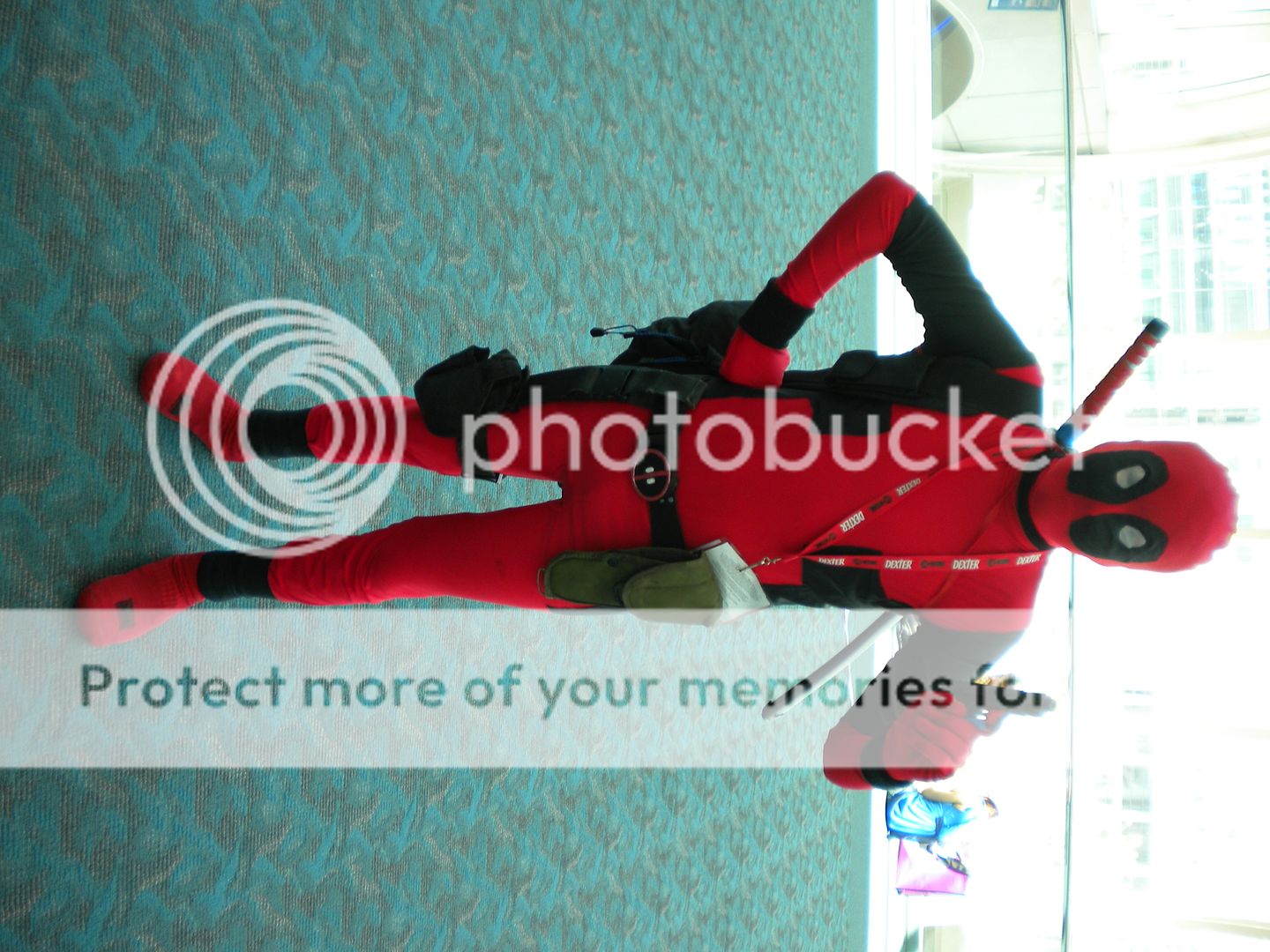
Incidentally, you can find much more photographic coverage of Comic-Con on our Facebook fan page. Become a fan, because this week, we will be announcing Comic-Con swag giveaways that only Facebook fans are eligible for.
~*ScriptPhD*~
*****************
ScriptPhD.com covers science and technology in entertainment, media and advertising. Hire our consulting company for creative content development.
Subscribe to free email notifications of new posts on our home page.
]]>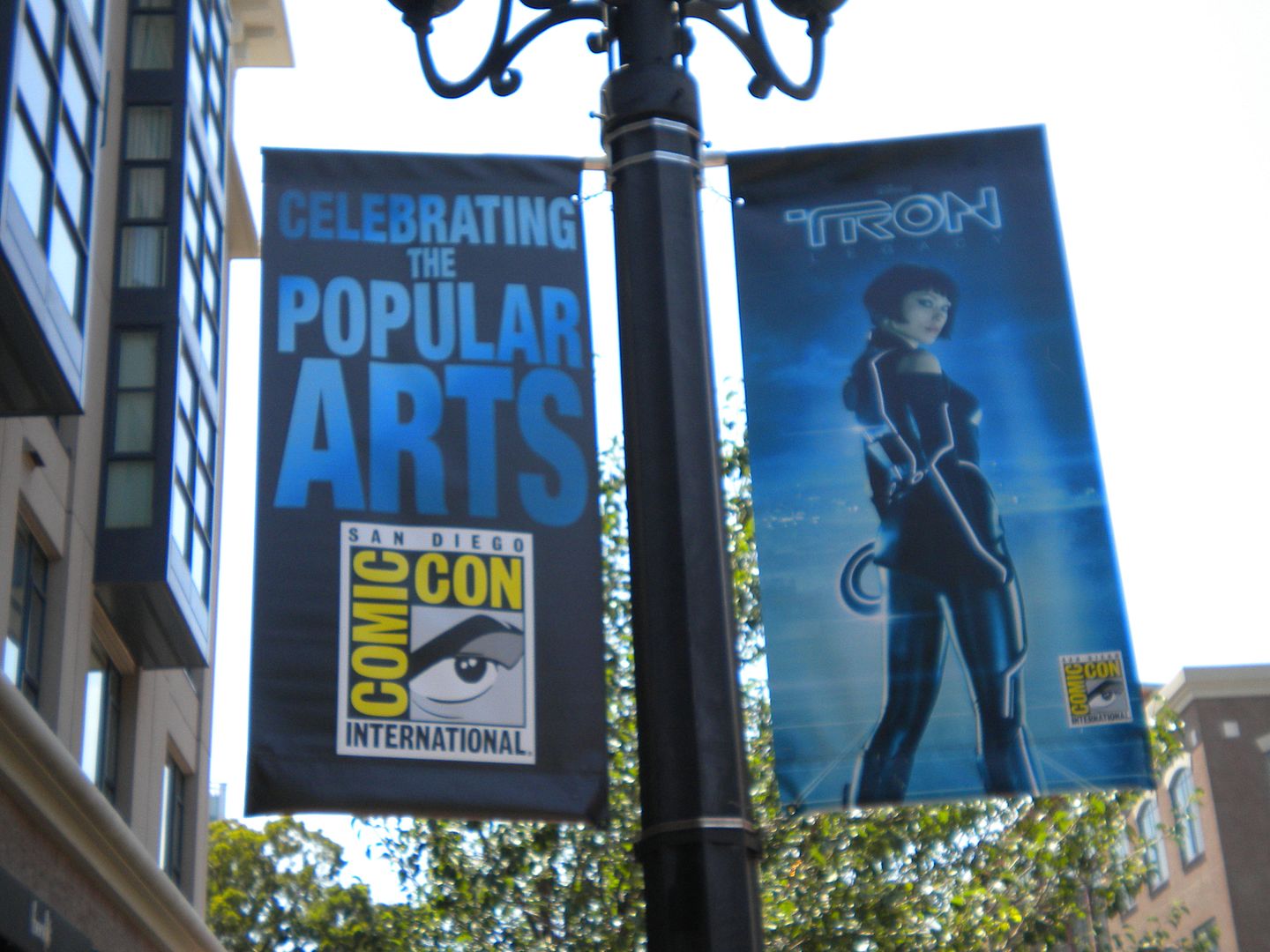
Day 3 was Star Wars Day at San Diego Comic-Con International and we have something shocking to report, ladies and gentlemen. We did not see a single light saber, not one! Since we almost incurred an unfortunate eye injury last year due to an overenthusiastic Jedi, this was most welcome relief. For ScriptPhD.com, today was all about science and technology. In a day that could not have been more tailor-made for our website, we enjoyed panels with the eminent sci-fi television writers of today discussing writing for genre TV (a must-read for any aspiring TV writers out there!), a visit from the greatest science fiction writer in the history of science fiction, Ray Bradbury, a preview of next season’s sci-fi show The Event, and a panel on how exactly shows like CSI “tech” out with gadgets galore. Oh, yes, did we mention we got to hang out privately with the MythBusters?? With the help of our intrepid reporter Bryy Miller, we bring you the most complete Comic-Con coverage on the web. Plus, our Costume of the Day, after the “continue reading” cut!
The Write Stuff: Creating Genre Television
LOST. CSI. V. Battlestar Galactica. It seems that sci-fi, tech, and geek-chic television is everywhere. Not only is it a staple of prime time (across basic and extended cable), it’s an increasingly popular genre for which good writers are constantly in demand. Since we are SCRIPTPhD.com, an opportunity to listen in as a panel of some of today’s hottest genre television writers gave away secrets of their craft and advice for aspiring writers was irresistible.
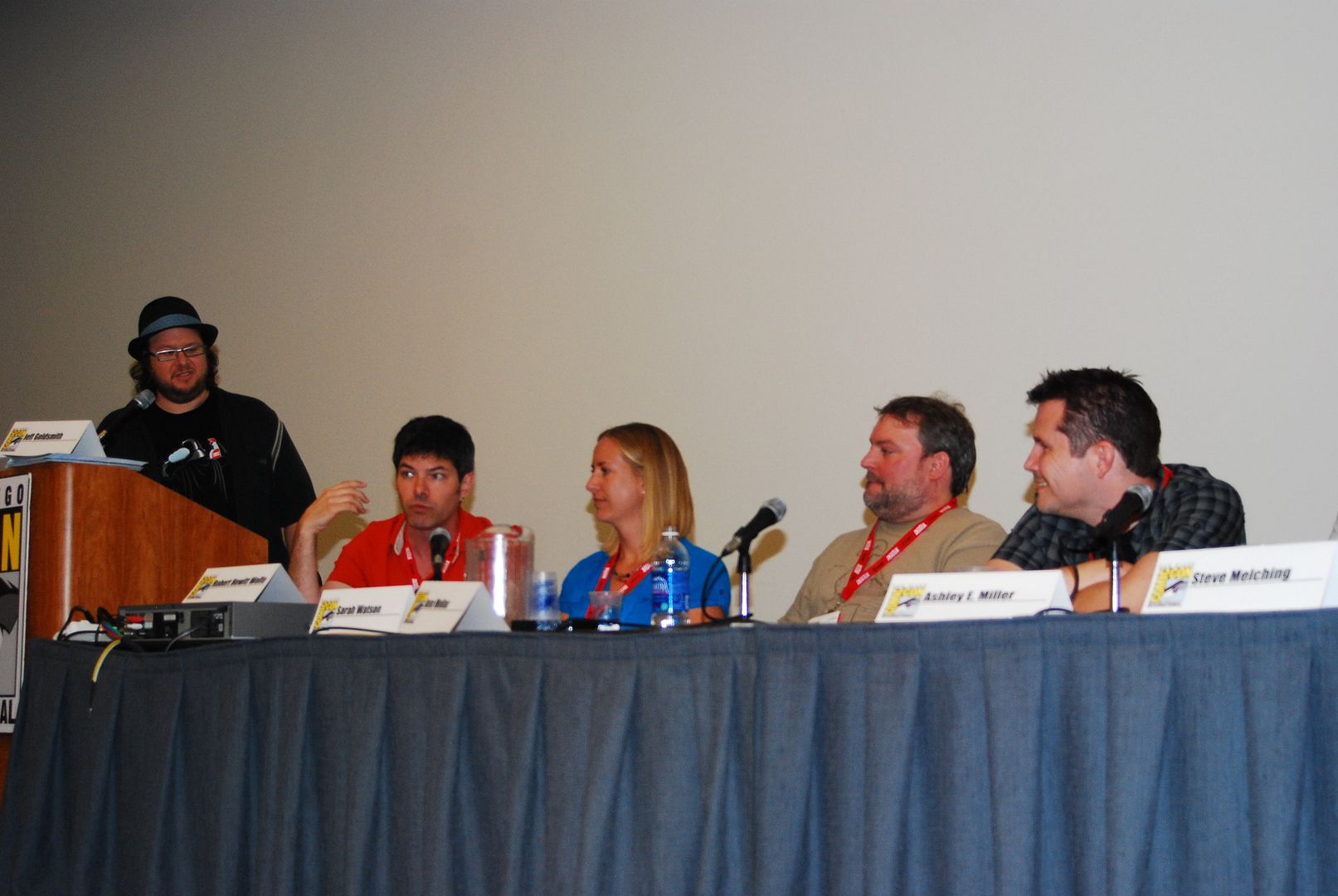
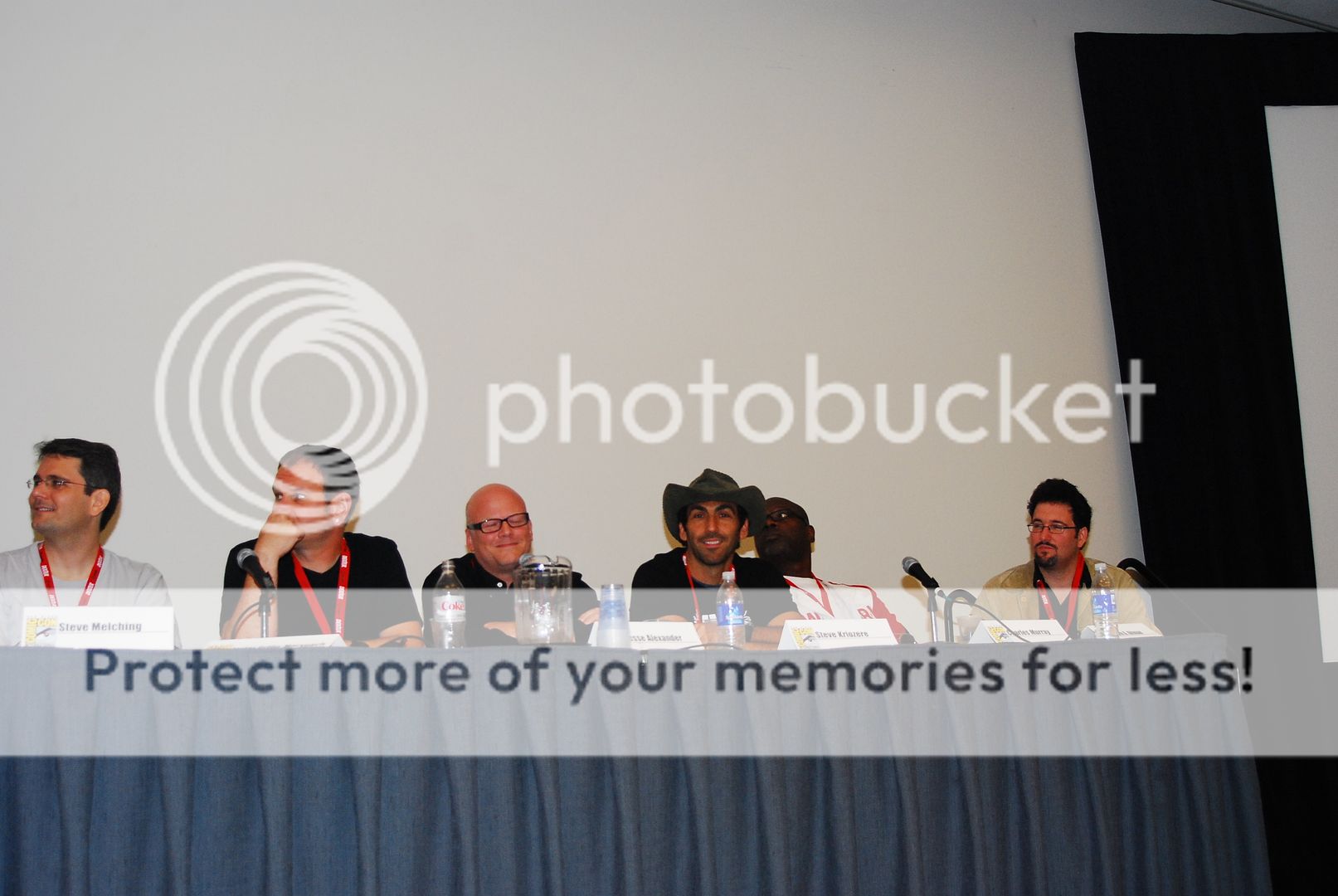
Since this panel consisted of so many writers, albeit a dream team thereof, there was only an allotted amount of time for three questions, each of which the panelists answered one by one down the line, and quite enthusiastically. The moderator, Jeff Goldsmith, who runs the industry rag Creative Screenwriting correctly pointed out that not only are they all working in TV, but if they weren’t on this panel, they’d be at Comic-Con anyway. He called them the “Algonquin geek table.” The first question was to ask each screenwriter what brilliant idea they had that would revolutionize a show they were working on at the time, but that couldn’t get past the network censors.
Mark Altman (Castle, Elvis Van Helsing) recalled creating a pilot called Elvis Van Helsing, but ABC went with The Middle Man instead. So he turned it into a graphic novel, and the rest was history. Charles Murray (V, Criminal Minds) actually recalled a terrific idea for an episode of Criminal Minds, where a serial killer would put a milk carton in someone’s fridge and the “Have You Seen This Person?” picture would be of the dead person. Clever, we thought! Steve Kriozere (NCIS, VIP) had the clever idea on VIP of casting Bruce Campbell to play Pamela Anderson’s uncle. The amazing and talented Jesse Alexander (Alias, LOST, Heroes) recalled a victory for geeks in the form of Heroes Season 1 in an episode entitled Days of Future Past where all the characters went into alternate future. He mentioned that it was so hard to approve and get on air, but the episode went on to win multiple awards. What didn’t make it? “Season 5.”
Steve Melching (Clone Wars, Transformers, The Batman) recalled writing for the animated series The Batman taking place in his first few years in Gotham City, and wanted (but failed) to approve a B story about a frat boy group dressing up in D-List costumes, committing fake crimes and then videotaping their subsequent ass kicking by Batman. We wonder why that didn’t get approved. Ashley E. Miller (Fringe, Terminator) wanted a Fringe follow up to the episode “Bishop Revival,” which had an immortal Nazi. He wanted a flashback episode to 1942, where we find out that Agent Phillip Broyles is 100 years old, and whacking Nazis. Jose Molina (Castle, Firefly) wanted a Firefly payoff episode with a 9-months-pregnant woman being evil, where the team kills her but they save the baby, and the episode would consist of three acts of “Three Men and a Baby.” Right. Sarah Watson (Middleman, Parenthood) recalled being hired to do a SyFy Channel movie of the week about an untapped volcano under Manhattan (seriously!), and she had grand plans for lava engulfing Statue of Liberty, taking over all of Manhattan island, but when the movie got produced the visual ended up being lava trickling out from under a garage. Robert Hewitt Wolfe (The Gates, Deep Space Nine) was writing for 4400 in its final season, and was obsessed with the idea of creating an aerosol promycin bomb over Seattle (hmmm, as a Seattleite, I booed this from the audience). The showrunners created a promycin bomb at the end. So the next time you think all TV writers are geniuses, just remember that for every great episode of your favorite show, there were many bad ideas tossed around in the writers’ room.
Next, Goldsmith asked the panel to recount (as diplomatically as possible) the stupidest network notes they’d ever encountered for a show script they worked on.
Mark Altman recalled working on a SyFy Channel movie where executives asked him to recap the whole plot at the beginning of the hour because of people tuning in from HBO. Charles Murray, while working on V, was told he couldn’t use the word lizard in an episode. How do you get past something like that, he was asked. “I left the show. That’s how you get past it.” Steve Kriozere revealed the #1 SyFy Channel rule of movies: don’t speak to the monster. Jesse Alexander, having worked on some of the greatest sci-fi hits ever, waxed more philosophical. Everyone has an opinion on these shows, but executives want the rules of the show’s world, they want everything spelled out clearly, a lot of exposition. They’re generally happier if the shows are procedurals, but sci-fi shows don’t have room for that—if all the secrets and exposition are revealed it drives people away from the content. Steve Melching pointed out that a lot of animated shows have hyper-sensors because they’re aimed at children. The dumbest note he ever received was that you can’t say “killer satellites.” Ashley E. Miller was reminded (we are shocked!) that you cannot have an 11 year old boy say douchenozzle on prime time TV. Jose Molina recalled an episode of Castle where a body is found in the teaser, the guys go through case, and find out that the victim was killed by a stiletto. Said the executives: “Does the killer have to kill with a shoe?” Sarah Watson revealed that the most annoying thing to writers on shows now is that they’re paid by sponsors, so writers have to put products into scenes strategically. Her worst example was an episode of a show with a surf competition…sponsored by Tampax. To make this work, they had to cover a poor actress’s entire surf bodysuit with Tampax logos. Robert Hewitt Wolfe was taken out to dinner by the main executives of a show he was working on and flat out asked to dumb down the series. Ahhh, the things you learn when the iron curtain goes down.
Finally, Goldsmith asked the panel to give advice to young TV writers (or aspiring writers) on how to best write for a budget, which is unfortunately what most young writers will face on television these days.
Without question, the panel answered unanimously that the secret in the writing is all. about. character. The best and cheapest special effects are two actors in a room with terrific conflict and terrific dialogue—that’s what’s compelling, that’s what’s intimate. Most physical action, they reminded us, is actually superfluous—only revert to it after all possible dialogue is tapped out. Ultimately, you must look at how what you cut (if you are forced to cut things) affects the character. If you put six people in a scene, make sure that all of them need to be in the scene, because it is extremely expensive to shoot. The writers lamented that networks sometimes have too much money, and a subsequent desire to compete with Transformers or Iron Man, which television can’t do. Writers must remember that character works for television, and you can have high-concept ideas for sci-fi. That’s why shows on cable, which are often budget-restricted, are so great. Sarah Watson reminded the audience that you can always make a show cheaper, and fantastic, with great writing and great dialogue. This is how Friday Night Lights, which shoots on a shoestring budget down in Texas, was able to survive for five seasons.
Mostly, in advice relevant to any writer reading this, they said not to repeat past mistakes.
The Event
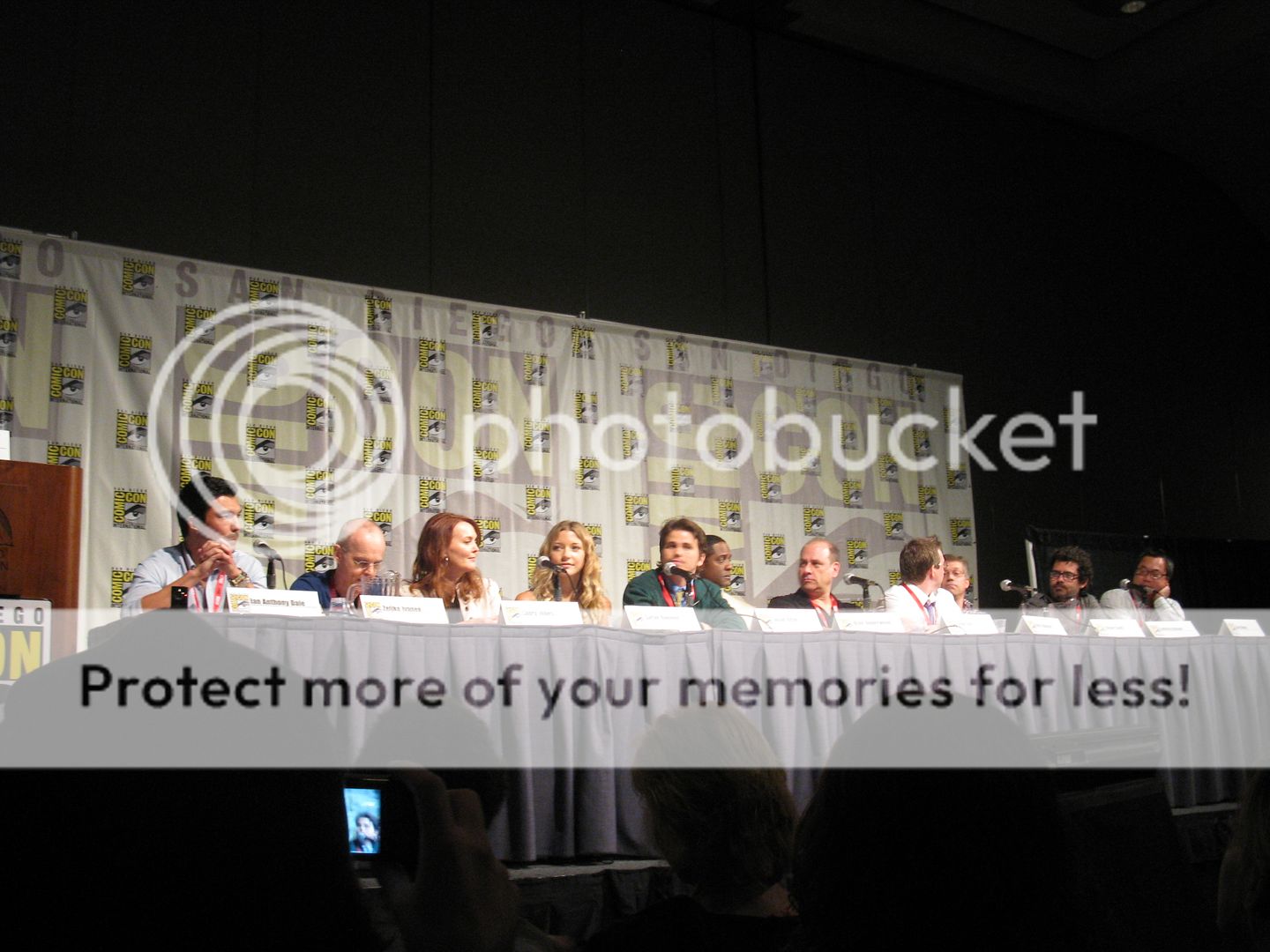
This television show, premiering in the fall of 2010, might be the new LOST, or it might be the new FlashForward. I’m not sure yet. The Event, a show that is so steeped in mystery that even its title is nothing more than Something Happens, was a show—and will be a show—with as many problems as it has concepts. Fortunately, all of its flaws are structural.
The pilot is laid out as three separate stories (well, actually, four, but one is extremely short in comparison) over the course of three separate acts. We actually start the show in the middle of the story when our hero, Sean Walker (Jason Ritter), hijacks a plane in order to save it, and then flash back to eight days earlier, and then forward to seven days earlier, and then once more to the present. It gets even more confusing when President Eli Martinez (the incredibly suave Blair Underwood) gets his go at the story, and then his segment goes back an entire year. The other two stories comprise of the father of Sean’s girlfriend, whose house and family are assaulted by unknown forces, and Simon Lee (Ian Anthony Dale), the supposed second-in-command of a secret government base/prison that lies at the center of The Event. It’s a shame that Lee’s section is so short, as Dale is a fantastic actor even within the confines of such little material. But perhaps the best acting comes from ER/West Wing (and Northwestern University!) alumna, Laura Innes, who absolutely nails her cryptic sayings as Sofia, the leader of the base/prison/thing-to-be-revealed-later.
The show will need to cut out some of the flashes in order to survive past its initial thirteen episodes, but it is definitely a unique format that works for this type of story. The writing was high-quality and so was the dialogue; there were no qualms there. It also revealed quite a bit about the world that had been set up if you looked closely enough. Co-Producer Evan Katz made the promise that answers would actually come a lot faster than with other mystery longforms. This is welcome, especially since I am of the belief that mystery shows can maintain the mystery if they answer questions in the right or clever way. Sometimes, it is even essential to answer them if you want the show to progress to its next level of weirdness. Blair Underwood was then asked what it is like to be the first Cuban president, to which he replied that there would be no Salsa dancing.
Katz then ended the panel the only way it could have possibly ended:
“The Salsa is not The Event.”
Spotlight On: Ray Bradbury
He is brilliant. He is one of the foremost technology predictors since Leonardo DaVinci. He is irreverent, utterly aware of his importance, and quite simply, the greatest science fiction writer in the history of the genre. He none other than Ray Bradbury. Ray has been coming to Comic-Con since the very first year of its inception. A devoted comics and graphic novel buff, he loves interacting yearly with fans, and gracing them with his musings, knowledge and appreciation. We were honored and somewhat overwhelmed to be there in person for Ray’s 41st Comic-Con panel, on the heels of his 90th birthday. Because Bradbury’s words speak for themselves, we bring you the panel through his eyes.
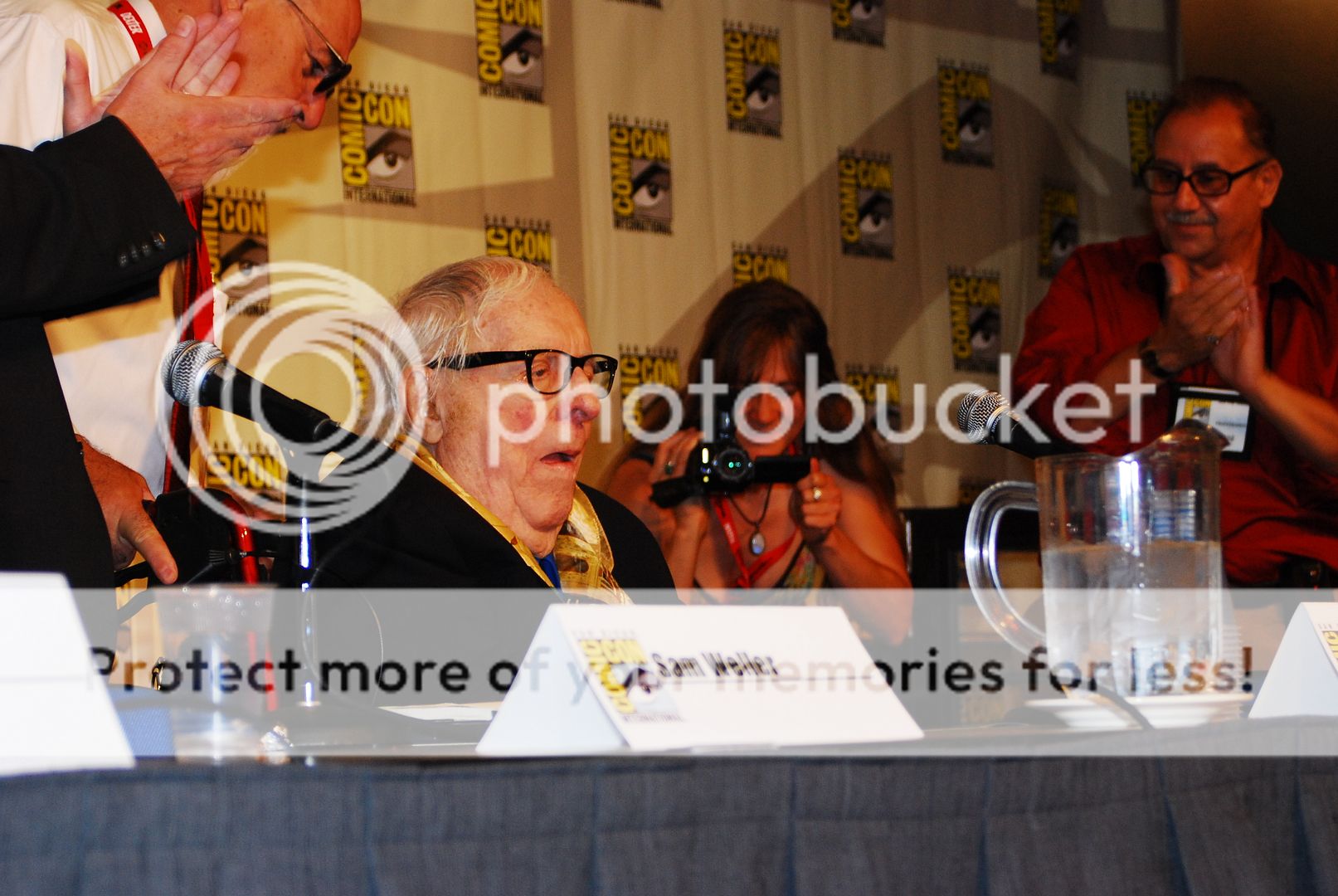
Bradbury, not shy about quips and bold statements, starts out his panel with a bang: “I want to make an announcement. Sam Weller and I are working on a new book together: Let’s Let The Cat out of the Bag.” In actuality, Weller and Bradbury released a brand new book of interviews (out June 29th) entitled Listen to the Echoes: The Ray Bradbury Interviews. Weller has spent over a decade with Bradbury, getting to know him, studying his works, and acted as his guide during the panel (Mr. Bradbury has become a bit hard of hearing). Bradbury is currently working on a new book of 20 short stories entitled “Juggernaut” to be published next Christmas.

On how it feels to be Ray Bradbury and if he ever marvels at himself, after a long, thoughtful pause, a hearty laugh and: “It feels mighty damn good.”
Fahrenheit 451 was among the most prescient sci-fi works of all time, predicting technology such as earbuds, flat screen televisions, school violence, and the rise of graphic novels. How did Bradbury predict all this stuff?
“The secret of life is being in love. By being in love, you predict yourself. Whatever you want is what you get. You don’t think about things; just do them. Don’t predict them—just make them.”
Of the technologies Bradbury predicted, he also warned about many, including rise of mass media. What tech would he like to see next?
Again, a thoughtful pause. “I’d like certain technologies to disappear. The internet is a great, big, stupid goddamn bore.” Keep in mind that when Bradbury was approached by an internet magnate to publish his works as e-books for the internet, he responded with: “Prick up your ears and go to hell!” The internet magnate? None other than the CEO of Yahoo.
Another strong, recurring theme of Bradbury’s panel was his love (adoration, really) of space exploration, most notably colonization of Mars and the Moon. Why? “Because we’re going to live forever. We should go back and build a base on the Moon, put a civilization on Mars. 500 years from now, we’ll go out into the Universe, and when we do that, we have a chance to live forever.”
Weller tried to get Bradbury to discuss the new book, once again evoking his crotchety sense of humour: “You can’t afford it. So get out of here and forget it.” In an extremely revealing, intimate moment, Weller pointed out that many Mars stories and works are inspired by and cut from Bradbury’s Martian Chronicles, none more similar than the Twilight Zone. Bradbury then revealed something that many of his fans probably don’t know. “Rod Sterling came to my house many years ago. He didn’t know anything about writing sci-fi. So I took him down to my basement and gave him copies of books written by Roald Dahl, John Collier, a number of other great sci-fi authors, and myself. Rod Sterling forgot that he read all these books, and when he wrote his programs, he copied some of his ideas from me, and we got into a big argument.” The two never reconciled.
As we’ve mentioned, Bradbury came to Comic-Con in its first year, where he said only 300 people came to first meeting, quite different from today, where 1,000 people were gathered in his room alone. Why does he come so often? “Because I’ve been collecting comic strips all my life. I have 30 years’ of Prince Valiant Sunday illustrations put away, all of Buck Rogers. My background in becoming a writer was falling in love with comic strips.” How did they influence his prose and narrative? “Comic strips are full of imagination and glorious adventures. My all-time favorite is Mutts. A year from now, there will be a graphic novel of “The Martian Chronicles” and “Something Wicked This Way Comes.”” Bradbury is, in fact, the world’s greatest (and possibly oldest) fanboy. He is famous for writing fan letters to writers and other figures that he admires. He sent books to John Huston, the famous screenwriter and filmmaker. He sent a hand-written letter to Edgar Rice Burroughs begging him to come to a meeting of Bradbury’s science fiction society club.
Another thing fans may not know is that Bradbury is considered the patron saint of the American library system. He has been very active in rescuing libraries that are under fire because of budgetary crises. He recounted the story of his love affair with the library. “When I left high school, I had no money to go to college. I decided to not worry about going to college. I thought: “I will educate myself.” So I walked down the street, I walked into a library for 3 days a week for 10 years. Most of you in the audience can’t afford to go to college. But if you want to educate yourself, you can afford to go to the library. When I was 28 years old, I graduated from the library.”
The concept of time travel is explored in the short story “A Sound of Thunder.” If Bradbury could time travel, he was asked to what moment it would be? “Every. Single. Moment. Every single moment of my life has been incredible. I’ve savored it. It’s beautiful, because I’ve remained a boy. The man you see here tonight is a 12 year old boy, and he’s having fun!” How does he stay connected to his inner child? “Don’t worry about the future, or the past, you just explode every day. If you’re dynamic, you don’t have to worry about what age you are.”
Indeed, childhood is a theme of many of his short stories. Why is this so important to Bradbury? “Because I grew up loving carnivals and circuses. That’s why I wrote those stories.”
When asked if he had any regrets in life, Bradbury evoked the biggest laugh of the day: “I regret that I didn’t have more time with Bo Derek.” What’s the Bo Derek story? She came up to him in Paris train station, and exclaimed “Mr. Bradbury, I love you!” To which he responded, “Who are you?” She replied, “My name is Bo Derek. Mr. Bradbury, will you travel on the train with me?” With a stoic face he recalled replying: “Yep, I will!” The rest was censored.
Other than Be Derek, what was his greatest love? Bradbury turned philosophical. “I am the world’s greatest lover. I love to write short stories. I write them. I love to write novels. I write them. I love to write poetry. I write it. I love to paint pictures. I paint them. I loved directing a film. So I directed it. Those are my greatest lovers. I have loved all these things I have told you about.”
What authors inspired Bradbury growing up? “Edgar Rice Burrows. And Edgar Allan Poe—scared the hell out of me.”
Another fact about Bradbury that many people may not know is his rather illuminating and successful career as a designer and architect. He was asked how he got involved with designing the San Diego city center Horton Plaza. ”I designed a lot of other places all over LA. 50 years ago, the people who were building the New World’s Fair asked me to redesign the United States Pavilion. I helped build Epcot down in Florida. Because of those works, the people of San Diego came and asked for input in building The Horton Plaza at the center of San Diego.”
Aldous Huxley famously said of Bradbury, “You know what you are sir? You are a poet.” When asked who the poets are that have influenced his writing, Bradbury immediately responded: “Shakespeare and Alexander Pope.”
What are the things that keep Bradbury motivated now? “I have more work to do.”
On how his writing has changed over time: “It’s gotten more brilliant.”
As such a fan of Mars, Bradbury was asked how he feels about the ongoing Martian probes, and the real science evidence they have brought back to Earth. “I’m glad we are doing that [research], but we should be doing more. We should be going there in person. Not with a lander, but with a real rocket ship and landing on Mars.” In a rather endearing moment, Weller revealed that Bradbury has never driven an automobile. But he was invited to the Jet Propulsion Laboratory in Pasadena, where scientists asked him if he’d like to drive the Mars Rover over Mars. So he hasn’t driven on the 405 freeway, but he has driven across Mars! The scientists even gave him a Martian drivers license.
Any futuristic technologies for cities that Bradbury would like to see? “Monorails all over LA and California. Get rid of the goddamn freeways!” As a Los Angeles resident, hear, hear, Mr. Bradbury!
What was the intended audience of Fahrenheit 451 and how does he feel about its rise to prominence as a true modern American classic? “I am not a science fiction writer. All my books are fantasy. But the one book that is pure science fiction is Fahrenheit 451. So I’m glad that I wrote it. I’m glad that you all feel that way about it too.”
Does Bradbury have a favorite work? “All of my books are my favorites. All of my books are my children. I love all my children.”
How does Bradbury feel about digital books? With a cranky grunt: “I’ve already told you that. I don’t like them. I think of iPads and Kindles as books with a computer screen. Real books smell, real books have memories.” We here at ScriptPhD.com would like to give that statement a heartfelt “AMEN!”
Finally, Bradbury, on turning 90 in a few weeks. How does it feel? “It’s been 90 goddamned incredible years!” To which the audience responded by singing him “Happy Birthday.” A surreal, incredible and special moment.
Teching Out on TV
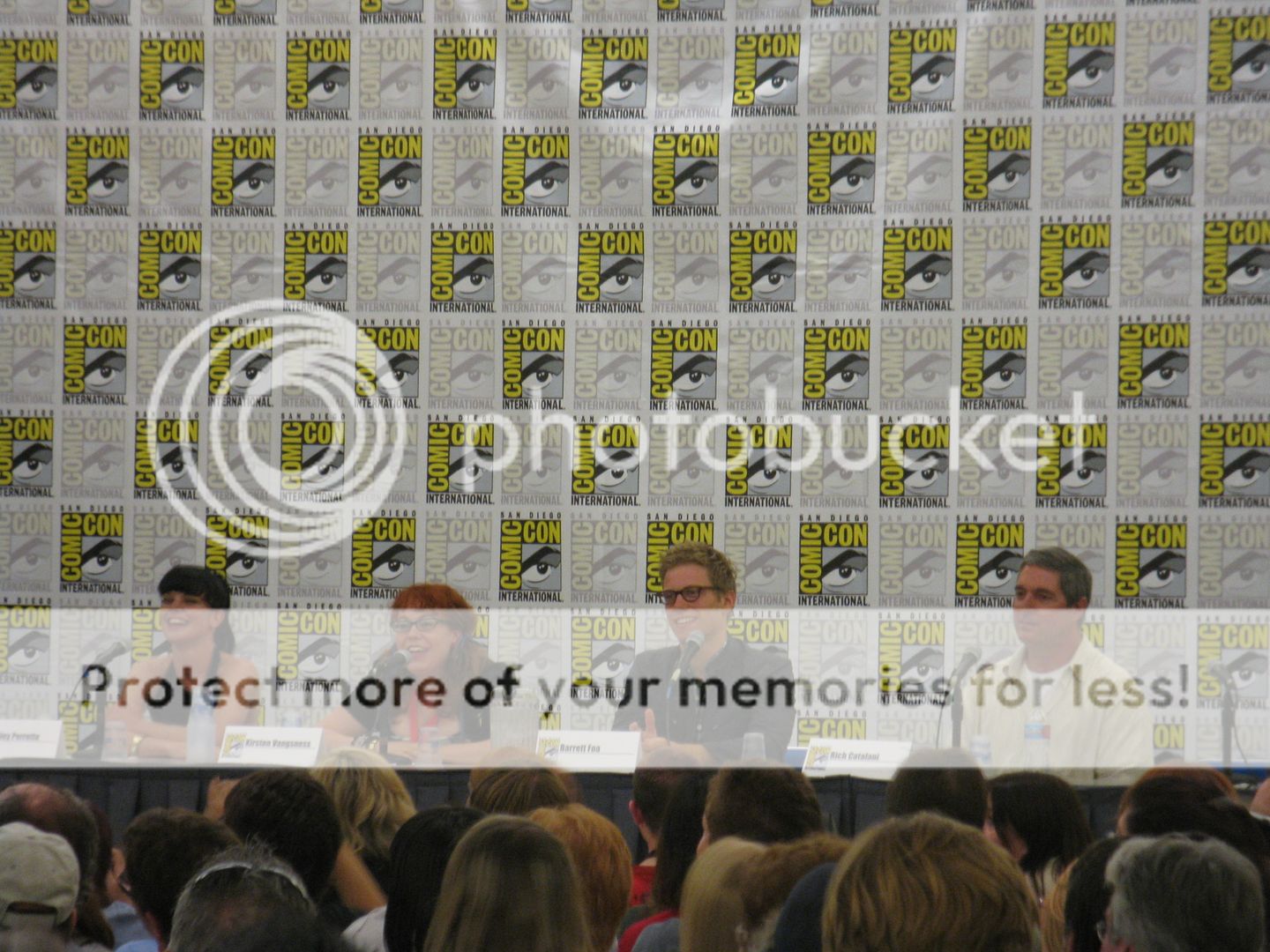
This panel started out with an inundating montage of clips from tech-chic procedurals CSI and NCIS that involved technology of all sorts. It was part awesome and part utterly corny, as words to the song that was spliced in occasionally would find themselves on to the screen. I was afraid that this foreshadowed the panel being just a huge PR stroke for both shows, but I was later proven wrong. Despite the moderator speaking in a loud, fast, incoherent style of mumbling, the rest of the speakers (Anthony Zuicker, creator of CSI; Pauley Perette, CSI; Barrett Foa, NCIS: Los Angeles; Kirsten Vangsness, Criminal Minds; and Rich Catalani, producer of CSI) were very articulate about all aspects of technology on their shows. They strove to make it less a panel about technology on CSI and NCIS and more about technology and how it relates to CSI and NCIS.
The presentation started out with questions about how everyone got involved in their work, and more specifically, how they got involved in technology, or if they even were. Perette studied forensics in college, talking about how, back in her early years, nobody knew a thing about it. She related a story that the first time that her computer was hacked into, she tried to tell the police, but ended up having to explain to them what an IP Address was. Then, after shows such as CSI and Law & Order made technology and forensics mainstream, everyone was a part of a club that they felt they cultivated. “We all became semi-experts,” she said. “It’s been an incredible decade of change. What we’re showing on our show is the grand upmovement”. Vangsness was a tad in the opposite direction: she took teaching jobs in order to support herself, and one of those jobs was teaching PowerPoint to third graders. She now has images of third graders hacking into government installations to post spam of kittens.
Foa stopped the discussion at one point to explain to the audience that his show, unlike the original CSI, does not stare at a green screen when looking at his computer tomfoolery. It is all real. Which complicated matters greatly when Perette’s character met Foa’s in a crossover between their two shows. She had to literally teach him on set how to react to a green screen as oppose to a real image. Foa also related how the super-tech that we often think of as fictional and made up is actually real. The CSI writers have access to China Lake, a military outpost where they test experimental technology. Scary, huh?
But sometimes technology cannot save you, and honest-to-God legwork must be put into use. For one CSI episode involving a stampede of ants, they actually had to hire an Ant Wrangler and clean up all the creepy crawlies using a vacuum. CGI was expected to just look too ridiculous. Then, in a devilish sort of irony, the projector broke, so the panel was cut short and went straight to questions. Perette was met with a young woman who was going to major in Cellular Biology in college because of Perette’s performance on CSI.
Thus, the cycle continues.
MythBusters: Panel + Press Room Coverage
How popular are Discovery Channel’s MythBusters? Very. Each year, the group of geeky demolition rock stars, who prove and disprove popular science myths through the scientific method, represent one of the fan favorite panels at Comic-Con. This year was no different. Press pass notwithstanding, we barely squeezed into a sardine-tight hall full of science fans awaiting their heroes’ arrival. Take a look at the picture below:

As if the presence of television’s most explosive group wasn’t enough, the audience was tantalized two-fold before the panel. First, a montage video introducing the Busters had us cracking up with its over-the-top… what else?… explosions!

Then, a special guest, Geoff The Robot from The Late Show with Craig Ferguson, stepped out to proclaim his nerdy love of all things MythBusters.
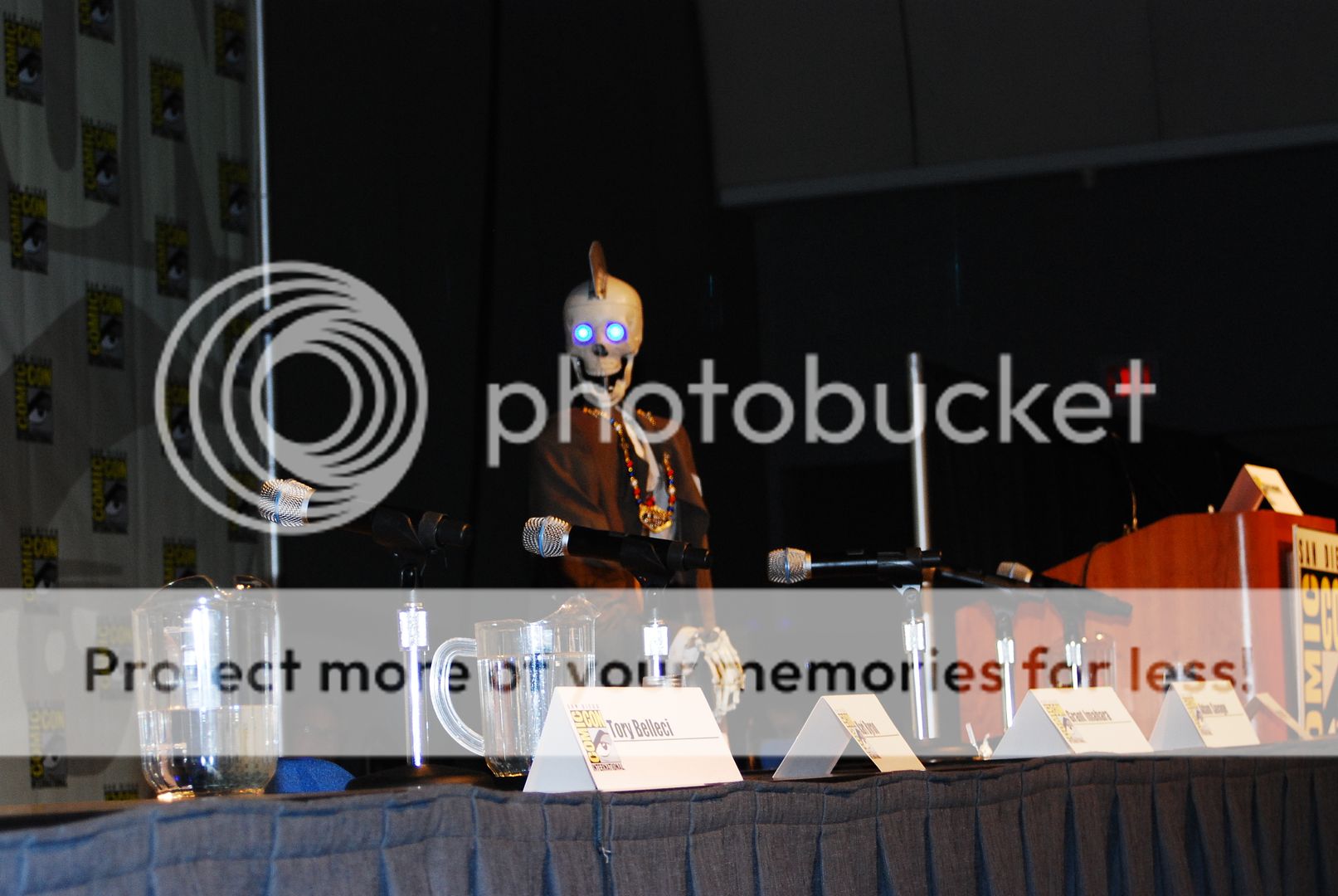
Finally, to ear-deafening applause, Chris Hardwick of one of our favorite blogs The Nerdist (follow him on Twitter) introduced the MythBusters, who announced that they’ve signed up for 7 more years of glorious science. This is a very special Comic-Con for them. It’s the first time all five have come as a group, and it is gorgeous geek diva Kari Byron’s first Con.
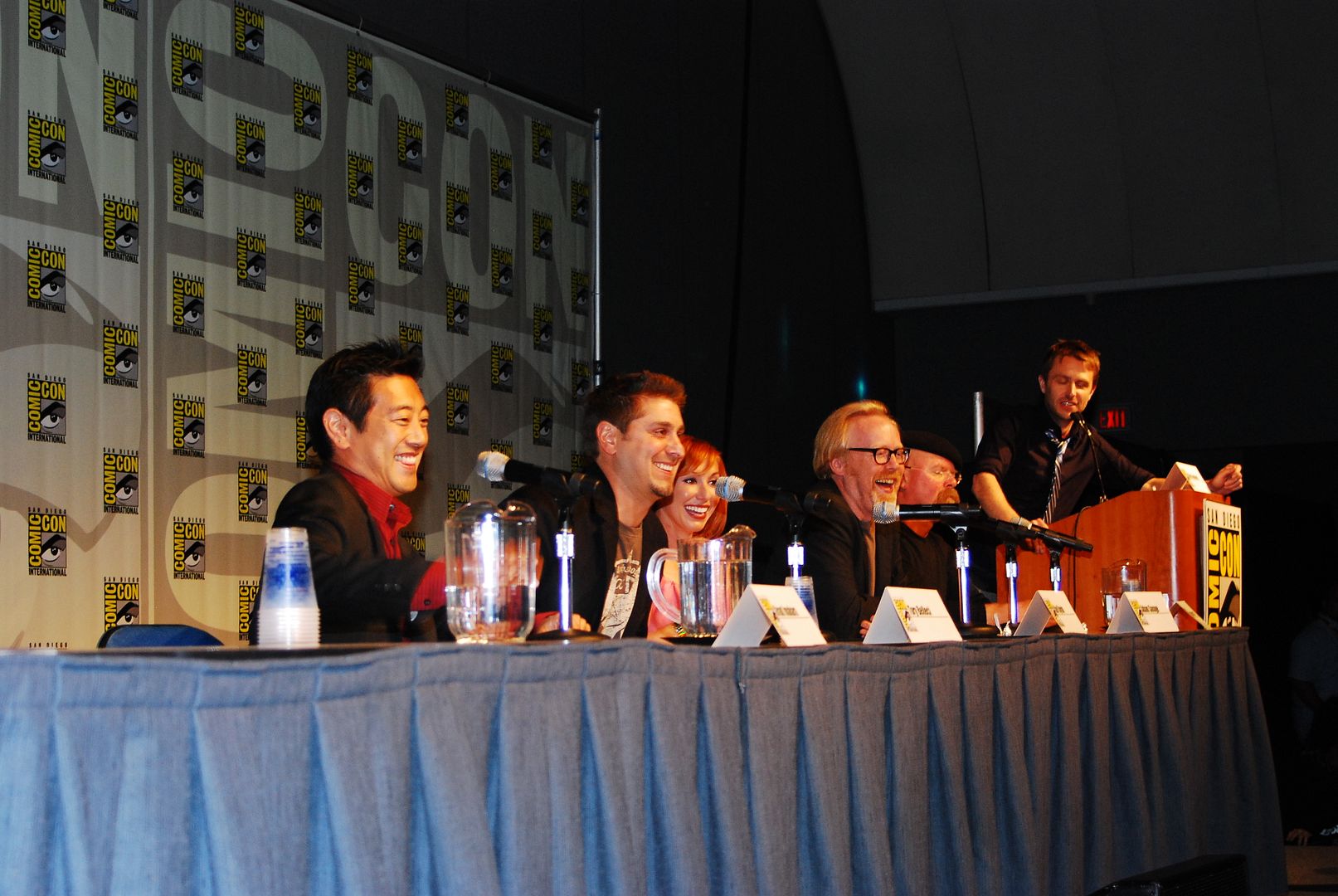
The first thing the MythBusters wanted their fans to know is just how very real they are. Although they feel like royalty at the Con, when they go back home to San Francisco, MythBusters is far from glamorous. Inside their workshop, which is a workshop and not a studio, they are doing all of the stunts and building themselves. They get dirty, they get bruised, and they do all of the experimenting. Says Adam Savage: “If you see it, we built it.” Although Savage has started getting more involved behind-the-scenes, he explained that the team is so knowledgeable about how to build things, that it’s faster and more efficient for them to do the building than to leave it to someone else. Tory Bellici mused that it would be nice to have stunt doubles sometimes, to which Kari Byron quipped: “They’re not stunts when you fall off.” Did we mention that we love Kari? Jamie Hyneman, who initially signed up for MythBusters because of the allure of getting to try new things, is still having a hard time acknowledging being on TV. When asked what famous people he’d met because of MythBusters, he couldn’t recall one. “President Obama?” nudged Byron. “Oh. Yeah,” replied Hyneman hysterically. Not so for Grant Imahara, possibly the most famous robotics guy in the world. “Craig Ferguson called me the Keith Richards of robotics,” said Grant. “I’m not sure how to take that.”
The audience was treated to a highlight reel of the upcoming season, which promises to have the best, and most extreme, experiments yet. The team revealed some of the secrets. Adam Savage revealed that a scene of a Porsche flipping backwards violently was done to bust an old 1980s myth that classic sports cars are more aerodynamic going backwards than forwards. In an utterly bad-ass bit of reconstruction, the body of a Porsche chassis was cut off, flipped backwards on the car, then raced at 100 miles per hour. Any more questions, kids? A scene showing Kari puking violently (she joked that it was in her contract to have to throw up every year) was explained as an episode testing whether people really do get cold feet when they have to do something scary. For the team, scary meant picking, then eating, two of the most disgusting selections from a table of delicacies consisting of spiders, cockroaches, chicken feet and more. And where does the team get their constant supply of ideas? “Surfing the internet really works!” joked Grant Imahara.
As to whether the team is cognizant of how much they advance science and critical thinking, and actively try to build experiments around didactic aims, the answer is… NO! Jamie remarked that as a whole, the MythBusters are a remarkably curious group. They are curious about stuff, they try to figure it out, and do so in a methodical and logical way. But they never set out to do science. Which, honestly, in the opinion of this website, is why their science is so great.
At this point, the team shared fun and hilarious inside stories from their Comic-Con experience and tidbits from back home in San Francisco. Adam recalls being shocked at two geeks that came up to him at an autograph table with their baby, wearing a onesie that said “Proof that nerds have sex.” Despite his uncomfortable laughter, the duo then asked him to sign their baby! Another fan went up to Jamie and remarked: “I’ve been watching your shows since I was a little girl and now I’m a PhD!” We’re pretty sure Jamie was kidding, but Adam still poked fun back at him. “You’re old!”
Just in time for next week’s Discovery Channel Shark Week, Adam recalled a fan coming up to him a few months back with what the fan was convinced was a brilliant suggestion: “Dude, you know what you should totally do? You should totally prove that, like, punching sharks will make them go away! Seriously, dude, it would be awesome! You’d just punch them.” A brief pause from Adam. “8 months later, there we were, knee deep in sharks, punching them in the face…”
Kari revealed that she filmed the show up to her 10th month of pregnancy. She pointed out that it’s a myth that pregnancy only lasts 9 months. (BUSTED!) She was worried that her baby would never come out. Replied Grant: “With all those explosions and gunshots outside, I wouldn’t come out either!”
Finally, to a fan that asked whether the team is ever scared of an experiment as too dangerous, Jamie reminded him that danger is a relative term. Nothing the MythBusters do is any less dangerous than driving down a freeway at 70 miles an hour. The trick is to good engineering and survive by doing a good job.
The new season of MythBusters premieres in the fall. Find coverage of their Comic-Con panel and clips from the new season on the MythBusters website.

We got to spend even more time hanging out with the MythBusters (and Geoff) backstage in the press area to get even more scoop about the show. We all wondered about the research process that the team undergoes. First and foremost, Adam proclaimed that they “don’t ever get things tested because they’re too dangerous.” There’s nothing the team is afraid of, and no length of time is too long to wait for a payoff. The research can take anywhere from 2 weeks to 2 years. The team searched 19 months for a lead layer thin enough to do an experiment properly. By contrast, the poppy seed drug testing experiment took two hours. They ate poppy seed muffins at 9 AM, and tested positive for heroin at 11 AM (well into the next day).
When asked about their terrific rapport, the team reiterated that they very much enjoy each other’s company and socialize quite well. All of the process, from picking to carrying out experiments, is totally collaborative. Secondly, the team shares a bond because they know each other quite well. “It’s not like we’re a science show boy band,” joked Adam. Most of them have known each other and worked together well before MythBusters began. Unlike other shows, MythBusters goes on for most of the year (46-47 weeks) because the building portions of the segments are so time-consuming. The most important thing to Jamie is a strong sense of respect that trickles down all the way to the show’s loyal crew of 23 people.
For the future of the show, Jamie revealed an interest in looking at the dichotomy of destructive things that do good work as well, steam being high on his list. The team never gets inspiration from movie trailers or clips if there’s no story there and they’re not worthy of a myth.
Adam revealed the interesting fact that somebody actually bought the Corvette which had been fouled by a decomposing pig to prove that a decomposing body can destroy the inside of the car. Adam now associates the smell of cleaner with that episode, which makes him sick to this day. Was that the team’s least favorite experiment, wondered ScriptPhD.com? Grant picked the ear wax candle experiment, jokingly calling it the “seasickness experiment.” Tory picked the chili pepper cure experiment. (“Burns on the way in, burns on the way out!”), while Kari picked the water torture episode. The most destructive experiment to this day, much to the chagrin of OSHA and safety regulation organizations of San Francisco, was the Civil War rocket, tested with a wax core. The team thought they had a proper bunker in the shop, but unfortunately ended up setting fire to their ceiling!
On any potential Discovery Channel crossover shows, Adam revealed that he’d like to go out into the wild with Bear Grylls (and so would I!) while Kari revealed that she would not like to do a dirty job.
And for the highlight of my personal day…

Last, but not least, is our official Day 3 Costume of the Day. We chose this warrior for a simple reason. He braved the chilly convention center without a shirt, yet with a completely covered head. Now if that isn’t upside-down thinking, we don’t know what is!
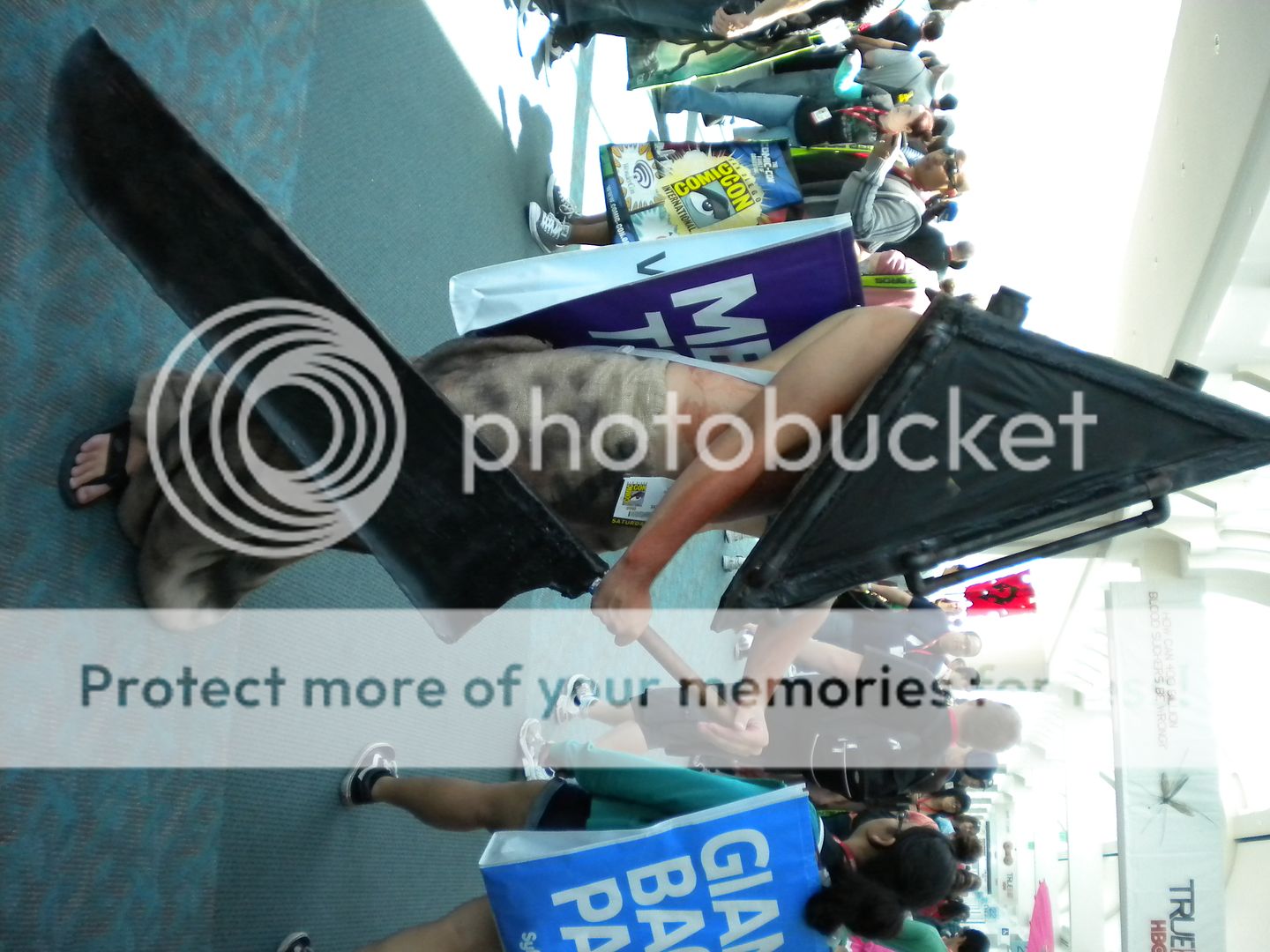
Incidentally, you can find much more photographic coverage of Comic-Con on our Facebook fan page. Become a fan, because this week, we will be announcing Comic-Con swag giveaways that only Facebook fans are eligible for.
~*ScriptPhD*~
*****************
ScriptPhD.com covers science and technology in entertainment, media and advertising. Hire our consulting company for creative content development.
Subscribe to free email notifications of new posts on our home page.
]]>
Day 2 of Comic-Con is over and now, the Convention is really underway! Today’s ScriptPhD.com coverage has a heavy focus on television, and sci-fi television to be specific. Really, is there any other kind? We spent time in the press room with the stars and producers of SyFy Channel hits Caprica and Stargate Universe, our favorite geeky physics show Big Bang Theory and the exciting (first-time ever!) Comic-Con Discovery Channel unveiling of their new scripted series Reign of the Dinosaurs. As always we try to pay hommage to the roots of Comic-Con with coverage of the design tricks behind comics and graphic novels. Additionally, we provide pictorial documentation of the costumes and happenings of the Con, and our Day 2 Costume of the Day. Complete coverage under the “continue reading” cut.
From the Press Room: Stargate Universe
We were delighted to start our day with the cast of one of our favorite sci-fi shows on the air, Stargate Universe, to get a little peek into the cast’s geeky sides and what they think of their characters and show.
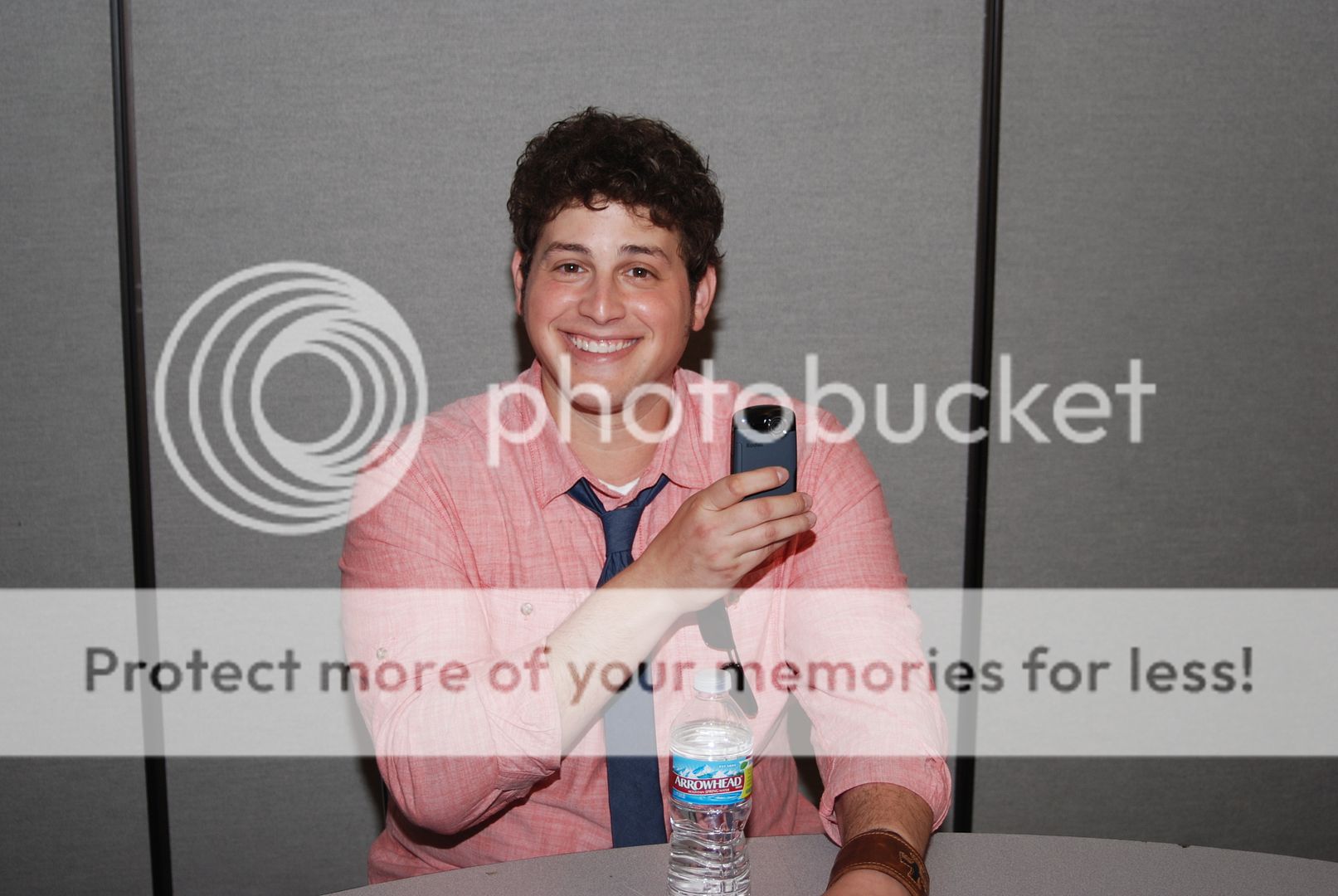
For star David Blue, playing the ship’s resident math geek Eli Wallace, this year is a completely different experience. Last year, there was so much uncertainty about the show’s acceptance and success, while this year, the cast walks into Comic-Con confident of where they are headed. He spoke of liking the idea of Eli as a hero, the show’s surrogate for the audience. Though he admits to being a geek, he was very hesitant to play the role when he heard about it, because of his previous computer nerd role on Moonlight for fear of typecasting. But Eli is not a stereotypical nerd, and experiences a lot more emotional and character growth over the course of Season 2. “I am proud to be a geek/nerd,” Blue says. “Everything from computer programming to comic books to video games.”
We were so thrilled to hear that David was a certified Grade A USDA organic geek, that we got him to proclaim so on camera for you guys:
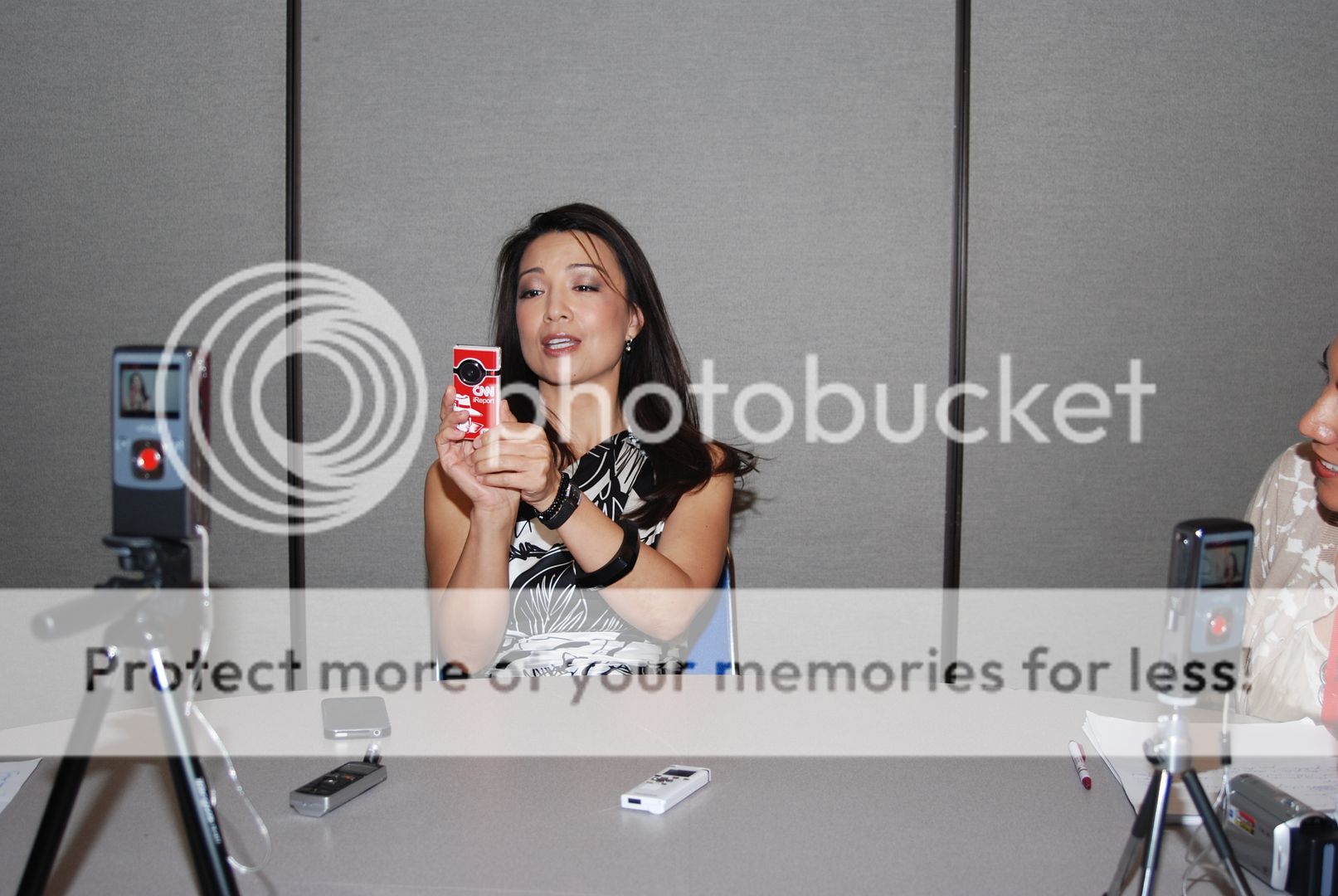
Ming-Na, whose character Camile Wray is far more controversial and decisive on the show, was asked right off the bat what she’d do differently in real life as opposed to her character. “Well, I wouldn’t be a lesbian,” the married actress quipped. Turning more serious, she said that she wouldn’t be as level-headed and calm as her character, who is often asked to make difficult, morally ambiguous decisions based on emotional issues. The fan’s response to Camile is largely a love-hate relationship. She’s gotten great response from the gay community, something that Na appreciates, but Camile’s escape from cliches or stereotypes is something that has resonated. The morally wrenching decisions are a staple of the show (and sci-fi television in general), and will only continue into Season 2. “You may not like her decisions,” says Na, “But I like her.”
From the Press Room: Caprica
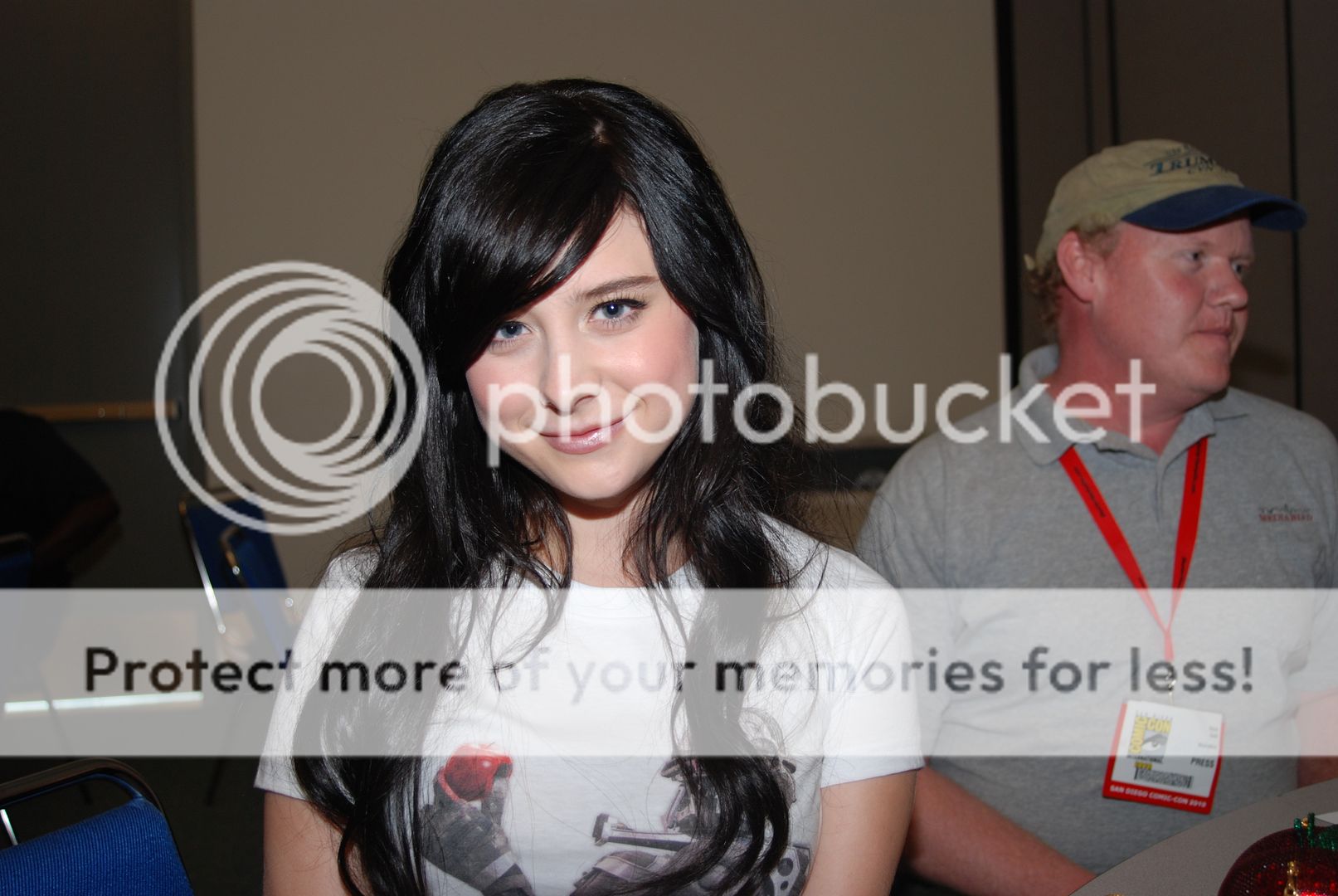
One of the most pivotal roles in the history of sci-fi television (the first Cylon) went to a girl that didn’t even really know the significance of the part. “I didn’t know what Battlestar was before I got the role,” admits Torresani, who was not a real sci-fi geek growing up. “I actually turned it down because I didn’t want to do [Caprica]. I wanted to do [Gossip Girl-type fluff]. It’s exciting now to [realize how important the role is], but it wasn’t nerve-wracking at the beginning. When I read the pilot, she was a spoiled brat, and then she gets in a robot. We didn’t know that I was going to be a Cylon. We just thought they’d use my voice and the robot’s body.” Filming the scenes as the Cylon, Torresani revealed, involves acting next to a giant green 7′ tall stick that everyone communicates with as the Cylon. She finds that the hardest part for her as an actress are scenes as the Cylon where she can’t communicate vocally, such as being lit on fire and not being able to utter a single word. “It’s really challenging. That’s something I never thought I’d have to do.”
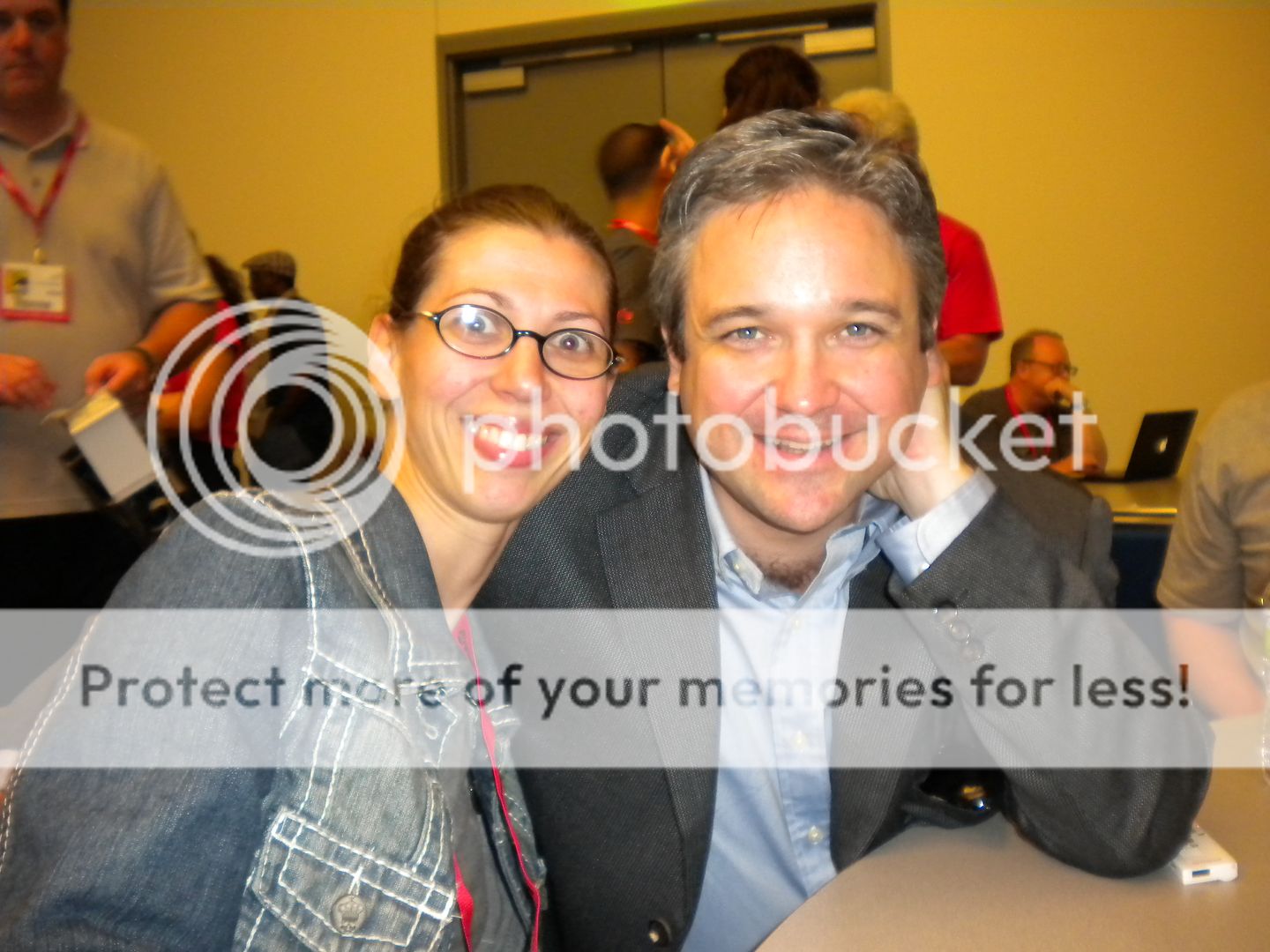
We started our time with executive producer David Eick with a humdinger—the question we know fans would want to ask. What has been the producers’ reaction to mixed reviews and fan division of the show, most notably from the Battlestar Galactica fanbase? “We knew to expect a much greater mix [of opinions] because we knew going in that we were not going to craft it or market it as a spin-off of Battlestar,” replied Eick. Rather than containing cheeky references to BSG or inside jokes only the audience knows, Caprica is very much its own beast. He hopes fervently that as the show finds itself and its own focus, that the audience, too, would find its own way in the show. He reminded us that the early days of Battlestar were equally contentious in terms of critical and fan opinions. “The very first Comic-Con we came to for Battlestar was like George W. Bush showing up at an ACLU rally.”
In many ways, he feels more challenged by Caprica, which lacks the ticking time-clock feel of BSG. It’s a more sophisticated style of storytelling, which is based in defining the characters and the world around then, Rome before the fall. The mythology of that world is deepened as the show progresses, and how it’s harnessed by Zoey to express herself. Eick spoke of how much more graceful and elegant Caprica is visually and content-wise, with Blade Runner being a huge influence on the producers and writers. By contrast, BSG had much more of a Black Hawk Down, action feel to it.
By the way, Ron and David have a longstanding tradition of taking a drink of tequila together before either a major show launch or major seminar/Convention. In fact, David brought the bottle and we all had a little fun. Kidding. But seriously, folks, next time you think the storylines on Caprica are getting a liiiiiiiittle wacky, just remember this picture:
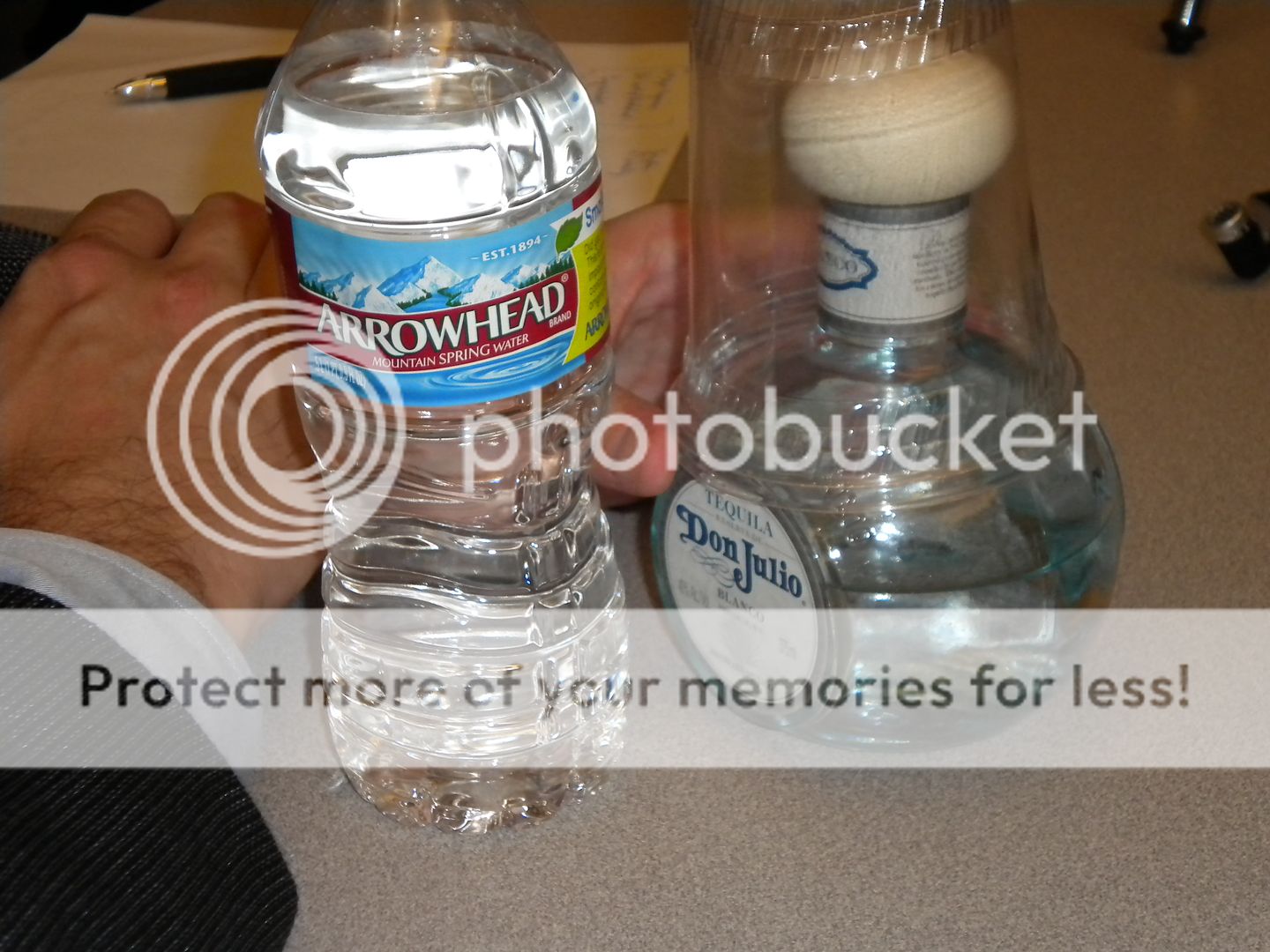
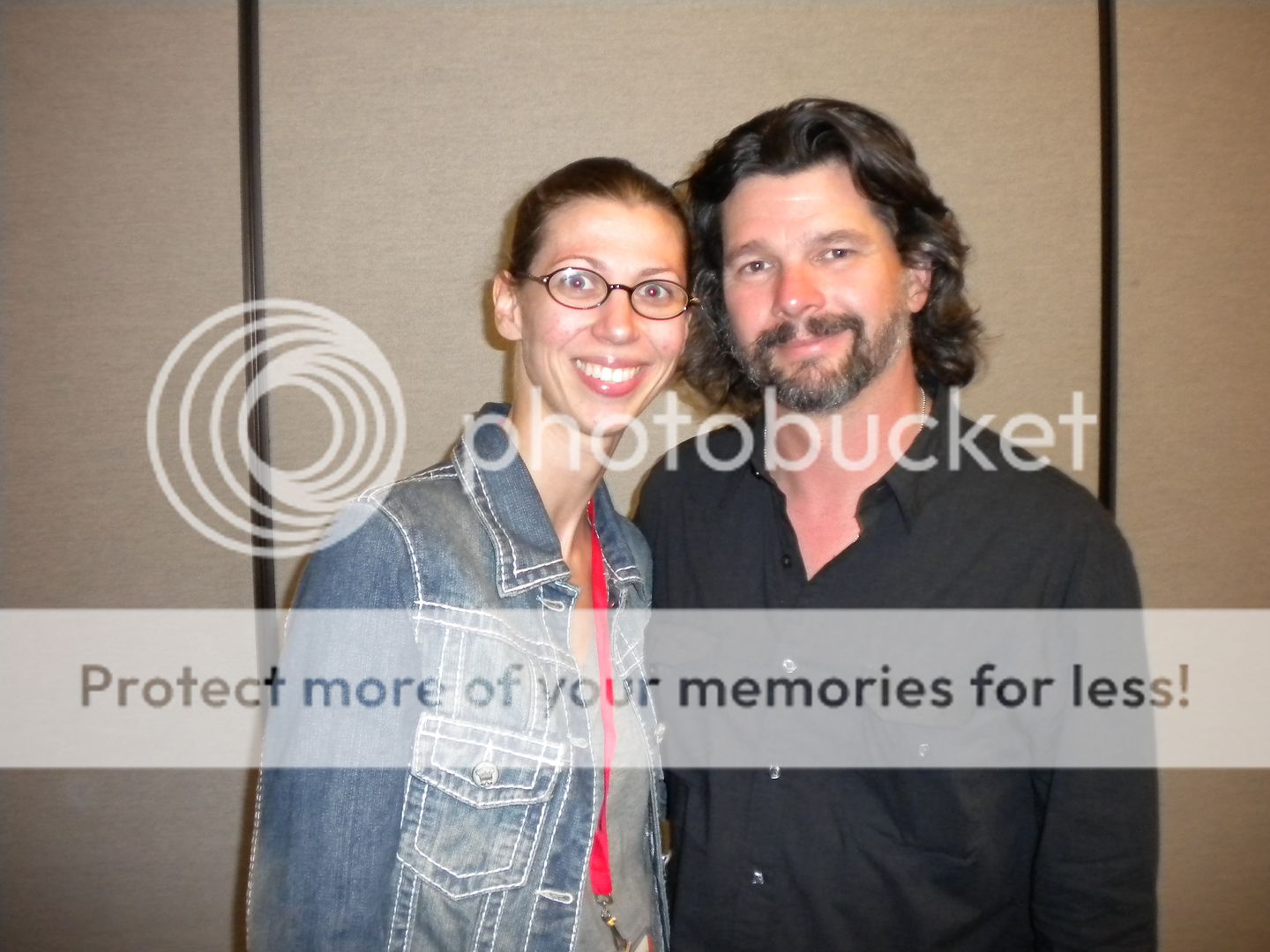
Ronald D. Moore, who made a rare media appearance at Comic-Con this year, largely echoed Eick’s comments. Caprica, he maintained is a serial, and (purposefully) as different from Battlestar Galactica as possible. In an even rarer move, Moore openly self-criticized himself for some of the early hiccups of the show. He admitted that it was hard to follow, that the story was indeed confusing, but that the show gained confidence as it went on. He predicted as strong of a build-up for Caprica as the eventual success of Battlestar Galactica. Another fun tidbit that Moore revealed was that the group marriage concept was tossed around for Battlestar Galactica, but just never found the story or the characters to make it happen.
We asked Ron about his thoughts on the current state of sci-fi and what he enjoys. “I’m probably not up to speed on a lot of other science fiction,” Moore said. “I almost avoid it now because I spend so much of my time in a science fiction world that I tend not to go there. It becomes almost like more work to watch other science fiction shows. In my brain, I’m inevitably thinking ‘How does that compare to us? And that’s their structure. How many characters do they have? I wonder what their CGI budget was.’ I haven’t watched a lot of other science fiction television for that reason.” Nevertheless, he maintains that it’s a thriving genre that will always be with us, despite the rise and fall of popularity. The one holy grail Moore hopes for is a broadcast network (read mainstream) sci-fi hit. He isn’t sure what the reason is that this popularity has remained so elusive, LOST notwithstanding. “Maybe it’s just us,” he mused. “Maybe it’s just us [the collective sci-fi geekdom], and there’s not this gigantic mass market for it in television in the way that there is a gigantic mass market for movies. Maybe that will never happen.”
We here at ScriptPhD.com hope otherwise.
From the Press Room: Big Bang Theory
If Ronald D. Moore is concerned about the viability of a basic network science fiction hit, at least he can take solace in Big Bang Theory, arguably the smartest, most successful, streamlined show about science and scientists in the history of television. We had such a fun time hanging out with the actors last year, that this year, with access to the full production team, we decided to get as much scoop from the show as possible.
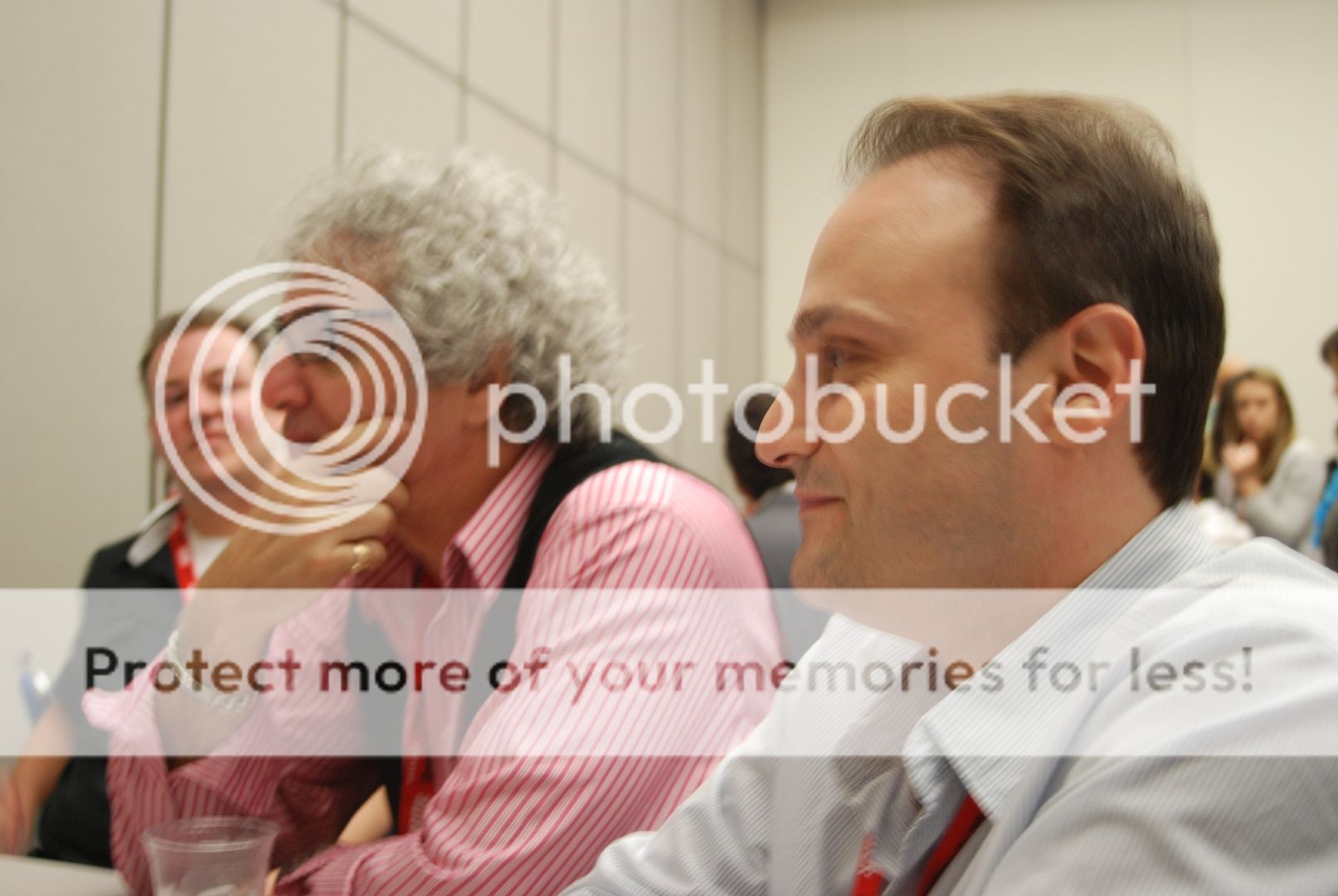

One thing fans would be surprised to learn, and the first question we asked right off the bat, is just how geeky the team behind Big Bang Theory is. Producer/writer Lee Aaronson, a self-certified comics and graphic novel geek, used to own his own comic book store. This is where a lot of the inspiration for Sheldon (and the rest of the team’s) love of geek culture comes from. They also have a close relationship to UCLA physics professor and the show’s science advisor David Salzberg. Often, they will write a line like “Hey guys, I was just working on [insert science here]” and let him fill in the blanks. We were wondering about that, too!
Geeky enough? Not even close. Showrunner and co-creator Bill Prady is a former computer programmer. He’s far more excited about Apple founder Steve Wozniak guest starring on the show than any fame or fortune that has incurred because of it. He and
co-creator Chuck Lorre maintained that the geek culture was their most important singular focus in writing the show. As one might glean from walking the halls of Comic-Con, they maintained that all geeks/nerds/scientists are not the same. There is a lot of heterogeneity amongst them, and differing, personal passions—be they Star Trek or the mathematical concepts behind string theory. And where do they get all their geeky throwaway lines? “Oh, those are all available on the internet!” And THAT is why we love Big Bang Theory.
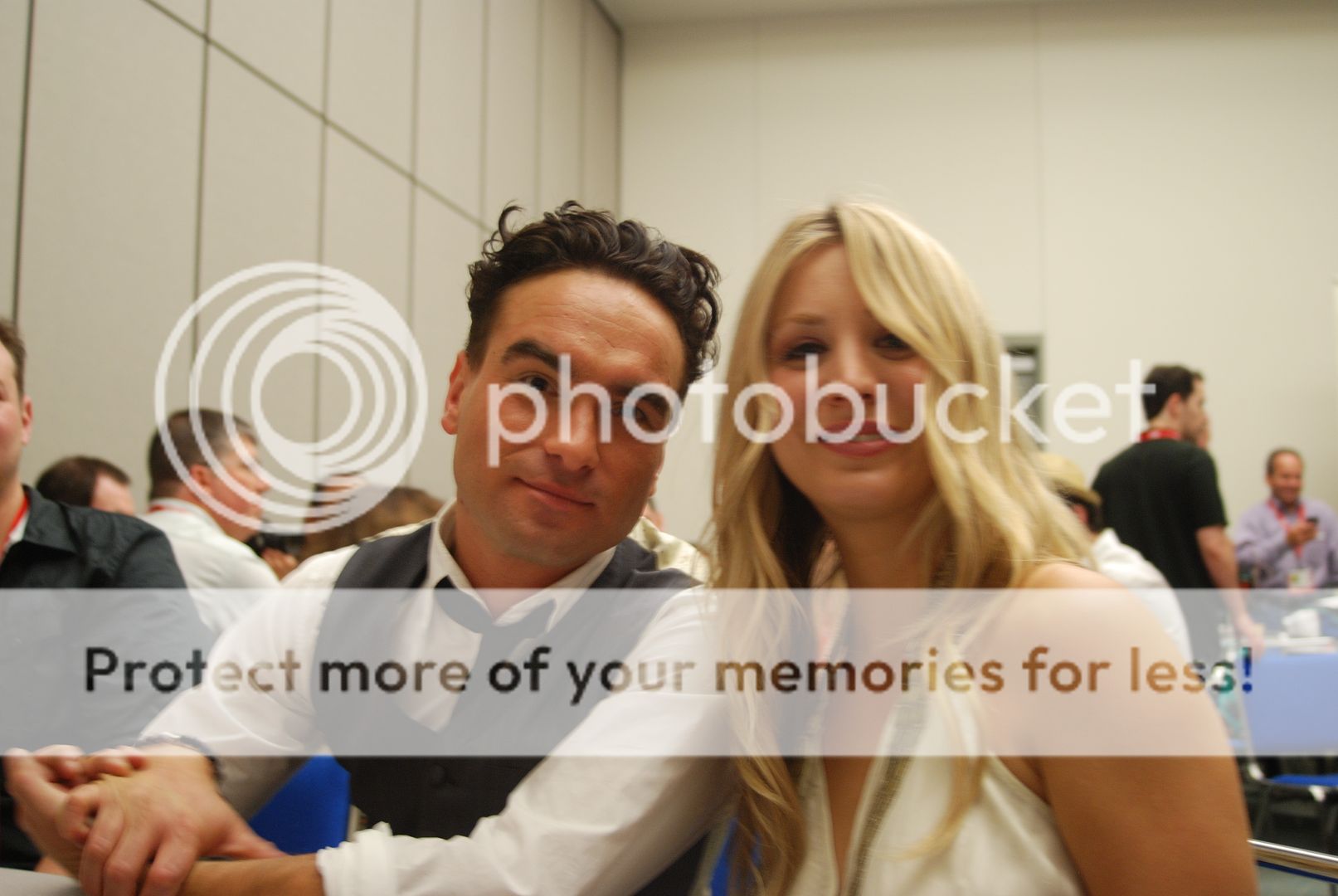
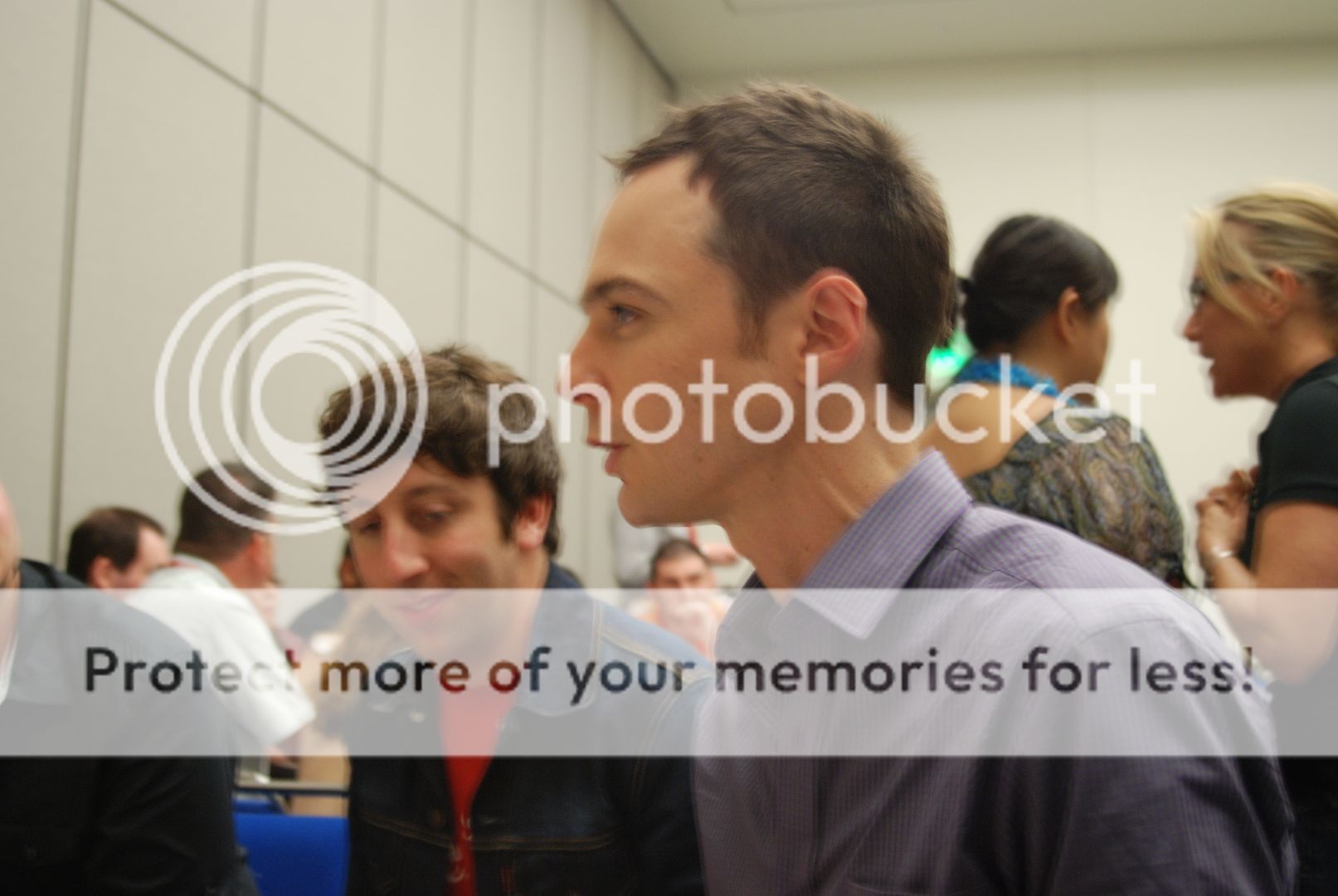
The actors themselves get right in the thick of the fun. Kaley Cuoco, playing perhaps the non-geekiest of the bunch in Penny, has nevertheless embraced geekdom. Her latest love? Her iPad! She and Johnny Galecki would both like to see a romance blossom between Penny and Sheldon (“Peldon,” joked Cuoco), but acknowledge that the road from platonic friendship to romantic involvement is filled with bumps and individual growth. Jim Parsons, who I shamelessly adore, started his time with us by telling me to shove it. He was, of course, talking about my tape recorder, but when I joked that I couldn’t believe Sheldon told me to shove it, his reply was: “And he’d tell you to shove it again and again!” Before telling Simon Helberg to bite him. Nice to know he stays in character so well!
We couldn’t leave a Big Bang Theory press room without getting our favorite superior elitist nerd to do something only for ScriptPhD.com fans. So here you have it, kids. From Jim Parsons, to you… a personal “Bazinga!”
Comics Design

One of THE most fascinating panels that we attended at Comic-Con so far was on the design secrets behind some of your favorite comics and book covers. A panel of some of the world’s leading designers revealed their methodologies (and sometimes failures) in the design process behind their hit pieces. An unparalleled purview into the mind of the designer, and the visual appeal that so often subliminally contributes to the success of a graphic novel, comic, or even regular book. We do, as it turns out, judge books by their covers.
We will be revealing each designer’s comments on their thought and art process, but are waiting for images from the panel to be emailed to us. So consider this a placeholder until we can finish this writeup and include it in Saturday or Sunday’s coverage. Stay tuned . . .
Graphic Novels: The Personal Touch
(From our correspondent Bryy Miller)
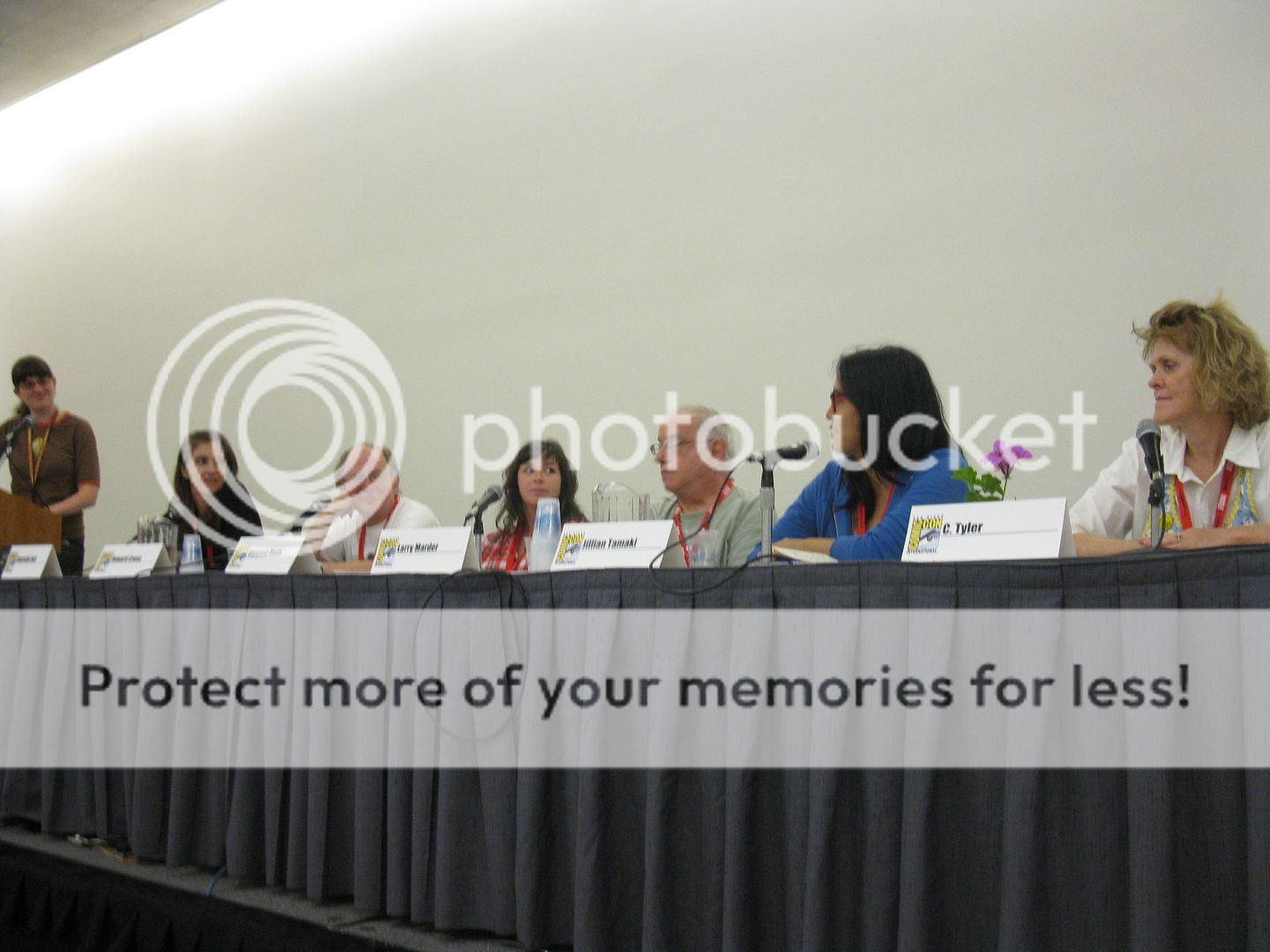
Some panels have mysterious names, some not so much. This one belongs in the latter category. There was no hidden meaning behind the phrase “personal touch.” This was all about the writers (Gabrielle Bell of Cecil & Jordan in New York, Howard Cruse of Stuck Rubber Baby, Vanessa Davis of Make Me A Woman, Larry Marder of Beanworld, Jilliam Tamaki of Skim, C. Tyler of You’ll Never Know, and moderator Shaenon Garrity of Skin Horse). More importantly and interestingly, it was about who they were. Some didn’t know who they were, others did, but they all knew one thing: that something inside of them needed to write.
Tamaki started off the discussion by stating perhaps the simplest answer of why she writes what she does, “I think that’s the only kind of book I wanna make.” Davis continued by adding that “anytime… it’s going to have a personal touch. Comics can soak up the people’s idiosyncrasies and sensibilities.” Marder, perhaps the odd man in the group, stated that even though his autobiography is a FANTASY, it still is an autobiography in the sense that it tells stories about his own feelings. Before anyone else could chime in, C. Tyler (arguably the oldest member of the panel) shot to life with an amazing amount of energy and playfulness. “I’ve taken autobiographies for granted.” she started “I know we’re at Comic-Con, but I hate superhero comics. When I read the first autobiographical comic, I was floored… it was disturbing and in a comic.” She went on to describe how she is fascinated with the idea of putting yourself out there, grabbing pieces of scraps from the table and showing us as if they were her life story – or even her creative process – in visual form. She would get extremely animated, and it really helped to humanize the element of the mysterious writer’s block and constant internal struggle to find how to portray your story. She ended her opening remarks with this, “the personal touch for me is I do it all by hand.”
Bell was the most reluctant to speak, but also, besides Tyler, the most visual. Not in the sense that she was very gesticulative or alive, but that she obviously was thinking very hard but having trouble in how to phrase her thoughts. “I try to cut my personal touch out,” she started, displaying the classic writer’s twitch of not looking directly at her audience “[I try to] make it universal. Professional.”
This instigated a very visceral response from Tyler, who on the spot tried to get into an earnest conversation with her fellow comic artist about what it means to be professional. Sadly, it didn’t last that long as Bell migrated back into thought. Cruse then brought up the point that, if your content is good, then mistakes in your craft are easily overlooked by a reader. The discussion (because calling it a panel at the end would just feel weird) had reached its time limit. Cruse gave some parting advice to young writers, “It will literally paralyze you to think of how many people have an idea similar to yours.” Marder stated that you have to fail in public. Garrity reminded everyone to heed that advice, as “Carol, Larry, and Howard have been in the comics since the seventies.”
Tyler let out a self-taunting gag.
Reign of the Dinosaurs

the Dinosaurs creative team (from left to right): Pete Von Sholly, Mishi McCaig,Tom DeRosier, David Krentz, Ricardo Delgado and Iain McCaig. (Executive producer Erik Nelson speaks on the jumbotron.)
In November of 2008, the hoi polloi at Discovery Channel approached producer Erik Nelson (Grizzly Man) with a simple request: “the ultimate kick-ass dinosaur show.” They poured enormous resources, creative and fiduciary, to create a television series that will truly break ground, both for Discovery Channel and its own medium. Scripted, yet unnarrated, scientifically stunning, yet bereft of the omniscient “talking head” paleontologist, Reign of the Dinosaurs is the ultimate exercise in “show don’t tell.” Premiering in the Spring of 2011, Reign will consist of 36 self-contained episodes erected from the art up. The stories will be chronological, detailing the rise, reign, and ultimate extinction (with a twist!) of the dinosaur species. But unlike the plethora of educational shows that cover the same topic, these will be rooted in storytelling, in treating the dinosaurs not as dinosaurs, but characters with whom we share an emotional connection. Trust me, having seen the first few world-premiere clips, you will care for these creatures, and the show will both exhilarate you and break your heart.
The true key to the success of Reign of the Dinosaurs was a dedication to amassing cream of the crop talent, formerly of Disney and Pixar, which allowed them to channel superlative animation and design talents towards an ambitious format. Along with Nelson, the team (and Comic-Con panel) consisted of renowned artists Ricardo Delgado (Dark Horse’s Age of Reptiles), Tom DeRosier (Lilo and Stitch, Mulan), self-proclaimed dinosaur nerd David Krentz (Disney’s Dinosaur, John Carter of Mars), Iain McCaig (Star Wars 1, 2, and 3), Mishi McCaig (Iron Man), Pete Von Sholly (The Mask, Darkman). Along with showing the audience their two (so-far) completed “cold open” teasers that will open episodes of the show, several of the animators simulated storyboard pitches (see picture below), just like the ones they would exchange in a writers’ room for several forthcoming episodes.
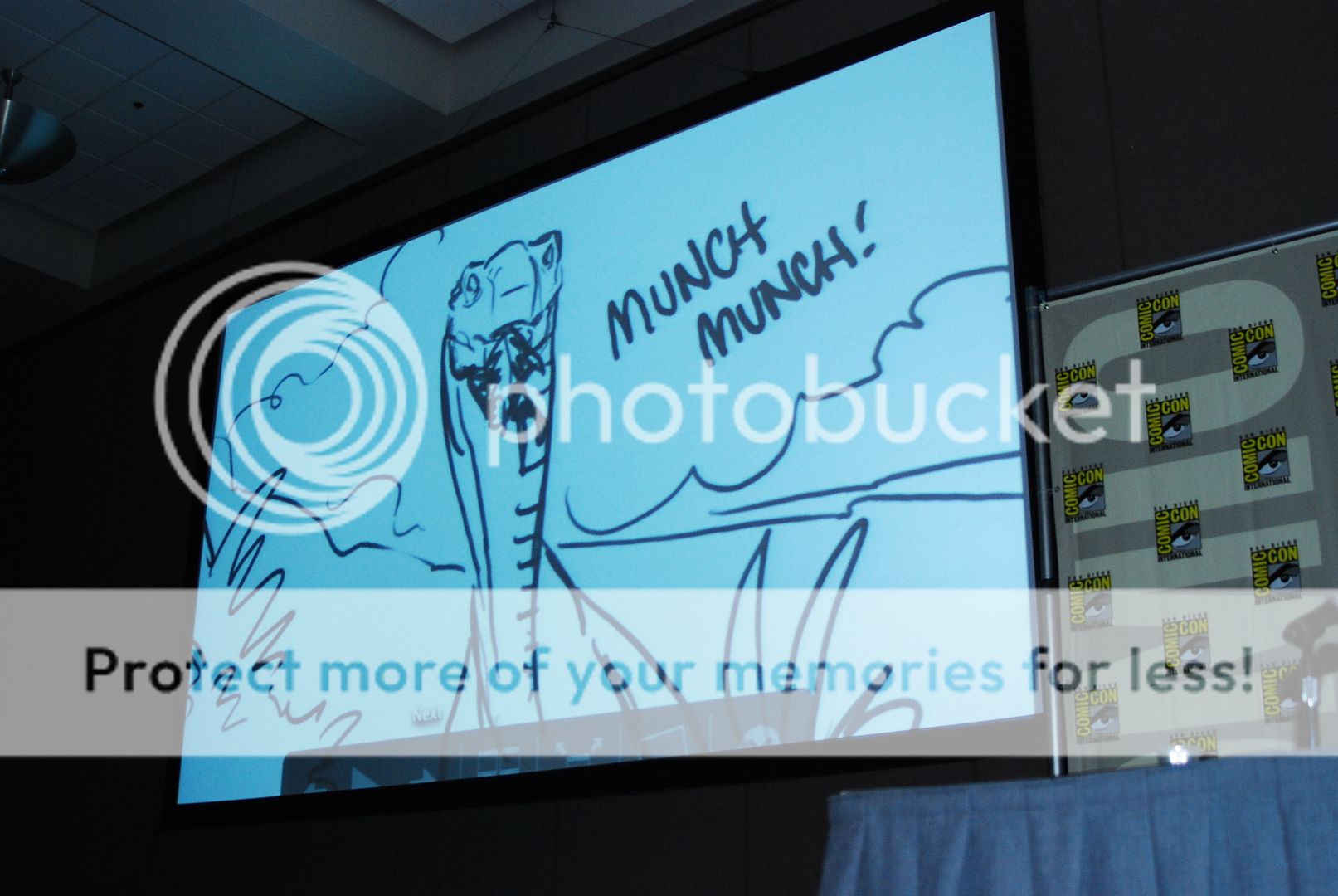
Several things impressed me upon the early viewing of Reign of the Dinosaurs, aside from the stunning art direction and well thought-out design. First of all, this show is really cheeky and funny. When the writers say that they’ll give the creatures personalities, they mean it, and it’s all done through expository action rather than showy narration. An early cold open has a dinosaur, trying to soothe her babies to sleep in the wee hours of the dawn, annoyed at the incessant chirping of a smaller dinosaur deep in the forest. Finally, she marches over and does what a dinosaur would do: bites the head off of her more annoying, diminutive co-habiting pest. Literally. Secondly, the stories pack an emotional wallop. A cinema-quality sequence shown at the end, taking place post-impact of the asteroid that ultimately killed off the dinosaurs, has the post-apocalyptic feel of Cormack McCarthy’s The Road (which the illustrator said influenced him) and visual appeal of Blade Runner. The ending, a hopeful coda on the extinction of the dinosaurs as an evolutionary stepping stone for our modern birds, had me sobbing. And then giving the panel a standing ovation.
Spring of 2011 is far away in television terms, but close enough for me to say this. Be excited, folks. Be very, very excited.
From the Press Room: Reign of the Dinosaurs

Not only did we get treated to a front-row preview of Reign of the Dinosaurs, ScriptPhD.com was extraordinarily fortunate to join the Discovery creative team for an intimate roundtable discussion panel after their panel. We were able to get enormous insight into the team’s collaborative process, storytelling aims, and dedication to balancing scientific accuracy with emotional connection, all while reinventing an entire medium. Ambitious? Just slightly.
One of the first things that impressed me upon talking to the Reign of the Dinosaurs team after their panel was their sheer dedication to, almost obsession with, “getting the science right.” Mishi McCaig and Iain McCaig spoke at length about the team’s dedication to nearing the line between science and entertainment. Hugely important to the project was the involvement of renowned University of Maryland paleontologist Thomas Holz, Jr., who cross-checks and gets pitched all the storyboard ideas. The behavior depicted in the show is speculative, but based on facts. This includes the animal’s muscle movements, how they would hunt prey, how they would interact—all aided by the paleontology knowledge of illustrator Dave Krentz. Ultimately, the team wants interest in the show to launch a more widespread educational initiative, which will include a Discovery multi-media website, and other supplementary materials to the show itself. Even when stories delve into the outrageous or fun, they’re rooted in research. A clip depicting high dinosaurs hallucinating was rooted in the marula tree, whose hallucinogenic fruit animals will eat and get high off of.
Producer Erik Nelson and illustrators Tom DeRosier and Ricardo Delgado spoke at length about the collaborative process of making the show, which they described like a TV writing room, only with animators. “Everyone’s sensibilities came together in a ‘hive mind’,” said Nelson. This visionary approach was important to the team, which is essentially trying to reinvent a TV genre. The last non-narrated, no-dialogue animated show was Walt Disney’s “Silly Symphonies” back in 1938. Needless to say, we’ve come a long way since then. The team was amazed at how constructing the dinosaurs’ stories moved them, comparing their effort to “March of the Penguins,” another simple vehicle showcasing animals that was rooted in an emotional audience response. This empathy for the dinosaurs peaks with the show’s conclusion, in which the dinosaurs die out (spoiler alert!), but which is still painted in an upbeat, survivalist way, as most geologists and paleontologists agree that modern birds are the direct evolutionary ancestors of dinosaurs.
“We’re not trying to hook you as a dinosaur person,” concluded Delgado. “We’re trying to hook you as a human being.”
Two last fun tidbits from today. Last year, on Day 3 of Comic-Con, we got geeky in the press room with our friend Barry of The Ugly Couch Show. When we saw each other again this year, we thought we’d start an annual tradition. So here it is, ladies and gentlemen. Two very tired, cranky, overworked press corps members getting silly in the press room:

And last, but definitely not least, is a very worthy Day 2 Costume of the Day. These ladies hit it out of the park. Bonus points if you can tell us which comics they’re representing:
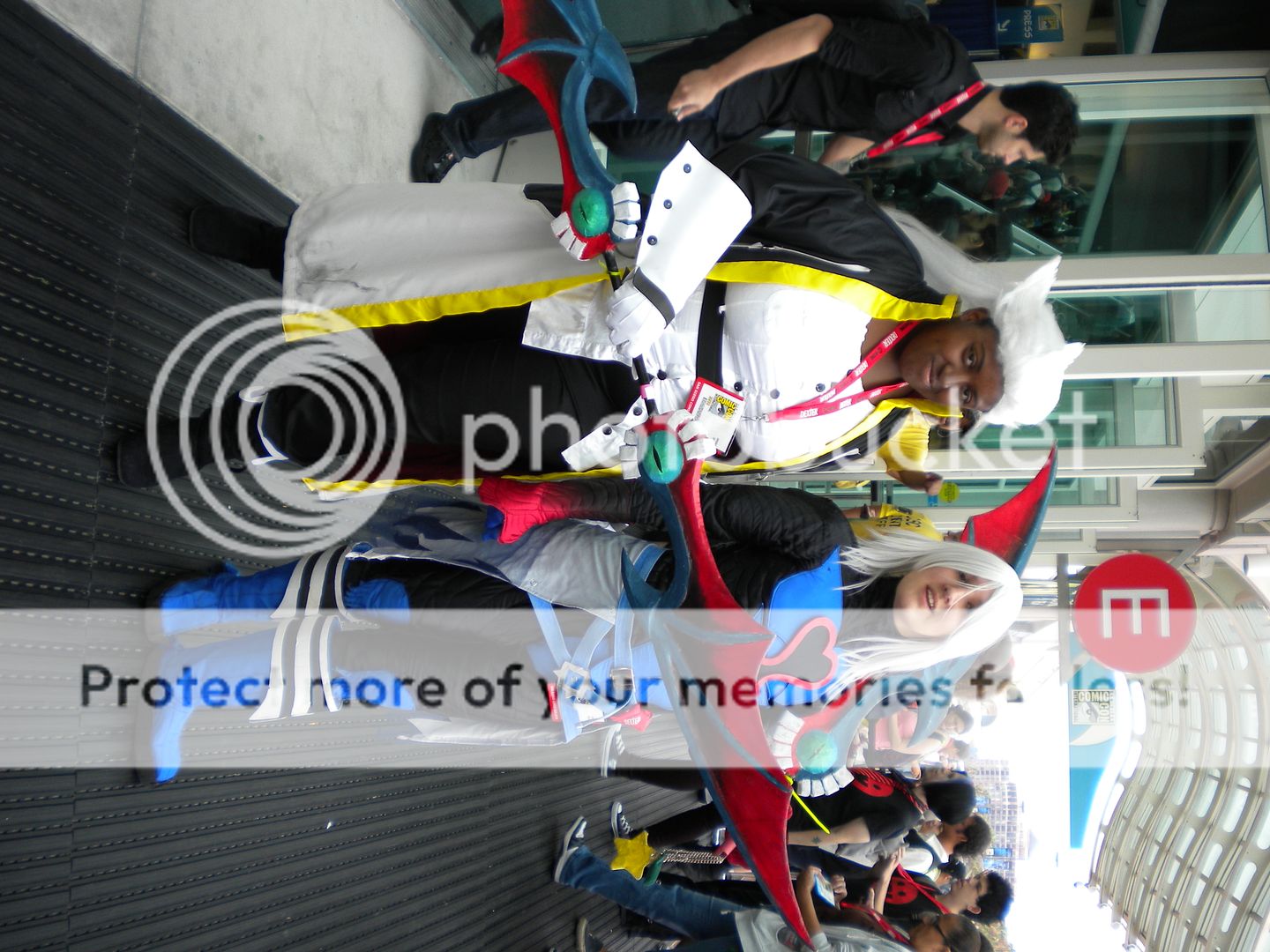
Come back tomorrow for more geeky sci-fi fun! And don’t forget to become a fan of our Facebook fan page for extra Comic-Con photos and a chance to win amazing surprise swag when we get back from San Diego.
~*ScriptPhD*~
*****************
ScriptPhD.com covers science and technology in entertainment, media and advertising. Hire our consulting company for creative content development.
Subscribe to free email notifications of new posts on our home page.
]]>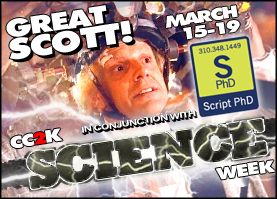
All right class, settle down, settle down. My name is Mr. Ross, but you may call me BR. Welcome to Pop-Culture Science 101. I know what many of you are thinking: “Science is boring; I just don’t get it.” I can understand those sentiments. But that’s only because of the ways you’ve been taught in the past. Today is going to be different. On this, the third day of the Science Week collaboration between ScriptPhD and CC2K, we decided to have a bit of silly fun and cover a couple of traditionally esoteric science topics from an angle I doubt any of you have considered before—pop culture icons. So get out your notebooks and pens, today’s lesson begins now! Please click “continue reading” for more.
Lesson 1: Genetics/Evolutionary Theory
It’s easy to get intimidated if you hear terms like Neodarwinism and Mendelian genetics. If I say deoxyribonucleic acid polymerase, well, I might as well be speaking Swahili, right? Heck, you might not even know who Charles Darwin was, or why his work is so important to biology. Doesn’t matter. Forget the technical jargon; don’t worry about the minutiae. The essentials of genetics and evolutionary theory can be learned simply by considering the X-Men. Yes, I mean the comic book superhero team.
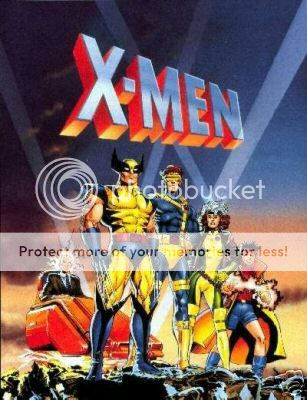
The X-Men are superheros not because they’re aliens or because they were exposed to some kind of radiation, but because they were born as such. They bear mutations in the so-called X gene (yes this is make-believe, but for the purpose of today’s lesson it will work just fine). A gene is nothing more than a unit of information in your DNA that instructs something. Eye color. Hair color. How tall you are. Basically everything that makes us unique (and that makes us human, as opposed to some other species) is because of our genes. In the case of the X-Men X gene, mutations herein can bestow superpowers, though, this isn’t always the case.
See, mutation is a random thing. Mutations in genes can be negative as well as positive, debilitating just as often as advantageous. The key here is to consider how a mutation affects an organism’s fitness to survive. Ah, did that ring some bells? Some of you comic book fans might be thinking of the X-Men’s arch-enemy Apocalypse and his fanatic devotion to the concept of the “survival of the fittest.” The man (or mutant, rather) is a strong proponent of Darwin and his theory on evolution by natural selection. I know that might sound complicated, but it’s really not. Let’s go back to the X-Men. Consider the following:.
Let’s compare Wolverine with some average mutant Joe Schmoe off the street. Wolverine’s X gene mutation grants him numerous super powers including enhanced strength, speed, senses, claws, and an extraordinary healing ability. Joe Schmoe (for the sake of argument) has a mutation in the X gene that has bestowed him with, let’s say a prehensile tail (i.e. a tail like that of a monkey). That’s it. He’s not super strong, he can’t climb trees particularly well, he’s just a guy with a tail.
Now for the selective pressure. Senator Kelly teams up with some other unsavory types in the government and creates the Sentinels, giant robots programmed to detect and eliminate mutants with extreme prejudice. I ask you, who will have the better chance to survive? Who is more fit? Joe Schmoe, or Wolverine? Obviously Wolverine. Chance has given him a mutation that makes him more likely to survive a selective pressure (the Sentinels) than our pal Joe, hence Wolverine is more likely to reproduce and pass on his mutation to his offspring. That, friends, is evolution.
Lesson 2: Acid-Base Chemistry
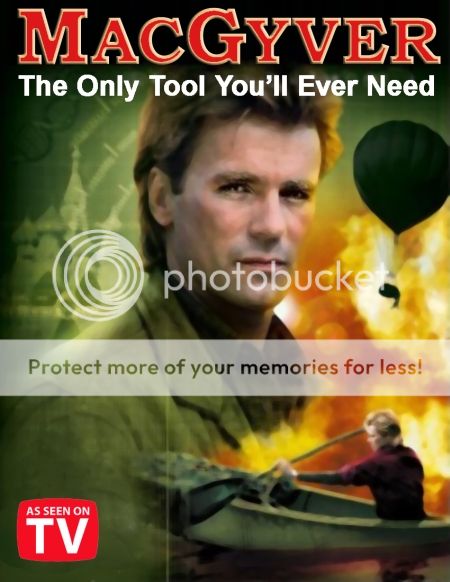
One of my favorite chemistry teachers growing up was a mullet-coiffed action escape artist by the name of MacGyver. His lessons were so memorable because they were practical applications of chemistry using common household items to resolve extraordinary situations. Granted, the majoritysome of his lessons exaggerated the bounds of what was truly possible (sometimes Mac was more about style than substance), but often his lessons were grounded firmly in reality.
Take, for example, the time he demonstrated how to make a fire extinguisher from simple items found in an ordinary kitchen, and gave a lesson on acid-base reactions in the process (episode 132, “Good Knight MacGyver”).
Let’s say for the sake of dramatic storytelling (this IS a science in entertainment site, after all!) that your parents are going out of town, and you’ve decided to have a few friends over (including Dylan, that totally cute guy in your English Lit. class you’re hoping will ask you to prom). You decide that in order to elevate your little party above run-of-the-mill get-togethers you’re going to make your very own mozzarella sticks and jalepeno poppers. You fill a pot with vegetable oil and turn the burner all the way to “hi”. You’re ready to do some serious frying.
But then you get distracted, and the oil heats to the point of ignition. Your attention is pulled away from your cell phone by smoke coming from the kitchen. You have a grease fire to deal with. If you burn your parents’ house down they’ll ground you until you’re 30. You have to act fast. You quickly turn off the stove burner, and you know that if you throw water on the fire it will just make it worse. You could put it out if you had a fire extinguisher, but your parents don’t keep one in the house. Then you remember MacGyver’s chemistry lesson.
Acting quickly, you open the fridge and pull out the half-full bottle of Diet Coke and the box of baking soda your mom put in there because the Arm & Hammer commercials assert it will help remove unwanted odors. Then you pull out the large bottle of white vinegar from under the sink that hardly ever gets used. You pour the Diet Coke out onto the floor and fill the 32-ounce Coke bottle with as much baking soda as you can get in there (you notice it’s almost 3/4 full). Now comes the tricky part.
You quickly pour vinegar into the bottle, cover the opening with your thumb, give it a quick shake, and point it at the fire. Bubbly liquid begins to shoot out of the mouth of the bottle. You sweep the bottle back and forth, noticing with relief that the bubbly liquid is putting out the fire. There’s some smoke damage and one heck of a mess to clean up (and that party is definitely canceled), but catastrophe has been averted!
As to why this works, let’s open up our Unofficial Macgyver How-To Handbooks to Chapter 3, page 70:
Fire extinguishers work by removing one of the critical ingredients for a fire: oxygen. When vinegar is combined with baking soda, the two react and produce carbon dioxide gas or CO2. This type of reaction is known in chemistry as an acid-base reaction, and the vinegar (the acid) and baking soda (the base) model is a high school chemistry classic:
NaHCO2 (baking soda/base) + CH3COOH (vinegar/acid) –> CO2 (gas) + H2O (water) + Na (Sodium) + CH3COO (a combination of hydrogen, carbon and oxygen that we like to call “magic dust”)
The CO2 gas produced by this reaction has a heavier molecular weight than does the surrounding air, which is comprised primarily of nitrogen and oxygen, so the CO2 sinks into the bottom of the room. As the reaction continues, more and more carbon dioxide gas is produced and slowly fills up the room, displacing the oxygen. When the level of carbon dioxide has risen to the level of the flame, the flame will go out from lack of available oxygen. As Mother always said: “If I’ve told you once, I’ve told you 1,000 times, any combustion-reaction (fire) requires a primary oxidant (oxygen) in order to work.” Yeah, she’s a special lady, our mom.
A video demonstration:
Class dismissed.
“A Pop-Culture Science Lesson” is an original article by CC2K games editor Big Ross.
Science Week 2010 is a collaboration between ScriptPhD.com and CC2K.
*****************
ScriptPhD.com covers science and technology in entertainment, media and advertising. Hire our consulting company for creative content development.
Follow us on Twitter and our Facebook fan page. Subscribe to free email notifications of new posts on our home page.
]]>Part of every great Hallow’s Eve, in addition to carving Jack ‘O Lanterns, fake blood and candy, involves a good old-fashioned horror film. To help our loyal fans prepare in advance, ScriptPhD.com enlisted the help of our good friend Bryy Miller, screenwriter and president of Lefty Films, to grab sneak peek screenings of two Halloween-themed releases, Dark Country and Trick ‘r Treat, at the inaugural Long Beach Comic Con, as well as two very rare, special comics panels. His reviews and coverage, below the cut.
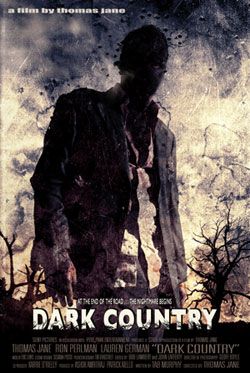
Review: Dark Country
It seems like there’s a secret race going on in Hollywood right now–the race to get the first good 3D horror film into society’s hands. Next year, we will be witness to Halloween in 3D, just like My Bloody Valentine before it. But Hollywood is forever searching for a film with that magical blend of scares, good story, and unobtrusive effects.
Dark Country is not that film. Described as “heavy noir” and Twilight Zone by the director/star, Thomas Jane, Dark Country seems to have a very odd definition of both of those things. If by “heavy noir”, you mean one or two ludicrously written monologues at the very beginning of the film (which foreshadow the ending but make absolutely no sense when everything is supposed to “tie together”), then yes, it is heavy noir. If by Twilight Zone, you mean completely random, then yes, it is the Twilight Zone. The film simply did not know what it wanted to be: noir, horror, sci-fi… no idea. It kept jumping from one idea to the next whenever it felt like it. With this style of leapfrog, you can forget about any sort of a coherent plot. I felt like it was making it all up as it went along.
As for the threadbare plot, it revolves around newlyweds Dick (Thomas Jane) and Gina (Laura German), two strangers that take a trip through the midnight Las Vegas desert, hoping to get back to civilization before the heat of the morning. Before they go, though, Dick has a run-in with a man in black, who warns him to stay on highway 95. Soon enough, the two get lost and are subject to a plethora of thinly connected and fully undeveloped anomalies. What’s worse is you can figure out both the ending and the twist – at least the coherent parts – when the first signs of supernatural spookiness begin. This is a very dumb movie trying to be a very smart one. I had absolutely no investment in Dick or Gina’s lives or their plight. Thomas Jane stumbles through the movie doing his best impression of a nerdy Marv from Sin City. In a piece involving two characters for the entire film (minus a few parts with a corpse and Ron Pearlman, who is by far excellent in his small role), we find out very little about either of them and get even less dialogue. Gina’s plot is left murky and vague, and the movie keeps shifting gears with her. Is she “in on it”? Is she a helpless bystander? Her plot hinges entirely on the climactic reveal, and when it happens, we are left with an even further confusion as to who exactly the character is in relation to everything. Because, let me tell you, it just does not work. The ending has no relationship to the beginning. None at all. Even the “heavy noir” monologues that act as portents do not add up.
It’s going straight to DVD. Good for it. I guess. I mean, there are going to be people out there that will gobble this up, and that scares me. In five years, the studio executives that think blood and gore sell will be right. We need better horror films, and we need better 3D horror films.
Dark County went on DVD October 6th, 2009.
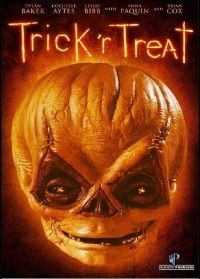
Review: Trick ‘r Treat
Halloween films are either all about slashers or Christmas nowadays, very rarely celebrating the holiday itself. In recent years, it’s even become “hip” to move away from the supernatural as your death-dealer. Rob Zombie even had the bright idea to put out BOTH of the Halloween remakes in August. They have Halloween in their titles, for Pete’s sake!
I am happy to report that Trick ‘r Treat, a movie that has been shelved for two years but has been getting critical reviews from screenings all over the country, is chock full of everything that we love about the holiday. It is filled to the brim with costumes, falling leaves, black, orange, and a boat-load of intricately-made Jack O’ Lanterns. Four stories make up this anthology film, all taking place and sometimes crossing over each other in a small Ohio town. It actually could be considered five stories, as the first story takes place even before the opening credits. The stories are thus: a high school principal who has a very odd way of connecting with his son, a crew of young women trying to find the perfect date for the ugly duckling of the group (who is complete with Little Red Riding Hood costume, as well as being Anna Paquin), an urban legend that proves a little too real for some very nasty children, and a cranky old man (Brian Cox) who gets a visit from what could be called the Ghost of Halloween Present. Besides the occasional crossover, the stories are connected by the themes of the holiday: always check your candy, never go out alone, don’t blow out a Jack O’ Lantern before the night is through, and give out candy to any and all young trick-or-treaters. Not following any of these rules is the equivalent of taking a knife to a gun fight in this film. Once you begin to think about the events taking place, you realize that this film is really about “them”, and less about “us”. I mean, why can’t the spooks enjoy the holiday – a holiday created for “them” – as much as we do? All they want to do is protect what is theirs.
My favorite story would have to be the urban legend vs. the unbelievably but intensely realistic trouble-making children. It was scary and edgy. Things happened in it that not only set up the end of the film, but revealed a whole lot about what was actually going on without saying anything. My least favorite is Anna Paquin’s Red Riding Hood tale, which saddened me, as it had my favorite scare as well as my favorite supernatural creature. I did enjoy how it used the now ordinary idea of twists and turns in a movie to scare you, it always keeps you guessing as to what is really going on. Then, when you think you know what the deal is, the rug is pulled out from under you. It scared you by pitting your preconceived notions against you. That was fun. It was interesting and smart. But the ending of the Red Riding Hood tale is rife with a clichéd song and an ending sequence that goes on way too long.
I highly recommend at least renting this film to see if it is for you. It’s a thrill ride with enough humor and scares to last you through this Samhain season. All Hallow’s Eve. Whatever you want to call it.
Trick ‘r Treat went on DVD October 6th, 2009.
COMICS TO SCREEN PANEL
ScriptPhD.com has covered (and will continue to cover) a number of films (including most recently Whiteout) that are direct adaptations from comic books or graphic novels. In fact, it seems that the near future will bring a panoply of such projects–Hollywood’s newest bandwagon. Helping to break down how comics are made into films was a fascinating panel consisting of Buddy Scalera (moderator and host of Long Beach Comic Con), Chris Leone and Laura Harkom (SyFy’s The Lost Room, Red 5’s We Kill Monsters), Jeph Loeb (Heroes, Lost, too many comics to count), and Mike Fasolo (Robot Chicken).
The first round of questions went to Laura Harkom and Chris Leone, a writing team currently working on a miniseries for Red 5 Comics called We Kill Monsters. They gained fame, however, with a ridiculously well-written miniseries for the erstwhile Sci-Fi Channel called The Lost Room.
BS: First I’m going to address Chris and Laura, how you two came together as a team, produced The Lost Room, and then we’re going to get into how you got into comics.
LH: Let’s see. Well, how we came together as a team, we went to school together. We went to college together, um, we didn’t really know each other all that well in college, and then we moved to Los Angeles around the same time, and had different careers: I was a studio executive, Chris worked in Visual Effects. But, you know, we kind of knew each other from writing, the writing program, and eventually realized, well, that’s what we should be doing, so we teamed up to start writing together.
CL: So we’ve written a bunch of scripts, but the only thing that’s been done has been The Lost Room, now, so most of what we’ve written has never been done.
BS: We’re going to talk a little bit about how you guys are stepping into comics.
CL: I’m kinda obsessed with comics so its, kinda, it’s not an alien format to me. The cool thing about a comic book is I can write it, and we hire our artist, but, kinda like The Lost Room – which took twenty million dollars – basically Laura and I funded it ourselves [WKM, not TLR] and we just wrote it, and it’s a comic book. See, see, check it out. It’s called We Kill Monsters… the title is pretty self explanatory. I come out of visual effects, I understand what it takes to build a CG monster, but you can just draw it, so y’know…
LH: Yeah. I mean, we thought “should this be a TV show?”, and then we thought, the way television budgets are, we would never get to execute the monsters the way that we wanted them. But whatever you can imagine, you can have drawn, for the same price as any other page.
CL: The insane thing about Hollywood is that the odds are of making it are even better if it’s a comic book. Why can’t it just be a script… for us, it’s fun to do a comic book and it’s cool. Odds are someone will come knocking on our door and say “hey, this should be a movie” and it’s “no shit”.
BS: Is Hollywood looking at comic books as an incubator? Is that your experience?
CL: I don’t know. I don’t know how they see it. It could be “it’s got pictures, it’s like a movie”, I think it’s something that – someone published it, therefore –
LH: It’s validated.
CL: – it’s validated. Well, someone published it, must be worth something.
LH: Yeah, someone took a chance on it and thought it was a good idea. So if it bombs as a movie, the idea can always come back to “well, it was successful as a comic book…”
BS: How was it transitioning from writing to the screen to writing to the page?
CL: Well, in some ways, I’ve read ten thousand comic books, so I understood it. In some ways, there were things that I didn’t get. Right? So, looking at a panel, you have two guys driving. I have the guy on the right, the guy driving, speaking first. Well, that doesn’t seem weird. But then you look at the panel, and he’s on the right, so the word balloons will cross. So the artist was like “no, you gotta have the guy on the left talk first” and I had to rewrite the whole page. It’s a funny little rule, but it’s obvious once you realize it.
BS: We were just talking about the differences and challenges of writing from the page to the screen. I was wondering if you could weigh in here.
JL: The really big difference is money. And, uh, I don’t mean in how much you get paid. In terms of how much responsibility you do have. When you do comics, you’re only really limited to your imagination. So if you want all of Rome to burn, you can write ‘all of Rome burns’. Your artist is going to kill you, but you can do it… you have to be realistic… or you can do ‘Luke gets in an X-Wing, and then double page splash, he blows up the Death Star’. Particularly in television you have real responsibility, and the other thing that is difficult to do, and once again, the transition goes the other way, in television it is real easy to write two people talking. It is the responsibility of the director to make that interesting… in comics, it’s incredibly boring. The biggest understanding is: on a page, what you’re able to convey, uh, versus film. The trick is to make it interesting.
It is then that the entire panel gives a shout out to Final Draft, the most widely used screenwriting program in the film industry.
BS: With Robot Chicken, it’s a little different, as opposed to working with live actors, it is animated figures.
MF: We write as though they are normal people, although we can’t have someone do a backflip… we write normally, and we hope our puppet department can do what we want our puppets to do. Usually, a page is a minute of screen time. [For Robot Chicken] one page is a minute and a half… on a very good day, we can get our animators to do ten to fifteen seconds of animation in a day… we can put together an episode in a week, but we have fifteen animators working eight hours a day.
BS: Laura, could you tell us what was the mental transition for you, the screenwriter?
LH: Sure. My experience with comics was pretty limited. When I was a studio executive at Warner, I was in charge of the DC Comics projects. So, that was really – but aside from a lifelong obsession with Batman, which is another story, I didn’t have much experience with comics per se. I got a really cool crash course from some of the best people in the business. Like Paul Levitz and Jenette Kahn, who were running DC at the time. For me, it’s – I still think comics are more directing than writing. In a comic book… it’s ten times more specific. What’s in each panel? As Chris was saying, who speaks first?
JL: By the time you get to the second season [in TV], you know what the actors are capable of. And, particularly, a serialized show, you try not to do an episode where the audience goes “what show is this?”… you are really trying to work in something that looks a lot like the previous episode and the next episode. You are writing down a very thin corridor. Whereas in comics, every time you are working with a different artist or working in a different character, you can change up whatever you want.
BS: Chris, working with a blank slate, what was your biggest challenge?
CL: Well, one of – well, I mean – basically that. Is this one big splash page or is this sixty? Trying to – I know where I need to end – but how do I get there? It is still limiting, so many pages of paper. The first issue was the most questionable… on layout, once we figured that out, the train just kind of rolled.
JL: I can’t draw… one of my kids is in second grade, and I went to What’s Your Dad Do For A Living Day. I don’t know how to draw. The kids started giggling. I couldn’t figure it out, but by me drawing a stick figure on the wall, that was drawing to them. The things I see in my head, you just can’t teach that.
The floor was then opened to questions. The first question was about if it feels different to see your creative work as a comic or as a film or television show.
CL: For me, it’s about the same. It’s a little more exciting to have a TV show because it’s more expensive – still, at the end of it, it’s “tee hee hee, I made this”.
LH: It depends. There’s differing levels of involvement. In television, writers are much, much, much more in charge of the whole production because they’re also producers. In feature films, writers are much more disposable and replaced… even if they’ve created the project. With comics, that process is pretty rare, it’s more like television.
The next question, taken with grace and respect by Jeph Loeb, was from an enthusiastic albeit confused young writer who was in search of a “game plan” as to how to get started in the field.
JL: The best thing you can do, and this is going to sound ridiculous, is write. My screenwriting teacher, back in the day when we were writing on cave walls, used to say “get a book, and every day, write a scene”. Write something every day. You can’t cheat. You have to write every day, and you can’t say “well, yesterday I wrote five pages, so today…” – it’s a little bit like exercise. You will be a better writer than when you began. If three people have a problem with what you’re doing, you have a problem, and you need to address that problem. What you write, those are not your children, and when you have children, you will know the difference. You can’t get rid of them.
Absolutely terrific advice, for those of you reading this and hoping to break into the field.
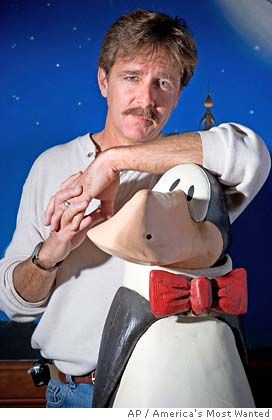
Berkeley Breathed is one of the last veritable newspaper comic legends. He made the comics section something magical alongside the likes of Bill Waterson, Jim Davis, and Lynn Johnston. His two comics, Bloom County and its spin-off, Outland, ran from 1980 to 1995. He never did conventions, until now. So it was a rare treat when Mr. Breathed finally came to Long Beach, partially to unveil The Bloom County Library, the first volume in a series of mega-sized books collecting his first strip in its entirety.
This is what he had to say about his work, his process, and his life:
Berkeley Breathed: Um, so this is a comic con? Cool. The kids love it. You know, I haven’t been to one before. I didn’t know what they were, I didn’t know what people showed, I didn’t know what people talked about. So I asked Scott, my editor, “what do you think I should do?” “Show some slides” “Slides?” “Show your old favorite slides to them”. So I thought about that. It didn’t make much sense, but I do what my editor says, so here are some of my old favorite slides.
Breathed then clicks a button controlling the projector that has lowered. A montage of playground slides, de-evolving in quality and safety as the thing goes on, plays to the amusement of the crowd.
BB: … it made me think of were sources of ideas come from. Um. I love NOW, looking back on my career, as to figure out where ideas came from, both my ideas and what I most admire in others. If I came to hear someone speak… I would like to hear the process. I would like to hear where they thought of that idea for that movie, for that – Sophie’s Choice. Did they start it at the choice, did they write it backwards… that’s what this place is really all about. Even more so than comics.
Breathed then shows us a slide of one of his very first drawings, done up in his junior year of high school. It is a graphic but comical image (a staple of Breathed’s work) of a man in a spread pose… with his head blown off. He received an F. Later that night, after some advice from his father, he wrote one simple word as a caption: Gesundheit.
BB: I still got an F. But she added “you get an F, but you are going to be very wealthy someday”. It was the first clue that I had that drawing a picture and writing … and put them together, and the whole is larger than the sum of the parts. That was really the first clue I had of probably where my career was going to go. I had no history in comic books. I had not read them as a child. Cartoons did not come natural to me. It was a side effect that I was fired from every other department in the University of Texas for making stuff up. I was fired on the news side for wholesale manufacture of stories. It didn’t go well. But I didn’t think of the comic strip first, I thought of an editorial cartoon. This is my first and only editorial cartoon:
He then brings up a slide which parodies the ‘Star Trek’ poster, but replaces ‘Star’ with ‘Far’. It was a commentary on Austin, Texas’s new busing system. It did not go very well, either, and he was fired once again.
BB: I was making the mistake of arguing that it was a perfectly funny cartoon. So. Bloom County. [I] Came up with a penguin one day. The strip needed an animal, I was desperate for an animal in the strip, I was desperate for a focus in the strip, and was without a clue as to how you do a comic strip, but specifically, one without a college readership which had themes of sex, drugs, and rock and roll, which was easy. It needed a focus, Opus came along at just the right time.
He then shows a slide of Opus, Bloom County’s central character. A shy, lovesick, sometimes outrageous, and often social commentarily depressed penguin. Breathed then puts on a slide of Dick Van Dyke dancing with penguins during the famous painting scene in Disney’s Mary Poppins. He explains that this is the image that Opus was born from.
BB: I named it Bloom County, by the way, because most strips are named after their main character. I had no idea who was going to be in my strip. I actually hated the name of the strip for the rest of my career, mainly because Charles Schultz hated Peanuts, as he told me one time. He wanted to call it Wee Folks, which was actually a worse name. He was actually told by a syndicate – he was told to name his strip that [Peanuts]. Garfield was an odd source – it was a good source for one of my odder ideas:
Breathed puts on a slide of Bloom’s secondary character, a speechless and often drooling mad-eyed cat named Bill. Tall, lanky, and in one slide, eating Snoopy alive while a horrified Charlie Brown peeked around the edge of the panel. There was an open briefcase at Bill’s feet, proclaiming the words ‘Get MET, it pays’. He then explains that his editors forbid the mockery of other strips, let alone the mockery of companies like MET. Doonesbury, which Breathed openly admits about being way too close in art and writing style, was put on the editorial page. Breathed then tells the story of how he was invited to the Reagan White House. He shows an image of a random panel that just so happens to have a portrait of Nancy Reagan in it.
BB: So the next morning, I get a call at 7:30 … I need to hold on because the President of the United States needs to talk to me. It’s 1982. I was new to the game, I thought maybe everyone gets a call from the President of the United States. (Laughs). I thought it was fake … I get a call from the local newspaper, I knew it was legit. So he calls me, and it’s President Ronald Reagan. “I just wanted to call up, I was reading the paper yesterday, and I came across Nancy, and I just wanted to tell you, I loved it”. And I said, “Mr. President, you don’t want anything?” and he said “No I don’t want anything, I just got a kick out of it”. And I said “Well, would you like the original?” “Oh, well, I didn’t think you fellas gave those up”. And I said “You know, there is a short list of people that we give them to, Mr. President, and guess who’s on it?” – and he was so endearingly charmed that he was on that list. So, in those days, back in the days when they had big state dinners, they paid you back with a big state dinner. (Pause) There have been strips and themes that always don’t work. One was overweight. Classic, but, uh – thundering, deafening silence after each of these strips that I did. Another thing – Cosmetic Surgery. Cosmetic Surgery was never funny to people. The notion of stuffing your body full of artificial materials to do whatever we do is, in the abstract, very funny. The last topic is big medicine. I thought there must be a way to bring in big medicine – the medical industrial complex – which is just now being talked about – into the strip. If we get scared enough, we go running to them. This is the last one, and it is what got me out of the cartooning business entirely:
Breathed clicks, and a comic involving Opus and a woman in a Burquini (a body burqa) appears.
BB: This is pretty much the last of the Opus strips. I had a character that became Muslim. I had her in Muslim garb. That sent the Washington Post, and its writer’s room, and its lawyers, into a tizzy that I had not seen in 25 years. I thought I saw it coming. I approached it with more sensitivity than I cared for. She comes out in a Burquini. What they [the Washington Post] didn’t know is that a Burquini is absolutely real. It’s sold actually out of Southern California by a Muslim corporation, it’s sold to women around the world to wear on the beach. It didn’t matter, I could not put it in the strip, they did not want me to. I was on the phone at six o’clock at night before the deadline with the publisher of the Washington Post – who I had not heard from in ten years, and he was on the phone telling me “Fix her hair so it doesn’t look too askew” because that would reflect badly on the Muslim community, and I could see things had gone so over the top… I couldn’t even mention Ron L. Hubbard’s name… it was getting weirdly more conservative. It was getting more political. As far as cultural commentary, it was shrinking. And I’m on the phone with the Washington Post publisher about how to fix her hair.
Breathed then goes on to talk about his past and future children’s picture books. He talks about Red Rider Came Calling, which was a story based on a real bicycle stuck in a real tree. His next, Mars Needs Moms (currently being made into a feature film by Disney), is based on his own son, Milo, having a temper tantrum directed towards his mother. But the most compelling tale came from one of his future books, Flawed Dogs. It is the tale of a Dachshund who, through a series of jealousy and betrayal, lands in a prison-type environment for… you guessed it… flawed dogs. They eventually break out and go on a mission of revenge against the Westminster Dog Show. One of the images of revenge is a dog, having shaved a poodle, draws Calvin from Calvin and Hobbes going to the bathroom.
BB: I haven’t heard from Bill for fifteen years, and I’m going to hear from him now. I have the greatest collection of letters in my file – we’re both fighting the syndicates, early 90s. He’s in the middle of a horrible fight that I never had, because of licensing. As you know, Bill Waterson would have nothing to do with licensing. He was probably losing two to two hundred and fifty million dollars a year in the balance of that decision not to do it. In those days, you didn’t own your comic strips, so here was a guy – he was hired labor, as far as they were concerned. We all were. So he’s having terrible fights, scared terribly that they’ll start making the stuff that, for whatever reason, he feared terribly. We wrote letters back and forth, and sweet Bill Waterson has a deadly sense of humor, so he draws these great drawings – always at my expense – of a power boat, me one foot on the dock, pouring dollar bills into the gas tank, while the syndicate head is selling merchandise to pay for the power boat. I’ve got a whole file of these things that I can’t show you – maybe I should, that would get him out of the hole.
Click! A new slide shows up of a woman comforting a helpless dog in the snow. They hug each other. He is looking up at her with such… pain… as well as love. Breathed then tells us that this was his inspiration. He tells us what it is:
BB: This is – this is a picture of one of Michael Vick’s fighting dogs. That was removed and was going to be destroyed until a shelter came for him. This is the moment when he – for the very first time in this dog’s life – years in brutality, taught only to hated, faced only with hate, faced only with hate and cruelty that you and I can’t imagine, never having felt any kind of kindness from a human being in his life, this is where he is receiving it for the first time, and you can see that everything that makes a dog tick is still there, and he’s becoming a dog again. And for a storyteller, this is like the bicycle in the tree. This is what we live for, this is what I live for.
A broader silence fell over the room, as I think I realized for the first time just how amazing this guy actually is. He knows exactly why people write. It was really cool.
“Bloom County Library: Vol. 1” went on sale October 6th.
~*YorickArcher*~
******************
Follow ScriptPhD.com on Twitter and our Facebook page. Subscribe to email post updates on our home page.
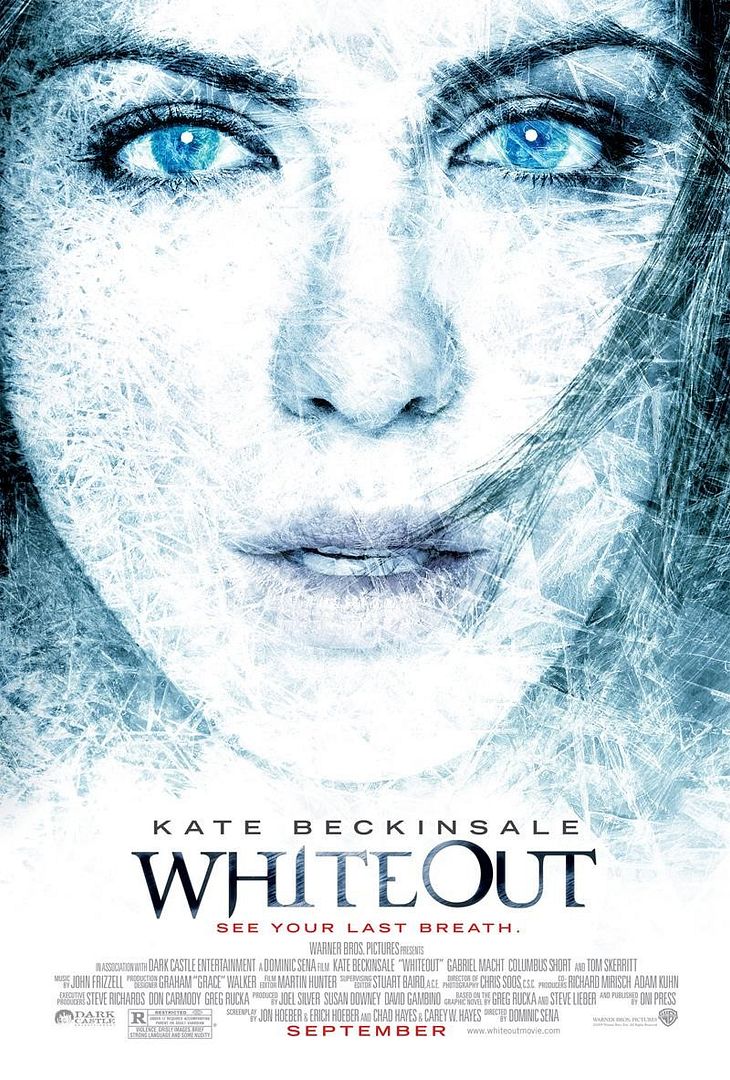
In a recent interview with ScriptPhD.com, Watchmen screenwriter Alex Tse described Hollywood’s recent spate of comic book and graphic novel adaptations as jumping on a bandwagon. So let’s continue the momentum and hop aboard the South Pole Express to Warner Brothers’ Kate Beckinsale-starring remake of the classic graphic novel Whiteout by Greg Rucka and Steve Lieber. ScriptPhD.com reviews this cool-as-ice thriller and provides some real-world gripping tales of scientific heroism in Antarctica under the jump.
Review: Whiteout
ScriptPhD Grade: B
Deep in the blinding chill of the whipping Antarctic winds and snow flurries, with temperatures at -120 degrees and winds at 100 miles per hour, a Russian cargo plane carries a crew and mysterious payload. Its flight and mission are aborted by a rampage that kills every member aboard, forever burying the plane and its secrets. That was 1957. This is now. Assigned to the South Pole’s Amundsen-Scott research station, U.S. Marshall Carrie Stetko (Kate Beckinsale) is wrapping up her Department of Justice duties and getting ready to hand in her badge before the oncoming “whiteout”, an unholy convergence of weather events that results in a six-month winter of darkness. Inconveniently for Stetko, days before the last of the planes are to leave the station, a grisly murder is discovered, Antarctica’s first. Delving deeper into the mystery, and putting her own life into danger, Stetko unravels motivations leading all the way back to the Russian cargo plane. With the help of her friend and mentor, the station’s on-board doctor (an avuncular Tom Skerrit), UN investigator Robert Pryce (Gabriel Macht), and fiery pilot Delfy (scene-stealer Columbus Short), Carrie must battle the haunting demons of her past and the harsh conditions of the present to answer the two questions that will capture the killer. What was on the cargo plane that was worth killing for? And who can she trust?
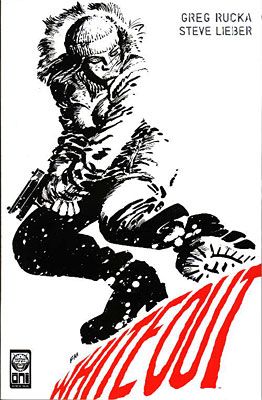
Seeking to evoke the realism of the cold, barren Antarctic, director Dominic Sena shot the film’s exteriors in subzero temperatures in Manitoba, Canada, a point reiterated vocally by the stars at the press junket. Sweeping cinematography of the stunningly beautiful landscapes is one of Whiteout‘s high points. However, Sena’s camerawork seems to serve no more than the dual purpose of pointing out that the South Pole is oh-so-very cold and that Kate Beckinsale is oh-so-very hot. (A gratuitous shower scene towards the film’s beginning evinced an audible groan of disbelief from the press corps.) That Beckinsale has a smokin’ bod is apparently essential to absorbing this labyrinthine tale. “What I found intriguing about the story and about Carrie Stetko is how human and flawed she is,” said Beckinsale. “Because you don’t know her backstory, you don’t know what she is capable of until you see events unfold. How damaged is she? Are her instincts still good and will they carry her through or will they fail her again?” Sadly, Ms. Beckinsale could not translate this wonder and intrigue into credible acting. Her staid, underwhelming performance turns a rare (for the world of graphic novels) strong leading heroine into a forgettable victim. Surrounded by a cluster of credible, if underdeveloped, side characters, the relationships and secondary plots feel like anemic distractions from an already weak premise. A tease of romance between Stetko and UN investigator Pryce is just that, because they haven’t had time to solidify a true bond. Likewise with colleagues Doc Fury and the pilot Delfy–by the time their characters figure into the unfolding of events, no one cares. Flashbacks to a previous partner’s betrayal and murder by Carrie (in a rather clever meteorological juxtaposition between scorching Miami and frosty Antarctica), significantly explored in the graphic novel, never finds satisfactory resolution in the movie. To make matters worse, many of the comic book elements that contributed to the book’s success simply don’t translate to the silver screen. A masked pick axe-wielding psychopath, for example, designed elicit page-turning fear, in the film seems anachronistic and inappropriately humorous. There is also the controversy over several elements changed from the novel, most notably the gender of Stetko’s UN agent partner, originally a female in the book, with whom Stetko had nevertheless become . . .close.
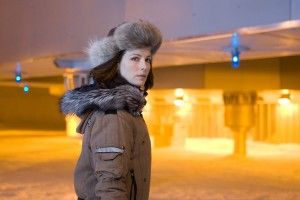
Despite its shortcomings, Whiteout still has noteworthy merits, not the least of which are subtle, appreciated nods to science organizations NOAA and the National Science Foundation. For one thing, the movie never scrimps on the action and thrills. A few of the chase scenes between Stetko and her would-be assailant, amplified by the blinding, debilitating chill, are downright gripping. With an unidentified killer afoot in a confined space, a few of Beckinsale’s solo scenes evoke the psychological suspense of classic film noir. Much of that was achieved through Sena’s commitment to shooting in authentic locales and conditions. “We wanted to lay out clearly what the temperatures are, how quickly a person can get frostbite or die from exposure. It’s all there and it’s all true,” said the filmmakers. Indeed, the unforgiving conditions are a character unto themselves, contributing both to the plot evolution and action sequences. Adds Beckinsale, “The action is based in reality and I think that will make it more intense for audiences because they might imagine what they would do in the same situation.” Finally, despite veering towards some predictable plot points along the way, Whiteout does culminate in a genuinely surprising ending that will keep you guessing. After reading the bookseeing the movie and digesting the ending, the tagline “See Your Last Breath” will make much more sense.
The bottom line is that fans of Ms. Beckinsale, the original graphic novel, or those simply looking for a mindless cinematic weekend escape will be suitably pleased with this perfectly adequate by-the-numbers thriller. However, fans wishing to experience the magic and suspense of Whiteout with all the nuance and character depth that the story necessitates are better off sticking with Rucka and Lieber’s comic masterpiece.
Whiteout opens this Friday, September 11th in theatres nationwide.
South Pole Science
The Amundsen-Scott South Pole Station is the southernmost continually inhabited place on the planet. Research, the primary purpose of the station, includes glaciology, geophysics, meteorology, upper atmosphere physics, astronomy, astrophysics, and biomedical studies. As depicted in the film, scientists (and other crew members) primarily inhabit the station from late October to mid-February, leaving a minimal crew during the “winter over” Whiteout months. For a tour of the Station by researchers working on the South Pole telescope, check out this video:
Want a real dose of Hollywood terror on the South Pole? Check out the story of heroic Doctor Jerri Nielsen FitzGerald. Answering a call to serve as the only doctor at the NSF’s Amundson-Scott research station, Dr. Nielsen, an emergency room physician, soon found herself trapped at the station because sub-100 degree temperatures turned fuel gelatinous, thus making flights in or out of the station impossible. It was right then that she discovered a lump in her breast, and had to rely on computers, satellite imaging and teleconferences with oncologists back in the United States. Terrifyingly, because she was the only trained physician at the station, Dr. Nielsen had to get help from her colleagues for every procedure–a welder first practiced on an apple before using a needle to perform her biopsy, a maintenance worker prepared laboratory slides and other samples, and computer scientists aided with transmissions of data for analysis and chemotheraphy treatment, which was airdropped to the station. Finally, as temperatures began to thaw that Spring, she was rescued by the National Guard. Dr. Nielsen documented her harrowing story in the autobiography “Ice Bound: A Doctor’s Incredible Battle for Survival at the South Pole”, as well as a CBS movie of the same title starring Susan Sarandon. Sadly, Dr. Nielsen passed away earlier this summer, but her bravery, courage, and survival are immortalized.
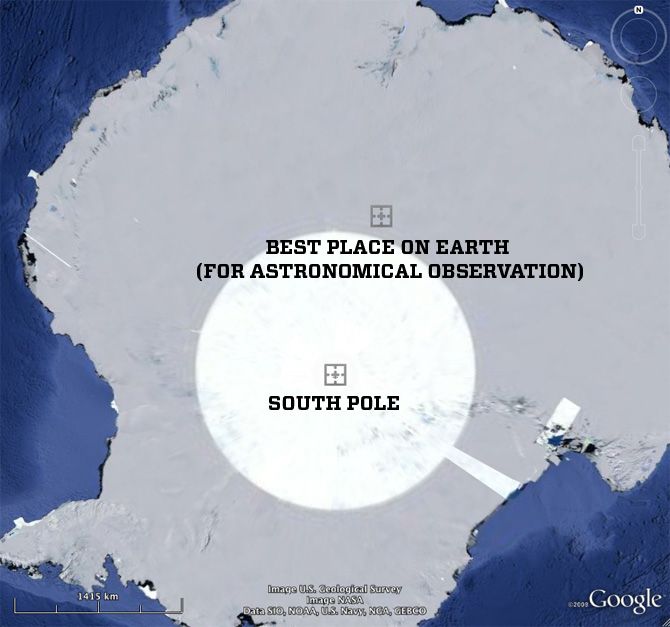
The next wave of research on the South Pole? Stargazing. Scientists have identified the perfect spot, known as Ridge A, located in the Antarctic interior [see picture above]. Why is it so perfect? Scientists combined all the factors that influence astronomy–cloud cover, temperature, sky-brightness, water vapor, wind speeds and atmospheric turbulence–and determined where they converge most auspiciously. “The astronomical images taken at Ridge A should be at least three times sharper than at the best sites currently used by astronomers,” said Will Saunders, an astronomer at the Anglo-Australian Observatory and visiting professor to UNSW, in a press release. “Because the sky there is so much darker and drier, it means that a modestly-sized telescope there would be as powerful as the largest telescopes anywhere else on earth.” The bad news? It’s so inhospitable to human existence, no human has ever set foot on the space. Well, no discovery is perfect. A similar viewing station nearby, the Dome A PLATO observatory functions year round robotically, without any human presence, and could serve as a model for Ridge A.
But until then, we have Hollywood.
~*ScriptPhD*~
*****************
Follow ScriptPhD.com on Twitter and our Facebook page. Subscribe to email post updates on our home page.

Who watches the Watchmen? A whole lot of people! One of the spring’s biggest breakout hits was director Zack Snyder’s cinema adaptation of the Alan Moore and Dave Gibbons classic 1989 graphic novel, Watchmen. ScriptPhD.com first caught up with one of the Watchmen screenwriters, rising star Alex Tse, during this summer’s Los Angeles Film Festival, and sat down with him recently to talk about the experience of working on the blockbuster. Before being contracted on the Watchmen project, Tse got his big break when his first script, Sucker Free City, was produced by Showtime Television and directed by Spike Lee. His current projects include a collection of sci-fi and comics screenplays, including the 1951 collection of science fiction short stories The Illustrated Man, the 2005 American thriller novel The Winter of Frankie Machine, the anime Ninja Scroll, and a film adaptation of the upcoming graphic novel Battling Boy by Paul Pope. Tse grew up in the San Francisco area before attending Emmerson College in Boston. Our full transcript under the “continue reading” jump.
ScriptPhD: How did you get involved in the Watchmen project?
Alex Tse: It’s the only way I could have been involved, given the amount of credits I had, which were not many. I had read that the project was going to Warner Brothers, I think at the end of ’05. And I knew that because it was going to WB, and I had done a lot of work there, that I would be given the opportunity to be heard. So I just told my agent, “Hey, get me in a room.” And they did, and I talked to [producer] Lloyd Levin over the phone and that went well. He had read a script of mine that he liked. And that just began the process, the competitive process, from there.
SPhD: Actually, when I watched the movie, I hadn’t read the graphic novel. And I have done since, and it only struck me after I’d read it, and talked to [author] Dave Gibbons at Comic-Con, how much material you guys had to deal with to condense into a movie. Interestingly enough, Dave loved the adaptation! It’s amazing how much of a higher standard is held sometimes by fans of a particular enterprise—
AT: [laughs]
SPhD: —than the creative talent! While the script was being written, was there an acute cognizance on your part that you had this one shot to get it right?
AT: Well, you can’t not be conscious of it on some level, I think, certainly it’s always even a hesitation of taking something like this on because you don’t want to be the person that messes it up. But what overpowers that notion is the fact that, and I always use a sports analogy here, at the end of the game, do you want to be the guy with the ball in your hands and the responsibility despite the fact that you might miss the shot or make the wrong play? Is that your personality? And I think for a lot of people involved, they wanted that responsibility, because for myself and I speak for [co-writer] David Hayter, and especially for Zack [Snyder], we were all fans of the material. So I think there didn’t have to be an overconsciousness of the fanboys necessarily, because we’re fanboys! So we come in from that perspective—now that’s much different than being a fanatic, and it’s interesting that you say that sometimes the creators of the material aren’t such sticklers for certain things that strict fans are. And when you’re coming from a creative background, especially a working creative background, you understand the pitfalls and challenges of trying to do good work, given the system, and you are not so hard on certain things because you understand how hard it is to get it to the point where it is at now. Does that make sense?
SPhD: Oh it makes perfect sense! And that was one of the things, after I read the graphic novel, that got me curious. What was the process of what stayed in and what didn’t? Watchmen has a LOT going on. It was really complicated, there were stories within stories, you guys kept out the Black Freighter. Take us through the development of the script.
AT: Well first of all, David Hayter had already done a draft, and had done a good job of the editing process. When I became involved in the project, and especially when Zack became involved, when 300 was successful, he had the leverage to call certain shots that people couldn’t do without that currency. If you go back and look at the comic book, there is a lot of time given to let’s say secondary characters that are not the Minutemen, that are not Rorschach or Adrian or what you would consider main characters. There’s a lot of pages given to the two Bernies. The whole issue with them is like the whole issue with The Psychiatrist. Now, obviously they’re not going to be main characters in this movie. So you can immediately edit that out, and the Black Freighter stuff that’s not gonna fit in the movie. And if you look at a lot of that stuff, you’ve already lost a chunk there. You’ve already lost a great deal with the most obvious stuff to go. And then, when you’re left with the main characters, we also lost a lot of the Golden Age Minutemen stuff, with the Hollis Mason crew, we lost some of that backstory. So, when you trim those things, you’re left with what you’ve determined to be the main ensemble. It’s pretty workable, if you go back and look at it and cut all the interstitial stuff. When you look at the core story and the core of what Watchmen is, and you’re determined to protect that—
SPhD: And certainly Dave Gibbons, and Alan Moore of course, must have had creative input into the transfer process. I can’t imagine not involving them in that.
AT: Well Alan Moore doesn’t give a shit! [laughs]
SPhD: Oh seriously?
AT: Yeah, he openly doesn’t give a shit. Dave was involved from the get-go. That was important. Critical box office numbers didn’t mean as much to me as his approval. His approval was certainly one of the highlights of my career.
SPhD: What drew you to screenwriting and who were some of your early influences in screen and print that you enjoyed growing up?
AT: Well I’ve always been interested in writing from a really young age, but you certainly don’t consider it to be a real job. I didn’t consider that until I went to college. And then I saw Pulp Fiction and that [movie] made me want to suffer for [the craft]. It’s an important distinction and an important decision, because everyone can wave a magic wand and want to be in the movie business. And I’ve always loved movies and television. My first love was comic books, but I couldn’t draw. Not that you have to draw to do comic books, but to be in comics, I would have wanted to be able to draw. I wanted to draw so bad, but I just sucked! It’s probably what I would have ended up doing, because that was a big influence. My parents loved movies, and they took me to see a lot of movies at a young age, and that certainly influenced me.
SPhD: What kind of comics did you like to read?
AT: Yeah, first, before I got into what you would call more “serious” comics, I was way into X-Men. All the mutant stuff: X-Men, X-Force, New Mutants, anything that was mutant related. I got into Batman, Spiderman, but mainly all the mutant stuff I really loved. Then in terms of writing, when I initially read comics as a kid, I might recognize the writer’s name, but I wasn’t buying stuff because of the writer. But the first time I really started paying attention to writers’ names was when I read Frank Miller’s Dark Knight Returns. And I was like, “I want to buy everything that this guy wrote. I need to read more of what this guy wrote.” So I started reading his Daredevil stuff, then I read Alan Moore’s Swamp Thing. And that led me to Watchmen and a lot of his other work. And I began paying more attention to who was writing these things. So it all kind of blended together in terms of writing influences. Frank Miller, Alan Moore, Star Wars was huge, all of the George Lucas/Spielberg early stuff.
SPhD: It sounds like you’ve been able to really combine your love of comic books and graphic novels with screenwriting. And in my generation, it seems like there’s this whole slew of movies that are going back to the graphic novels and the Golden Age serials. What do you think it is about this genre that so lends them to the cinematic experience?
AT: Well, I think you’re giving a lot of credit there to people. I’m talking about on the development side. Yeah, some of it is deserved, where you get people who recognize a piece of material that could translate to the screen. I think at this point, it’s just another source of material. Certainly there’s been a bunch of graphic novels that have been successful as movies, and of course anytime that happens people are just going to jump on that bandwagon. And they’re not necessarily comic book fans or anything like that. And in a very basic way, it’s a storyboarded thing. Like, “Look there’s pictures!” so you can have some reference. But I’d say it’s more a bandwagon at this point. Hollywood is always hedging their bets, Hollywood is always making the safer decision.
SPhD: Tell me a bit about the current project you’re working on. I know we heard a bit about it at the LA Film Festival earlier this summer.
AT: I’m working on Battling Boy right now. It’s been an interesting and fun process to work with Paul Pope. With anything in the film business, all I can do is my job, which is to write the best film script that I can, and getting a movie made is like winning the lottery. There’s so many moving parts.
SPhD: And you’re writing the movie at the same time as the graphic novel is being written, right?
AT: Yeah, I think the novel is getting released next year. I’m not sure what percentage [Paul] is done with, but it’s in the process. So that’s been interesting for both of us, but a lot of fun because he’s a great guy and really visionary.
SPhD: Anything else you’re really excited about that you’re working on?
AT: I sold a TV pilot and I’m going to have to start working on that. And we’ll see if any of the projects that I’ve finished a script for get made.
SPhD: Can you reveal…. comedy, drama?
AT: It’s going to be a drama, for FX. And I haven’t started writing it yet, so I’m going to have to get started on that soon.
SPhD: Well it sounds like you are very sci-fi/comic oriented, so if and when any of that pans out, you are more than welcome to come back and talk about that with us anytime you’d like! Alex, we wish you the best of luck in the future. Thanks so much.
AT: Thank you very much.
Watchmen (the theatrical cut and the extended Director’s cut) was released on DVD and Blu-Ray July 21st.
~*ScriptPhD*~
*****************
Follow ScriptPhD.com on Twitter and our Facebook page. Subscribe to email post updates on our home page.
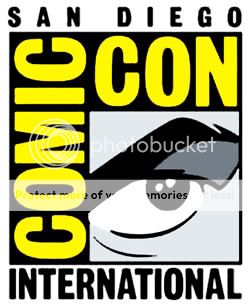
Well, faithful readers, our press room interviews have been transcribed, our complete pictures have been edited and labeled and sleep has still not been had. Someday. To make it easier to enjoy all the Comic-Con goodness from start to finish, we have condensed our four days of coverage in one place. Enjoy and thanks so much for following the journey with us!
Day 1: Includes pictures and scoop from the Warner Motion Comics, Battlestar Galactica Retrospective and Mad Science: The Fiction of Science Fiction panels, and press room transcripts of Psych and Burn Notice.
Day 2: Includes pictures and transcripts from the Farscape 10th Anniversary Reunion and FlashForward panels along with full transcripts from press room interviews with Bones and Big Bang Theory
Day 3: Includes exclusive pictures and videos of the enormous Lost panel/arena rock event and the Futurama! and True Blood panels, as well as press room interview transcripts with talent from Fringe and MythBusters
Day 4: Includes exclusive pictures and transcripts of two final Sunday panels: Supernatural and the long-awaited Comic-Con appearance of David Tennant with the Dr. Who panel.
All four days of coverage include the ScriptPhD.com Costume of the Day, chosen from an array of pictures that you can browse through on our Facebook fan page and extra side interviews and scoop from all the wonderful actors and writers we ran into.
But wait! There’s more! I’ve saved two special surprises for our last post. The first is our ScriptPhD.com one-on-one sit-down with 24 writer/executive producer David Fury. We go in-depth behind the show’s themes of terrorism, torture, national security and how they extend to the real-world law enforcement reaction to the show. We also have a free fan giveaway of three copies of the Comic-Con 2009 40th Anniversary souvenir books handed out only onsite.
To read our interview and enter to grab your copy of the book, please click “continue reading”.

ScriptPhD.com: Your show paints this terrorism world as very tense and pressing and in imminent danger. So it’s kind of a no-holds-barred search for information that saves lives. That’s your plot, that’s your premise. You’ll do whatever it takes.
David Fury: That is the premise, yeah.
SPhD: What response have you gotten from members of law enforcement, particularly from Homeland Security, in terms of how you portray this [arena], and if there has been any criticism, how is that then fed into the writing? I know you entertain and that’s your bottom line, but I’m just curious.
DF: No, it’s an excellent question, and we’ve certainly dealt with it a lot, particularly in the last couple of years. We’ve spoken to a lot of people at the Pentagon in law enforcement, now it’s federal law enforcement, and military. We’ve spoken to the men who literally interrogated the men who gave up Saddam Hussein. In fact, they couldn’t use their own names because these are top secret guys. How they feel about the show? They’re concerned, because the show does present this absolute, where we have a pressing problem, a bomb is gonna go off, an attack that’s going to happen, an assassination. And we have to get information quickly. In reality, if this wasn’t a real-time show, if this was a show that existed minute-by-minute, we would love to tell the stories of how they manipulate information out of their prisoners. But we are constrained by the premise of the show, which is a 24-hour period, real time, every episode one hour where very bad things are going to happen and what they’ve told us is, “Well that never happens. There’s never a ticking bomb. We’ve never been in a situation where there’s a ticking bomb and we have to have this information right now.” And to that I’d say, that’s the difference between reality and this show.
We try to be as true and as respectful to the people who do this kind of thing and we try, particularly last year, to address the nature of torture and the costs of that torture to all the people: the person being tortured and the one inflicting it. We try to deal with that, but it’s difficult for us to tell any stories where they use the methods that are actually being used right now to get information. These are brilliant people doing a very difficult job and a lot of it has to do with ingratiating them and the people they’re trying to interrogate and flattering them and promising them, and that’s just not dramatic. And if we were a show that was able to skip three days within an episode and say “Three Days Later…” and this is what’s happened, we’d tell that story, but we can’t, so we resort to Jack [Bauer] doing what he does, and other people, inflicting torture. But we’ve always been very conscionable in terms of the costs and I can tell you that the majority of the people are, I can’t speak for everyone, but we’re not pro-torture. We’re not, in life–
SPhD: No, no, I totally understand. The reason I asked you this question is because your show came along at a very important time in our nation’s history.
DF: Absolutely right.
SPhD: It was almost like timing meets opportunity. And you are an entertainment outlet, but it’s funny how you are capturing the zeitgeist. And I’ve heard a lot of people say, “Well if Jack Bauer can do this…” so do you ever worry that that bleeds over into a certain mentality–
DF: Well, it certainly does. And it does worry us, and it does apparently really happen. We’ve been told that some people in the military, I believe in particular, some of the younger recruits took to watching our show to get ideas [on] how to get information. And that was a scary thought to us. It’s like, “For God’s sakes, we’re not a training video! Don’t let Dirty Harry teach police officers how to catch criminals.” But you’re absolutely right. The show was born in a very tense time for this country. It was born in the shadow of 9/11, and it’s now eight years later and we have to maintain, for the purposes of drama, that kind of heightened threat. The one that we’re kind of feeling a little bit more relaxed about and we’re not really thinking about. But dramatically in the world of 24, it’s something that like for Jack Bauer, as we pointed out, he’s starting the season in a happy place, but as we all are, as we’re much more optimistic and positive, but something can happen to just turn it back all around and we’re back where we started eight years ago.
SPhD: Well I want to thank you on a personal note, because I was in New York City when 9/11 happened, unwittingly so actually, and being there [during a terrorist attack] really re-prioritizes your moral and political ambiguity of where you stand and your mindset when something like that happens to you. So your show really brings back a lot of the feelings [and struggle] I had when that happened. I’m really happy to hear that you’re cognizant of the greater outlet of what you are doing and I thank you for that.
DF: We are. Well, thank you for that. We’re very concerned, we certainly don’t want people to look to us as we’re painting the world as we see it. We’re painting a world where a character like Jack Bauer can exist and can function. And if it resonates with people’s fears, great. It doesn’t have to. I think it works on its own level as a character study of a man who is forced to do terrible things to protect the country.
SPhD: Thank you, sir.
DF: You’re very welcome!

And now, for my favorite part of this process… being able to interact with our wonderful ScriptPhD.com fans and make you happy! I’m so grateful for the support our site has gotten and for all of you who have emailed to let us know where our transcripts have needed updates or adjustments, that we have decided to give away some Comic-Con memorabilia. Rather than giving away banal chachkes that appear every year, we wanted to give away something unique and special. This year, to celebrate the 40th Anniversary of Comic-Con’s existence as a festival, organizers put together a gorgeous commemorative book chronicling highlights, pictures, posters and factoids from each of the 40 conventions to date. For sci-fi, Comic-Con and comics buffs, this collector’s edition is a must have. We rounded up three extra copies (shhhh don’t tell anyone!) and will mail them to three lucky fans for free anywhere on Earth! Sorry, at this time, extra-terrestrial residents are not eligible. To make the process fair and transparent, the first three comment posts with a valid email address will win the prize–and don’t worry, if I can’t approve them right away, they are timestamped. We will contact the winners for mailing info. Good luck!
Please credit all photography to ScriptPhD.com if you take any for your own use.
~*ScriptPhD*~
]]>
Are you guys still staying strong and ready for more Comic-Con highlights? Good, I thought so. Saturday is always an action-packed highlight day for the Con, with the best of science and entertainment panels saved for last. And this year did not disappoint. We got an up close and personal view of the very last Lost panel ever as we watched right from the stage and bring you great pictures and highlights from the panel. Thanks to two great friends from the production crew, we were able to enjoy the controversial Futurama! panel from backstage, where we caught up with the writers and producers. Along with a full transcript of the highly anticipated True Blood panel, we had two more great press rooms with Fringe and MythBusters. To be a part of the Comic-Con action, please click “continue reading.”
Lost
Panelists: Damon Lindeloff and Carlton Cuse (executive producers and head writers of Lost) and special guests to be named later.


We can say with a high degree of scientific certainty that this year’s Lost panel, the last ever at Comic-Con, was the most anticipated event, as evidenced by queues that wrapped around the convention center, around the marina, and back. Some fans had started lining up in front of the Hall as early as 7 o’clock… the night before. Luckily for you, our faithful readers, ScriptPhD.com had a front and center seat right up on the stage with the press to take in every moment right up close as it happened. And since a picture is worth a thousand words, we decided to let you experience the full Lost panel in the pictures we snapped and with YouTube videos kindly recorded by Tostie Productions.
Part 1
Part 2
Part 3
A fun Season 6 promo!
And an even more fun parody video
As a supplement to the full videos, scroll down for some fun pictures capturing the best moments of the panel. Please credit all photography to ScriptPhD.com if you take these for your own use.
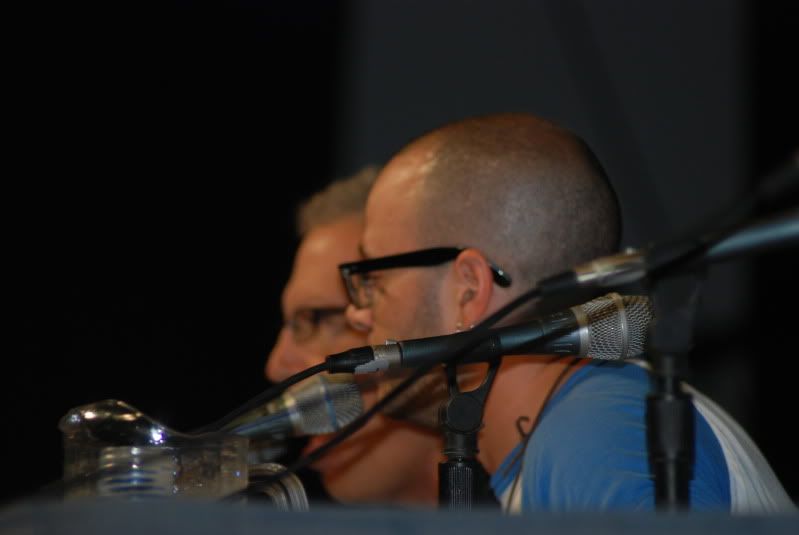

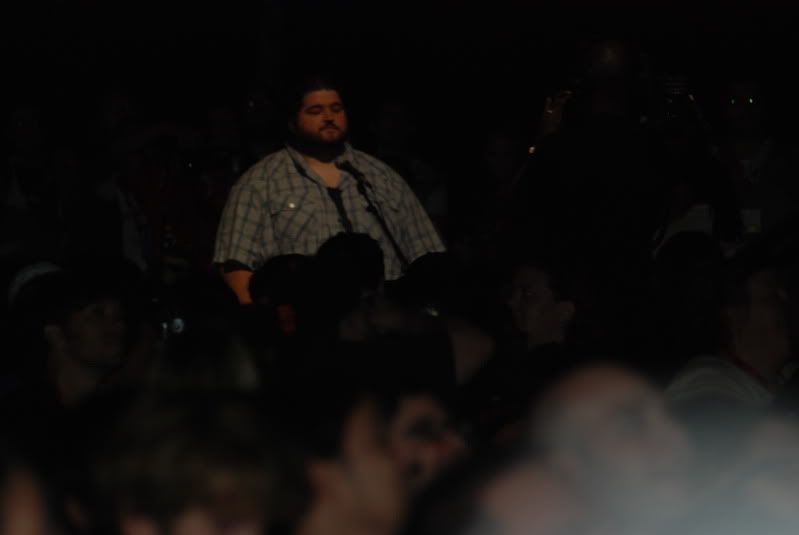
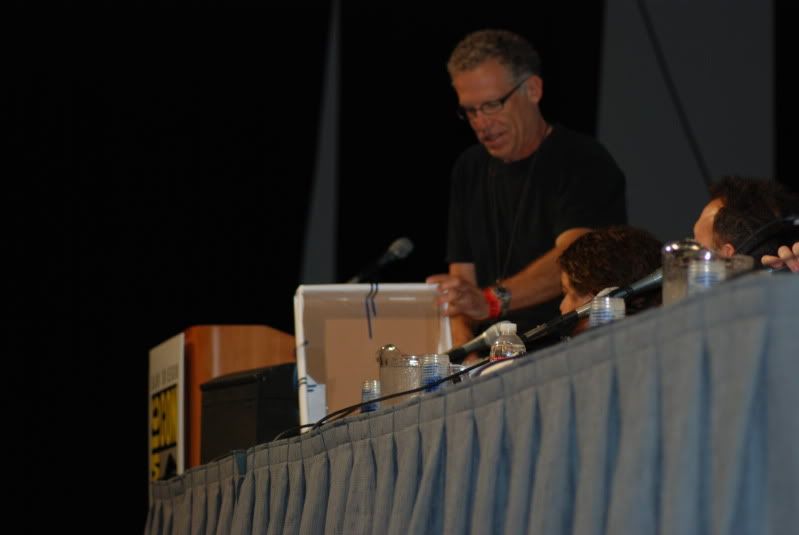
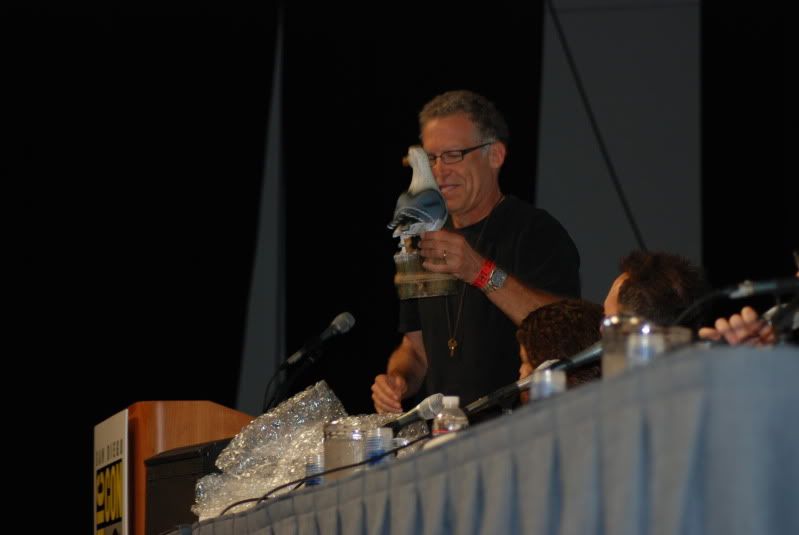
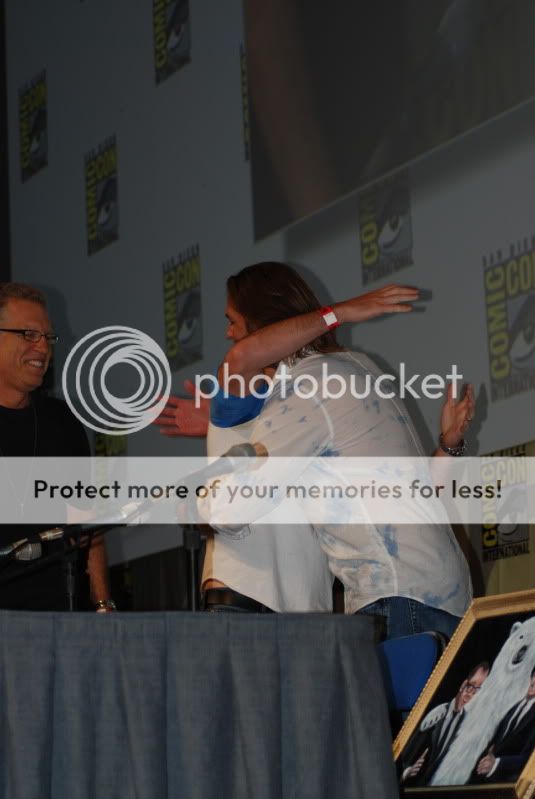


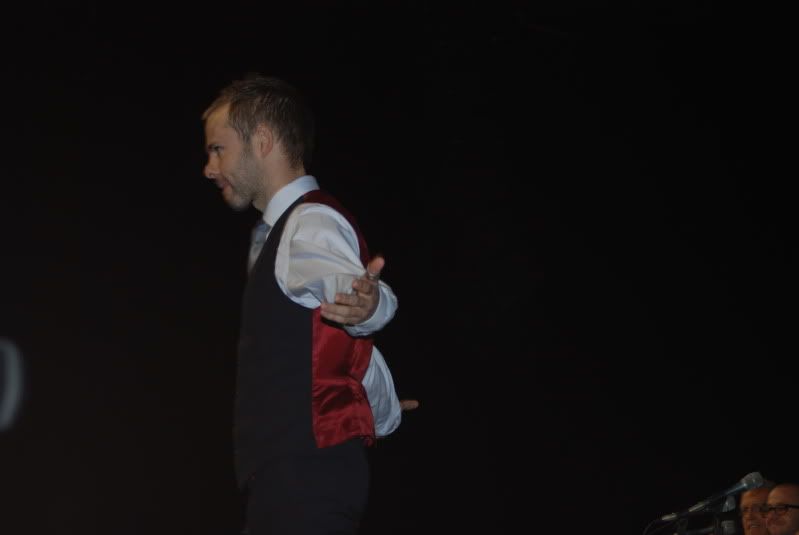
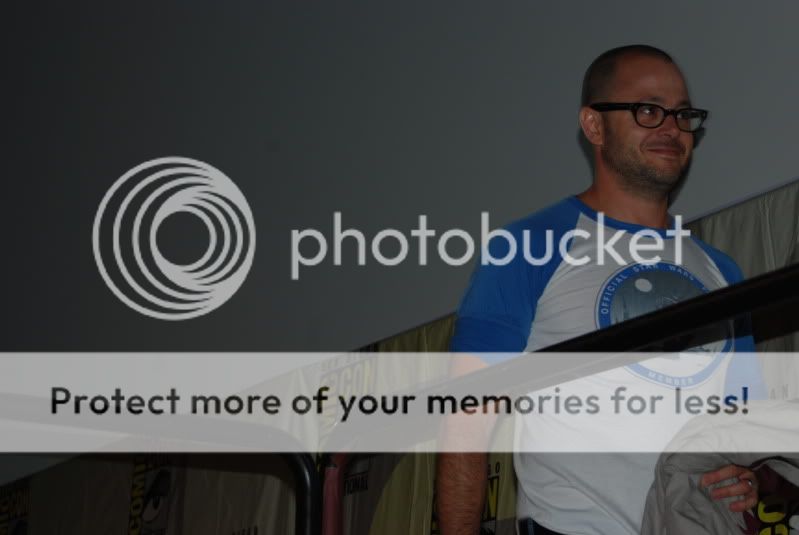
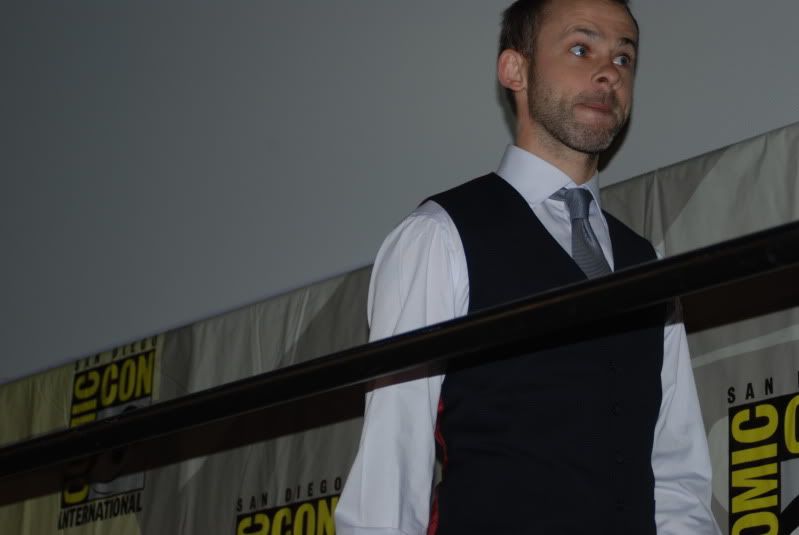
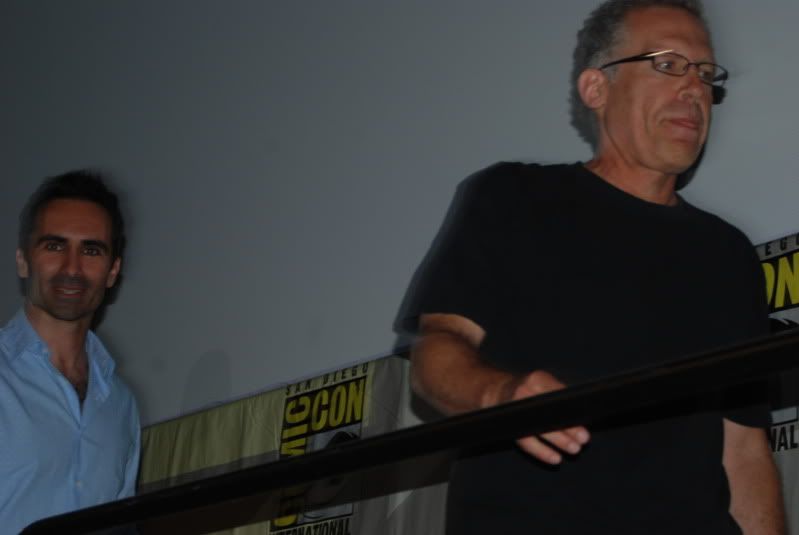
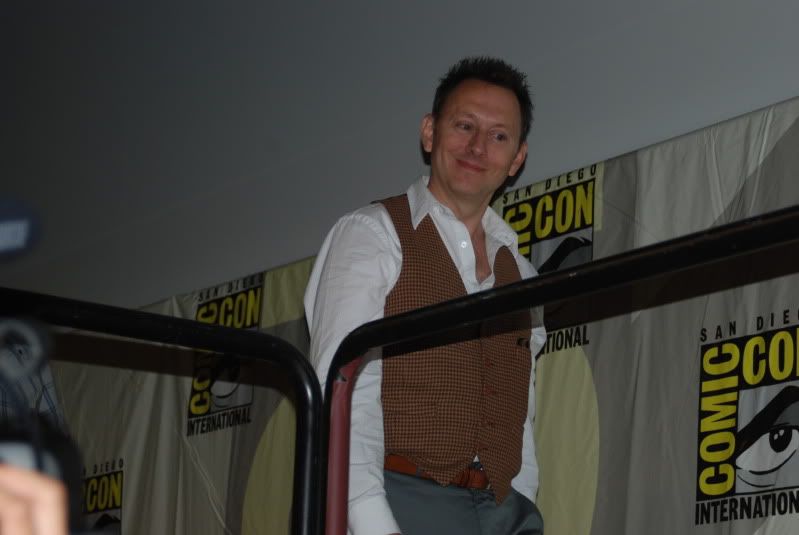
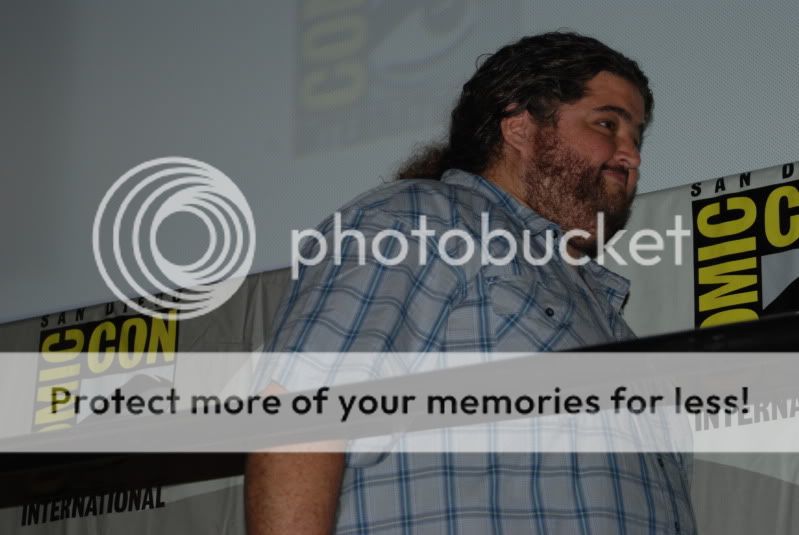
Futurama!
Moderator: Bill Morrison (Bongo Comics)
Panelists: Claudia Katz (producer/writer, Futurama), Patrick Verrone (Producer/writer, Futurama), Eric Kaplan (writer/producer, Futurama), Michael Rowe (producer, Futurama), David X. Cohen (Futurama, The Simpsons), Matt Groening (The Simpsons)
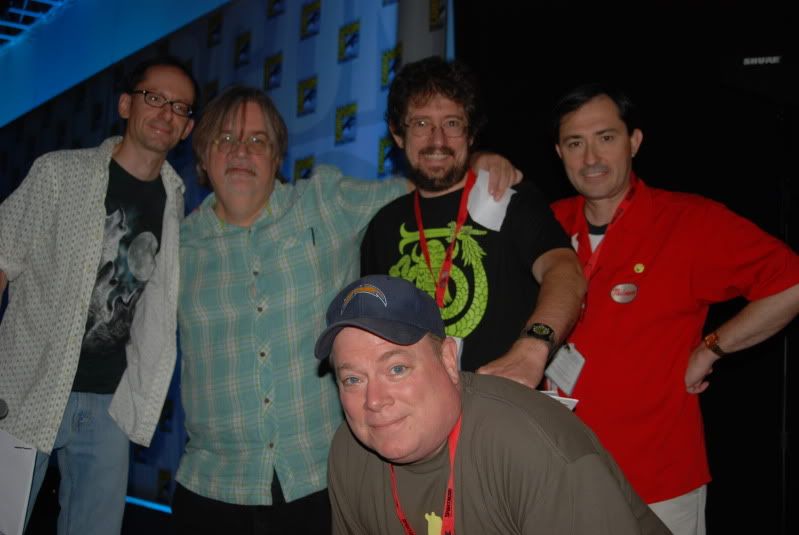
As many of you know, there has been a fair amount of controversy surrounding the return of FOX’s immensely popular animated show Futurama! due to contract negotiation issues with the actors doing the voices. The Futurama! panel was to have consisted of the voice talent, however because of the uncertainty of when and if the show would be renewed, animation and production talent appeared instead. Matt Groening began the morning by reading a humorous, sarcastic statement absolving Fox of blame for the situation. Due to time restrictions, the panelists saved time only for fan questions.
Producers showed a funny clip of Futurama! behind the scenes. (The clip is available as an extra on the DVD of Futurama!
Matt Groening: First of all we want to make it clear that we love our Futurama actors! We just hope that FOX and the actors can come to agreement ASAP. Let us continue.
David X. Cohen: We are mainly a panel of writers, and we decided to take advantage of that. S we are going to show you some samples of actual behind the scenes dialogue from writers’ room: things people have said over the years in the writers’ room that have been memorable, and we wrote index cards later. We saved them, Xeroxed them, and read them back, these are magic moments. And genuinely behind the scenes.
Example:
“We need to think about logistics?”
“What kind of logistics?”
“That’s what we need to talk about-there might not be any logistics”
“This is a light, romantic scene, so we don’t want him farting, puking and shitting diarrhea.”
“Were you nominnated for something?”
“No I’m a judge.”
“What did you judge?”
“Nothing, I forgot.” —re the Webby awards
“My monster manual is starting to smell.”
“Search for lame [on the script] going upwards.”
“Watch, it’ll highlight the whole script.”
“Inscincere compliments are still good.”
“Futurama brings the flava.”
At this point, the writers opened up the floor to fan questions, and each fan that asked a question got a prize out of the box to mimic what the Lost writers did during their panel at last year’s Comic-Con.
David X. Cohen: This is mostly Lost merchandise as prizes.
Fan: How do you guys keep continuity throughout the series? There’s a lot of references in later seasons from earlier seasons.
David X. Cohen: Fan sites, actually. We frequently consult with them, I’m proud and embarrased to say.
Fan: Beginning of the new season, are they going to end up in a random place or back home at Planet Express?
Matt Groening: David and I debated over that one. I thought it didn’t matter and that we should just start over. And David thought, no we have to address that world. So, he wore me down and that’s what we’ll do.
David X. Cohen: Exploring the story of that world wont be the thrust of the plot, we’ll get them back home, but yes we will address that world in the beginning for continuity.
Fan question: Do you guys expect to do Futurama! in theaters?
Erik Kaplan: Like puppet theaters?
Matt Groening: We’d love to do a Futurama theatrical, but we had premiere screenings at various movie theaters, we actually had one here at Comic-Con last year. It’s really fun to see it on the big screen. Hats off to the animators at Rough Draft for creating something that’s way beyond the boundaries of television, so we have watched the show on big screens. And we do plan on some work as a theatrical feature.
Fan: Will Leela and Bender ever get together?
David X. Cohen: We were right on the brink at the last season, and we will address that a little bit, but they’ll have their ups and downs in the new adventures. But of course it’s their ultimate destiny.
Fan: Is it harder to come up with jokes later in the series than in the beginning?
Michael Rowe: Can be hard at start, actually but later you learn from those mistakes. You get into the flow of the feel.
David X. Cohen: We’re at a certain point now with the show where that curve is leveling up, but someone will say, “Wait we did that in Season 3” so then we remember a hilarious joke we did and do a twist on that.
Michael Rowe: We’ll have to go back to the DVDs and change it!
Patrick Verrone: It’s actually much harder to come up with stories than jokes.
Fan: What was the inspiration for Nibbler?
Matt Groening: That was my idea of designing something cute, my Ewok.
Matt then gave this fan the uber-prize for best costume they’d seen all day.
Fan: Will there be any major characters that we’ve come to know and love next season?
Michael Rowe: I guess it depends on the actors [and the contract resolution].
David X. Cohen: We’re not going for anything big.
Matt Groening: But we’re planning to reveal the secret origin of Scruffy. He is not what he seems.
Patrick Veronne: I was home working on a script for a concept called “Twitter in the Year 3000”, which I’m working on right now. I’m hoping to involve you the fans from here at home, but that may get written out. We’ll probably call it something else because of the Twitter copyrights.
Michael Rowe: We’re going to have a shocking, unlikely relationship. Bender and Amy. It’s hot and heavy. Bender is due for a lot of it. And it even turns into marriage.
David X. Cohen: There’s a controversy about the robosexual marriage aspect of it.
Michael Rowe: Yes, it’s human/robot marriage, I heard there was Proposition Infinity to address the controversy of it. [laughter from audience—he’s ripping on Proposition 8 in California to repeal gay marriage.]
David X. Cohen: There is going to be a literal rebirthing of the show. We have another big one in the works: Ken Heeler, Zapp Brennigan, and Leela stranded together on an island.
Matt Groening: We have another one where Fry arrives early for once in his life to meet up with Leela. And Fry and the Professor get into time machine to skip over the 10 minutes so they don’t have to wait, only they go forward 10 years on accident. They keep going forward in time, hoping that eventually they’ll get into a time machine that goes bakcwards. I can’t say anymore… well all right I’ll tell you. The universe collapses. That’s all I can say.
Patrick Verrone: [Off-topic—all the panelists got a Hershey’s kiss during Comic-Con.] I disovered you can turn a Hershey’s kiss into a gelatinous blob.
Erik Kaplan: Someone here has a figurine of Judge Sotomayor.
Fan: Are you guys planning on doing any more mythology episodes?
David X. Cohen: 100% chance. Definitely, it’s in the works!
Fan: Simpsons episodes tend to parallel other works. Does Futurama parallel sci-fi?
Matt Groening: Yeah, we tried to do a bit of that. To create a broad enough sci-fi universe to have fun with all sorts of sci-fi. But we didn’t want to do parodies, although we did do our Star Trek episode with the original cast. But mostly, we keep it to a lot of references to literary science fiction.
Fan: Is there a Zoidberg story in the works?
DXC: That is an episode we want to do this year. Why did the Professor hire Dr. Zoidberg? We want to do the origin of them meeting many years ago. Yes, although it’s the Professor who will mainly star in the episode, we still want to do that backstory as a part of it.
Matt Groening: Some guy came up to me and showed me his Zoidberg tattoo on his arm. And I was so amazed by it, I told him “I can’t believe you got that.” And the guy said, “Yeah, everybody gets Bender!”
Fan: Are we speaking to the original writers here today? Is there a difference between the Fox and Comedy Central versions?
David X. Cohen: Well, the format has changed. It’s more of a feature piece with more music, battle scenes, andepic scenes. It’s really hard to watch 90 minutes straight of jokes. You have to pace it out differently.
Michael Rowe: It’s four half hour shows in one movie, and we had to make them work.
Matt Groening: In the middle fo the third one there was a writers’ strike, so that also may be accounting for some of the inconsistency that you notice.
David X. Cohen: There were three huge events at 22, 44, and 66 minutes in the new format. There were challenges to it, but it worked to our advantage. Ultimately, it’s up to you the viewer to decide where we succeeded, where we didn’t.
Fan: What was the creative evoluton of Zapp Brennagan sleeping with Amy Wong?
David X. Cohen: Given an infinite amount of time, all possible pairings would occur eventually. This idea seemed like it would create good tension between our characters. It did. This is why Amy and Bender have their deal down the line. It creates more cross-breeding.
Fan: You’ve created celeb guest heads. Any exciting ones planned for the future?
DXC: We can’t talk about it until the actor resolution. Until the person agrees to record it, we can’t announce anything. Generic answer yes, but we do have every exciting big names planned. Ufortunately we can’t elaborate.
Bill Morrison: Any parting words?
David X. Cohen: Keep your fingers crossed. This is business, and we’re just hoping for the best. Many cast members are still around, things are good between us. Just hope for the best and it may come true.
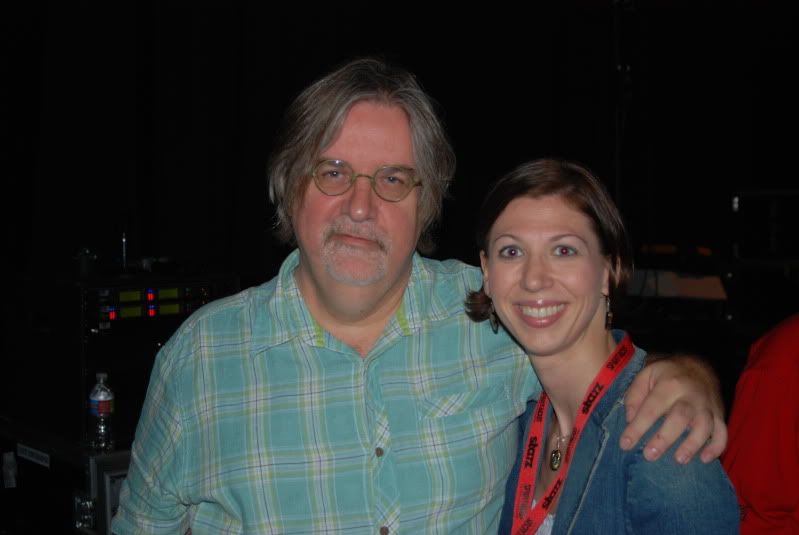
By this point of Comic-Con, the journalists and media covering the event are running mostly on coffee, adrenaline and the never-ending desire to get sleep… someday. After three straight days of virtually no sleep, wall to wall coverage, running the marathon to get from one end of the Convention Center to the other, all while dodging nerds and egregious violations of personal space, you might be wondering what the atmosphere is like by now in the press rooms? Pretty darned silly! Check it out:
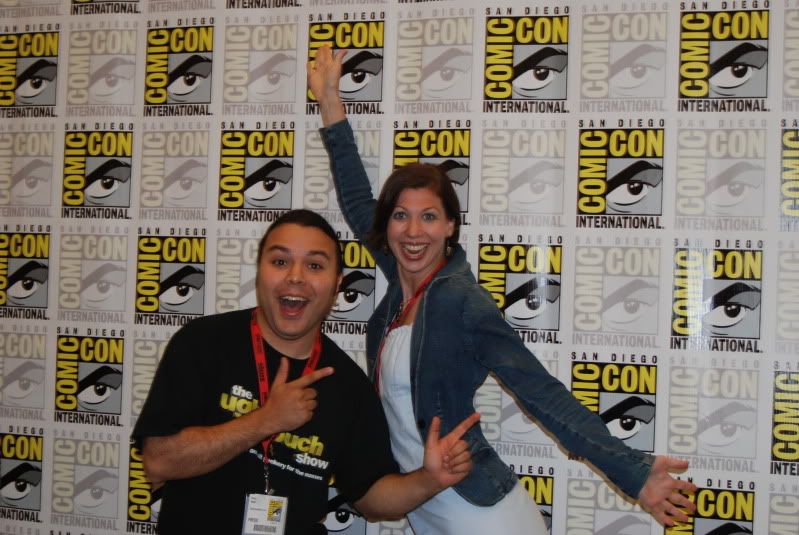
From the Press Room: Fringe
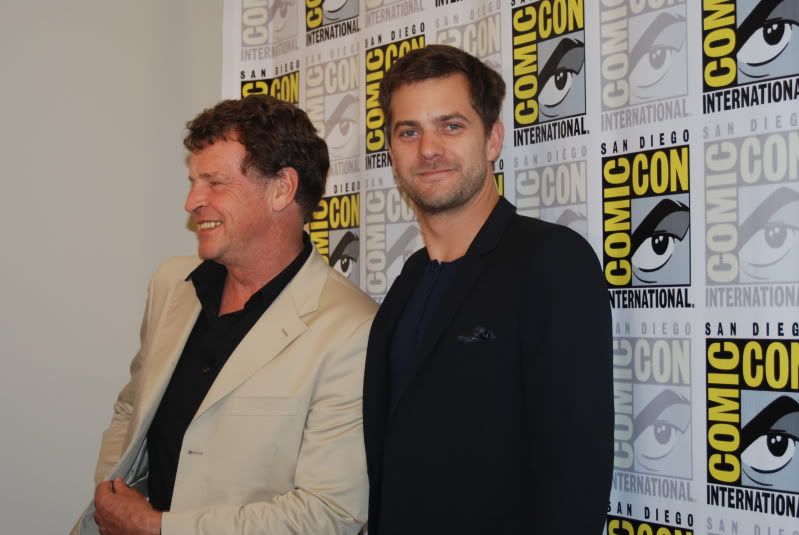
Roberto Orci, Alex Kurtzman, Jeff Pinker (series showrunners)
[ScriptPhD note: please forgive us for not delineating between the three showrunners for this particular part of the interview—they had to move very quickly from table to table, and it was tough for us to tell the voices apart in transcription. Thanks for understanding!]
Press question: How is the rewriting going? There was a whole conversation about it at the Paley Television Festival.
Showrunners: It’s going really well. We now know what the show is to a much greater degree. In a first season show, you’re really trying to find it, you’re trying to find the voice, trying to find what works and what doesn’t work, and like most shows that I’ve been associated with, the characters and the actors playing them start to become more one. And it’s a much easier time for writers who are joining the second season. The learning curve is much steeper. And they learn much faster. And they’re working out great. We’re just having fun with it.
Press question: Is there a plan for this season? Have you guys all sat down and…
Showrunners: We have a plot arc, a plan for this season, we have characters arcs planned for the season, and beyond.
I think in general, we’re much better prepared this season than we were last season. I think it’s hard for any show on earth, you’re in the first season, you’re finding your feet. So I think it’s a major improvement for us: what works on the show, what is the balance between the A story and the B story, which characters do better in what storylines? And it’s really a trial by fire. And hopefully if things are going well, by the end of the first season, everything slots into place. And that really happened. I think we all tangibly felt by the end of the first season that the show had really found its stride.
Press question: So when you’re plottig time for the show, what are the terms that you’re using for the different worlds?
Showrunners: We say our reality and the other reality.
ScriptPhD: Do you guys mind if I ask you a sciencey question?
Showrunners: As long as you don’t embarrass us! [laugher]
ScriptPhD: Promise. I represent ScriptPhD.com, we’re one of the few sites that covers science in entertainment. Really enjoyed the panel with your writers and your science advisor Ricardo Gil de Costa. He talked a little bit about his role, and I wanted to get the reverse, straight from the horses mouths.
Showrunners: Which one of us is the horse in that equation?
ScriptPhD: It’s just a saying!
Showrunners: It’s a collective horse.
ScriptPhD: It’s a collective horse, a proverbial horse. Tell me a little bit about how you use Ricardo’s expertise, and how that works in the mix of the science that you approach and obviously you are entertaining first and foremost?
Showrunners: We are entertaining first and foremost. We made a rule very early on that our show would not have aliens. Because The X-Files had done that so well. And we made another rule that all the science would be plausible, based on the science that’s currently accepted or at least proto-science. So the stories come from two different directions. One, we’ll come up with an idea that we really love and we’ll say, well, make the science work. Or, we’ll start with the science and ask where the story is in this.
ScriptPhD: And what role will Ricardo play in this process? How will you use his expertise?
Showrunners: Basically, it’s educating us about the language of the science, that we can rip creatively on it. You want to use the terms that are—we cheated, we tried to make it evocative and creative. So we’ll start with an actual article, actual reasearch, actual cases, and let that inspire us. As opposed to making stuff up. Everything that you’ve seen on the show has had some article that was the basis of it. You can see on any mainstream website or news outlet, the science and technology section has some very strange stories. It used to be that you really had to search these things out. And now you really can look at mainstream science and be inspired to imagine this really great stuff.
Press question: One of the things that makes it really successful is the science. Some people have asked about the romance, which for me personally is a bit too soon. In the second season, where are we on the Peter/Olivia romance?
Showrunners: I think we’re in a place where—I assume you’re talking about Josh and Anna—they’re more familiar. It’s more brotherly and sisterly right now and more of a caretaking role. As we go into the second season, our stories are starting to be driven by the characters as opposed to outside in. And if you saw our season finale, Olivia ended up in the other universe, and she’s going to come back, and there’s going to be consequences of what’s been done to her and what’s been happening to her. And she, in many ways, is going to become affected by the cases and this world. And he’s going to have to take more of a caretaker role towards her. It’s also very important for all of us that in doing a romance, you have to buy it. The characters have to organically get to a place where you would believe it. As opposed to forcing them together just to do it. Olivia’s character has so many walls. She was in love with someone who burned her badly, so she’s going to be very unwilling to trust again. And Peter has his own issues too. So I think if we do it, we really want it to happen organically, so that the fans buy it.
J.H. Wyman (writer/co-executive producer)
J.H. Wyman: Well, I’m the showrunner, with Jeff Pinkner, just so you know.
ScriptPhD: With Peter, how much are you going to go into the two realities. This reality versus the other reality? And where are you going to go with that?
JW: I can say that Peter is actually going to learn a lot of things about his existence, who he is, what’s going on, we’re going to delve into many things that will bang Peter out as a character. And make him the hero I think he wants to become. That’s all I can say about it.
ScriptPhD: But you are eventually taking us on a path where we’re going to learn about all of this?
JW: Look, you watch the program so you know that there’s enough answers in there to—I mean, it’s amazing the theories that people will come up with. It’s really quite wonderful. But yes, we’re definitely going to be able to delve into that and talk more about what we’re investigating in Fringe.
Press question: So we know there was this other reality Peter. Well, we think so. Is there another reality massive dymanic that enriches the world? Are we going to learn more about that?
JW: I would say that’s an interesting theory. I don’t mean to sound cagey about it. I think there are certain things the fans are trying to work out and figure out and the direction that we’re going down right now absolutely follows that line of thinking. But I don’t want to be cagey about what you’re going to see, but I promise it will really play your mind, because it does mine. It’s fun, you know? Really fun!
Press question: Any clues?
JW: Let’s talk about how the show is different, and there’s so many clues in that. Let’s talk about why it’s Fringe 2.0 instead of the original, and why it’s getting better I think.
Press question: So we know there’s not going to be aliens, what other things can we expect that we haven’t seen yet, as far as the fantasy and science fiction minus the aliens?
JW: It’s funny you should say that, because we literally made a whole—you know at the beginning, there’s the words, and we’ve done most of those words. Now, we’ve come up with a whole bunch of words—there’s many things beyond alien that you’re going to see that will frighten you and hopefully make you think science is dangerously out of control. But what’s really important, and the key to the characters and what’s happening this year, and why the show is different this year as opposed to last year, is that we’re actually—I would consider the first season a prologue, that’s my take on it. Here’s the show, here’s what you’re going to be doing with it, here’s the things that are happening, science is out of control, much more advanced than you would even imagine, here are the characters and the players. Now the second season is: let’s get involved into these people’s lives. And I think that that is the key to all the questions that you were asking. You’re going to fall in love with it. Like this year, Walter’s emancipation. He’s going to come out and come into his own and Peter’s going to have to let him, it’s really delicious stuff you know? Olivia’s going to start to develop in her own way, Peter in his own way, things that you never imagined you’d get to spend time with them, like last year in their houses and this year you will.
ScriptPhD: Like the relationship between Walter and Peter will develop.
JW: Oh, that’s one of my favorite things, yeah!
ScriptPhD: I really love that part of the show!
JW: I’m so glad you say that because it’s a big part. Yeah.
Press question: You just started shooting in Vancouver, just like another show, Supernatural. Can you talk about what that’s been like?
JW: We were in New York, and just cost-efficiency wise, we brought it to Vancouver. They allowed us to do much more. Because our money goes further, because of the Canadian dollar, and the production value goes up. The things that we’re planning to do this year really do take a certain amount of finance and fiscal responsibility to be able to do, so we figure we can definitely get much more money to do them. And we’re ecstatic. It was a smooth move, all our keys are still with us, and we found great people there, the nicest people ever. You can’t imagine. You go there and they’re just the sweetest people.
Press question: How much does the fans’ reaction to the show influence you in writing it?
JW: A lot. For me. I did read what they said about Season 1, going into Season 2. Because you have your own perceptions as a writer. You look at it and you’re going, “This is the story that I’m compelled by. I love the science and I love all that stuff, but what do I like?” And then when you start to write from that spot, you start to realize, oh when I’m really telling the truth, everybody responds. And people seem to pick up on the smallest little things. So I say, “Oh, everybody loves Walter in this! Oh, they love that moment.” And you realize that that’s something that you wanted to investigate so let’s do that. And I’m always looking at what they have to say, because that’s why we’re doing this, is so people can discover the program. And I still think not enough people have. And it’s really something, what the show is. The more that I can hear from the viewer, the more that I can do my job. Because, it’s not to write for them, but they’re a parter of sorts. I don’t want to write a show that fifteen people watch.
ScriptPhD: That’s really refreshing, because there are other showrunners [no names shall be mentioned ?] that are like, it’s my vision, it’s my show…
JW: No, no, no. I’m much more secure than that! I certainly have a vision…
ScriptPhD: I’m just amazed, because I’m a fan and a journalist and it’s really refreshing to me that when I watch the show, I know there’s a symbiotic existence between you and your fans, and a synergy there to make the show possible, and I think that’s just terrific.
JW: I did a very small program in the UK called “Key and Eddy”, a show in London. And I did it in 2001, and I still get people calling and asking what I was thinking for the rest of the show, because it only ran 13 episodes. And it left kind of a big question mark. It was very much ahead of its time. They still email and call and say this or that, there’s a whole movement, and they’re there. And it’s so hard these days to find time for appointment television, and the point is that when you’re asking someone in this busy time to commit to your show, the five minutes that they have in their day, I want them to feel like they are appreciated.
Anna Torv (Olivia Dunham)
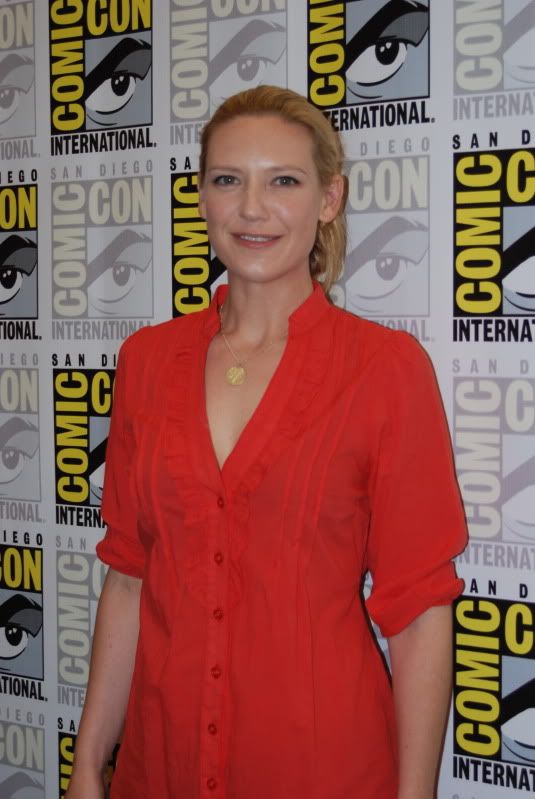
Press question: Do we get to see more of your superpowers next season?
Anna Torv: I know for sure that we will.
Press question: Are they going to have a darkness to them?
AT: Oh I hope so! I want Olivia to get darker, I think. I kind of like the dark Olivia the most. I like the episodes where something personal has happened to her, like when she was taken and had her spinal tap and she came out and she was ready to kill someone. Or when she was killing people in her sleep. I like her darker.
Press question: How long have you been living in the United States, and have you been hanging out with any of the other Australian actors here?
AT: I didn’t live in the States at all until I did the show, so I’d been over and visited a little bit, and had met with agents to see if I could get representation, but I never lived here until I moved to New York for the show. I moved over a year ago. I don’t know any of the other actors, I missed out on all of that, because we were based in New York. I heard that they have all these barbecues and things like that.
Press question: So is Australia still home for you?
AT: Yeah. I go back every break I get. I love Australia!
Press question: Do you get used to the hectic, frantic work schedule a show like this requires?
AT: Yes, I think you just do get used to it. And it’s—I love it when I get to do physical stuff, which I don’t get to do a lot of, actually. I think it looks like I get to do more than I actually do. But really, I don’t get to do that much! No, I’d like to do more of that, sure!
Press question: How are the scenes shot with Leonard Nimoy at the end of last season going to play into this season?
AT: No, I do know, but I can’t tell you. But you do get to find out. So you do eventually see the rest of that scene, but in a really cool way, actually.
Press question: Do you have anything that’s happened to you like that in your past like Olivia, from your childhood?
AT: You know, someone just asked me that! No, there’s nothing that I can think of! I’m sure if I really thought about it, but no.
Press question: Can you talk a bit about your hobbies and lifestyles and what you like to do?
AT: When I’m not working! [laughs] Well, I’m from Australia, so I surf, and I grew up near the beach and we always had horses. I love riding horses! I keep trying to get them to do something where Olivia gets to go jumping or something. I don’t know, I hang out. I’m a homebody.
ScriptPhD: Are you excited about where Olivia’s relationship with Peter is going, and can you talk about working with Joshua and your guys’s dynamic?
AT: Well I know! Everyone keeps saying what’s going to happen with Peter and Olivia? And I’m like, “Did you watch the first season? He started picking up my sister!” I’m not sure where I want them to go. I just read an episode that we haven’t started shooting yet, we’re about to start shooting next week, and Olivia starts to see Peter a little bit differently. And I think it’s kind of fun! I can’t say anything more. That’s it!
Press question: Can you talk about being glamorous on the show and yet, still playing a strong woman character?
AT: I don’t know, I think they don’t write her glamorous, but we’ve always been—like when we started with the pilot, we were always adamant that it’s TV, so nothing’s really realistic, but you can do your best. Like she doesn’t wear a lot of lipstick and I don’t know. You do what you can.
Press question: What have you loved about her vulnerability aside from a lot of the action that you’ve gotten to see?
AT: I love the episode where she dreams, which was where she starts having these dreams where she’s killing these people and then she finds out. I love that because I thought it was a really beautifully written episode, and I thought it was one of my favorite bits of Fringe, and I personally loved the shadowy, secretive, dark, what’s going on stuff. It also was where she found out about the early experiments and Walter did that to her. I loved that because through a lot of the first season, I felt like there wasn’t a real personal connection with Olivia and Walter and now, all of a sudden, there’s something there beyond just what we were experimenting on.
Press question: And will that come into play this season?
AT: We haven’t gone back to it as intensely as we did at the end of the last season, but it’s definitely still there and I think it will pop up again.
Press question: Is there an awkwardness to your and Peter’s relationship now when you’re working on cases because you know that?
AT: Sometimes, yeah. Sometimes.
Jasika Nicole (Astrid Farnsworth)
Press question: I heard rumors that we are going to see more of Astrid in the season to come?
Jasika Nicole: If you heard it, and I heard it, it must be true! Astrid, you’ll get to see a softer side of Astrid. She was often the person put up against Walter because they were so different—the young, the old, the new technology versus the old, book-savviness and everything. So we would have these funny quips, but she’s more than just that. I think that her purpose, at least in this season, is more than just providing some comic relief and one-line quips. And so she has this really fantastic scene that we filmed the other day with Walter where you get to see their personal relationship. You get to see why they click and work so well together. It’s not because she rolls her eyes at him all the time. Which she does, that’s certainly a part of her, but she’s also much deeper than that. I’m hoping that you get to see more than that—her connecting emotionally with the other characters on the team.
Press question: let me just say this. It is so great to have a person of color have such a smart and intelligent role. You don’t see that on television—
JN: And how!
ScriptPhD: And that it’s not a big deal! It’s just a part of who she is, but it doesn’t have anything to do with her abilities.
JN: Yeah, totally! It’s like, “You got into college?!”
Press question: What are we going to find out about Astrid’s history and how she got to the place she is?
JN: You know, these are all questions that I don’t have answers to, and I’m hoping that they do get answered at some point. I want to know why she decided to become an FBI agent and where did she come from and I want to know those things. I wish I could say for sure that yes, it’s going to happen, but I will say that we have brought another person into the Fringe world. Her name is Megan Markel, and she plays an FBI agent, and she is also bi-racial. Let’s talk about that. It’s awesome! And I was so excited, because it wasn’t like, “Oh we can only have one. Oh we can’t have more than this one actress.” Like you said, it was no big deal. Here’s this gorgeous woman on the show, and she’s really, really smart too, and she’s an FBI agent, it’s just awesome.
Press question: I think it’s great to have people like you on the show, because science and technology are becoming so wide-spread and it’s a wide demographic, it’s great to show that anyone can really be a part of this world. What integrated storylines can you talk about given what you’ve already shot?
JN: Thank you so much. With this new character, and I can’t speak about her too much, obviously, but we’re actually going to start talking about the aspect of religion, and how you balance that out with science, which has kind of been a battle of ideologies for a really long time. So we start to address that in this season. We’ve only completed three episodes, so we don’t know how far it’s going to go, but I really like it, because it’s really exciting! What do you do with your faith that you have grown up with and is a huge part of you, and then how do you combat that against these things that are happening and all this death and destruction? You hear that someone is in charge of it and it’s not the God that you’re familiar with, so I think that’s a really cool thing that we’re starting to incorporate into this season. I have no idea where it’s going to go.
ScriptPhD: Reading the scripts and seeing the science material, do you ever just geek out? Normally as an actor, normally you don’t get to do stuff that’s this heavy and technical. Do you ever just get to thinking about some of the issues that the show raises and it bleeds into your own consciousness?
JN: Absolutely! Oh yeah! I do a lot of Googling, because there’s a lot of words that I am completely unfamiliar with. Like, “I don’t know WHAT that is!” But I think I’m most intrigued by the idea of there being this other universe because what they’re saying with that is that as a person, you make decisions in your life, you have all these choices, and you make a decision. But you can also make the decision that you didn’t make, and so there is a world in which you exist where you made that decision. And a world where you exist and you made this decision. So it might not even be one parallel universe, it could just be tons and tons of them for every single choice that you made that is not this one, but it was that one. Which is kind of like looking through a mirror—it just goes on forever and ever! And you think about what kind of person you would be. And I guess that at some opportunity, they’re going to get to meet themselves and see what kind of person they would be if they did this and that. I made that up, I don’t know if that’s true.
Press question: Can you talk about your work schedule, given that your character doesn’t appear all the time?
JN: I think most people are pretty jealous of me. I have kind of the perfect schedule—I come in and I work for maybe two days a week, and then I just… have the rest of my time to myself. And that’s been super-important since we moved to Vancouver. We’re in this new city, and we want to explore, and see what Vancouver has to offer. I got a bike, I can ride around. It’s been a nice transition for me, because if I had been like Olivia’s character, and thrust into this situation that was completely foreign to me, and then having to work 15, 16 hours every single day for 10 months, that has really got to make you a bit loopy. And I didn’t have to deal with that. I just had to deal with my own loopiness that I had from the beginning.
Press question: When did it finally dawn on you that you had a successful show and that this was real?
JN: You know what I think it was? I think it was when the observers started showing up in real life and not on the show, and I was like, “OK, they’re trying to make this like a brand, kind of.” He’s at this game, at NASCAR, and it didn’t have anything to do with the show, they would just be filming him and putting him out there to promote this whole idea. And I thought that was kind of huge and really neat! Maybe next, we’ll have Afro wigs [to promote the show].
ScriptPhD: This is kind of your first big break-out role. Is it weird for you when people recognize you?
JN: It’s weird. But you know, no one creepy or scary or anything has come up to me. It’s only been the nicest, sweetest, most complimentary people. So it’s weird to be recognized, but then you have this really awesome conversation and they tell you their theories about the show, and you tell them yours, and then you part ways. It’s great. It hasn’t interfered in a negative way at all, which is great.
Joshua Jackson (Peter Bishop)
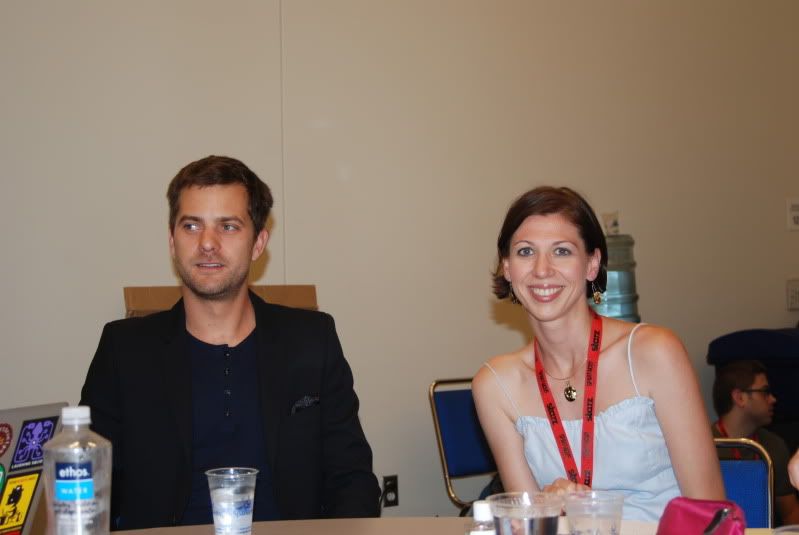
Press question: How has the move to Vancouver to shoot the show affected you?
Joshua Jackson: Well, Vancouver is my hometown, so in its way, it’s moving home for me. Personally, it’s actually not difficult at all. Inevitably, it changes the urban-ness of the show. It doesn’t change the urban nature of the show, but the West Coast of Canada is very different than Brooklyn, which is where we shot most of Season 1. So that changes a bit. There’s a certain bittersweetness—and this is all behind the camera stuff—eventually the television becomes the people who make it. Moreso even than the actors or the writers. It becomes a machine, and the cogs of the machine are all of us sort of doing our bit and putting in. And to move the show, we had to lose 100 people, 140 people actually, who were employed on our show. So there’s a certain degree of bittersweetness, because without their hard work, we don’t get to Season 2. And in a just world, you don’t repay that hard work with a pink slip. So I feel a bit guilty that I’m going home and that’s fine for me, because for other people that is not fine for them.
Press question: Is it still home for you, in a sense, or have things changed since you’ve been away?
JJ: Have you ever been to Vancouver? Nobody leaves Vancouver. It’s paradise. It wasn’t until I moved to North Carolina, and was in a discussion with somebody who will remain nameless because I don’t want to bag on her hometown, but it wasn’t until I moved to NC and started working with somebody and they said, “God I’m so happy to be away from home!” that I realized some people don’t like where they grew up. Vancouver is paradise! It’s a perfect, perfect place, especially if you’re an outdoorsy person. It’s heaven, so…
Press question: But it’s been getting bad press about the drug wars at the moment, no?
JJ: [laughs] Yeah, I know. Have you been in downtown LA? East Hastings is a legitimately bad neighborhood. It’s on par with any of the worst neighborhoods that I’ve been in anywhere on the planet. But if you’re not a moron, you’re probably not going to get involved in a drug shootout. Or if you’re not an addict. So there are many ways to not get involved in a drug war between the Triads and the Hell’s Angels.
Press question: To get away from the real world and to get back into our favorite virtual world [laughter], we started to see Peter bringing in a bit of his underground connections, his underground connections for the end of last season, so are we going to see more of that next season, or is it more of you using your heightened superpower?
JJ: Sha-na-na-na-na-na! I think we spent the better part of the first season why it was specifically that Olivia Dunham needed to be the leader of the Fringe world. What we didn’t do—we talked about it, we hinted at it—but we never really saw what Peter was outside of this world, because we never visit him outside of this world. He’s always assisting and investigating hits. Then, you get to the end of the first season, and Peter becomes invested in this world. And now he starts to use his powers for good rather than evil. And, he starts to invest this very shady knowledge that he has and his personal immorality. He doesn’t have a moral attachment to things being good or bad. He is presented with a problem, he comes up with a solution, it doesn’t really matter if he breaks some eggs along the way. And I think he’s sort of figuring out his humanity as the second season is going on.
Press question: Can you talk about Peter’s relationship with Walter and how will that be developed?
JJ: Well, for myself, and I say this as an actor and not a person on the show, for Josh the actor, the most important relationship on the show to nurture and maintain is the Walter-Peter relationship. John Bishop and I spent a lot of time talking about where we are in the season, and pushing and pulling, and John is an endlessly inventive guy. And we work well together. So there’s always this state of play on set. That being said, that huge reveal about Peter not being one of us at the end of the first season is inevitably going to lead to a breakup. So until the breakup, I think you want to see these guys become closer and closer and more and more into a healthy father/son relationship and then poof.
ScriptPhD: Josh, can you talk about when you first got the material. This is very different from work you’ve done in the past, especially with the science. Talk about how you reacted viscerally to the show when you first got the script, and what about this really drew an appeal for you as an actor?
JJ: Well, the initial script, which I guess isn’t too surprising given who the writers were, read much more like a film than a television show. It was a two-hour pilot, so it was long, but incredibly in-depth, and with all of these multi-layered story points where things were not as they seemed and I just thought it was really well-done and well tought-out. And having worked in television before you also have to see how this idea behind the pilot could spin out 40, 60, 80 to 100 other ideas that could be interesting. And I think this group of guys has a pretty good track record with being able to do that. And I’m a sci-fi head, so…
ScriptPhD: You are? How cool!
JJ: Yeah!
That’s right folks, you heard it here. Joshua Jackson is a sci-fi geek. See? Science is awesome!
True Blood
Moderator: Kate Hahn (TV Guide)
Panelists: Anna Paquin (Sookie Stackhouse), Stephen Moyer (Bill Compton), Alan Ball (creator/executive producer), Nelsan Ellis (Lafayette Reynolds), Rutina Wesley (Tara Thornton), Sam Tremmell (Sam Merlotte), Michelle Forbes (Maryann Forrester), Alexander Skarsgard (Eric Northman) and Deborah Ann Wolf (Jessica Hamby) and Charlaine Harris (author)
Kate Hahn: I want to introduce myself. I’m a writer for TV Guide, and I’ve worked with Alan and the cast quite a bit, I worked with them for the TV Guide cover story and am thrilled to be here. We are going to kick off tonight with very special announcement from Alan Ball.
Alan holds up True Blood: The Drink to wild applause from the audience.
Alan Ball: True Blood: The Drink is a reality now. Those of you here at the panel last year know that it’s a very specific makeup. We couldn’t make up synthetic blood, so instead we used a nice mixture of Chateau La Feet Rotschild with blood of hemophiliac royalty, Viagra, Vicodin and vodka. …and ecstasy. Unfortunately it’s illegal. All kidding aside, though, there is a True Blood drink available September 10th. And it’s basically blood orange soda from all-natural ingredients. Just in time for Season 2 of True Blood.
Kate Hahn: Anna, Sookie has gotten in a lot of jeopardy and will be in more trouble as Season 2 progresses. How has she changed this season?
Anna Paquin: After last season, she is stronger, tougher, she’s been through a lot, she’s grown up quickly, and she tends to get herself involved in situations she can’t control, in which case it is good to have a vampire boyfriend. As far as portraying her, I’m just trying to imagine going through that in two weeks, and find myself in these situations. But that’s my job.
Kate Hahn: Stephen, Sookie’s being admired by multiple vampires. Hypothetically speaking, if something were to happen between Eric and Sookie, how would Bill respond?
Stephen Moyer: It’s hard to get away from that rangy Swede at the end of the table, but I’m not sure Bill would roll over and just let it happen. He’ll fight his hardest and not be quite as polite as he’s been up to this point.
Kate Hahn: We’ve seen really big changes with Tara. What is your take on how she’s changed as more of her softer side has come out?
Rutina Wesley: I like playing the softer side of her to show her vulnerability. I call her a hard flower, because of the fact that she’s so tough on the outside but has this really soft inside, and I think it’s nice for everyone to see that part of her. She wasn’t taken care of before growing up, and this season she’s being taken care of by Mary Ann which is a nice change for her.
Kate Hahn: Alan, there is lots of action in second half of season based on the preview we just saw. How do you balance all the action and the emotions of this show?
Alan Ball: I make a joke about a sign we should have in our writers room that says “It’s about the emotions stupid”. Without that, all the action and other craziness wouldn’t have a heart and soul. So, we just work really hard to always remember who these characters are, what their passions are, what they need and are fighting for so that the other stuff has an emotional foundation. It’s one of the reason I responded so well to the books, do the same thing on the show.
Kate Hahn: Mary Anne is the source of a lot action on the show. Michelle, the fans here know you from other shows in the sci-fi genre, wher eyou have portrayed powerful women. Why does this genre in particular lend itself to these women and these characters?
Michelle Forbes: I think ultimately sci-fi as a genre offers lots of freedom to see a future [where gender is irrelevant], and I spoke about this with Mary McDonnell a lot on BSG, she’s a goddess by the way, sci-fi takes cliches out of our minds and we’re able to have a lot of freedom of thought. It’s a forgiving genre, and especially on our show, grounded in emotions. True Blood is creating an entirely new love for these genres.
Kate Hahn: Nelsan, everyone loves Lafayette. [wild cheers] But Lafayette is having some post tramatic distress disorder these days, he’s having quite a time with what has happened. How has his worldview changed since the basement incident?
Nelsan Ellis: His hustle is supreme, but in this case, he’s figured out it won’t work for him to get him out of the situation, so he’s definitely rethinking his hustle and might stop doing it. But we’ll see.
Kate Hahn: Charlaine, you and I have talked before, and something that came up was your reaction to seeing your novels visually on the show. You said “When I first saw True Blood, I had to cover eyes about some scenes.” Can you elaborate on that?
Charlaine Harris: HBO sent me a copy before premeiere, and watching some of the scenes, I went “Ahhh!” And then I called my husband and said, “Honey we’re gonna have to move.”
Kate Hahn: Sam, we’ve talked about how your character has been unlucky in love, and he has a lot in common with Daphne, but things may not be going well between the two of them. Is he gonna finally find a nice girl?
Sam Tremmell: Well, he gets a bit lucky with Daphne. He’s a magnet for abuse this year, he’s just trying to get by. His journey this year and in years to come, is really sparked by his meeting with Daphne and what she teaches him. He has to decide whether he regrets it.
Kate Hahn: Deborah, this is your first big gig in the industry. You’re not that far out of USC. And you’ve mentioned that this cast has been helpful in the transition. What scene have they helped you with in mentoring, if you can remember one in particular?
Deborah Ann Wolf: I tend to be a nervous person in general, and am actually nervous right now, so just know that I’m picturing you all in your underwear. But I remember shooting Episode 4 and I was really sick with a 104 temperature and no voice. I felt like a total failure in terms of disappointing Alan with my performance, and was doing a scene with Steve and Anna and Jim. They said “Don’t worry, you can be quiet during our sides”, and I somehow managed to squeeze it out. Their moral support helped me through. [Collective audience awwwwww]
Kate Hahn: Alex, Eric is smitten with Sookie, but no matter what happens he’s drawn to her. Why?
Alexander Skarsgard: Well look at her! I’m sorry Stephen. Eric’s been around for a long time, 1000 years. He’s gotten to the point where he’s kind of over humanity by now. He’s seen it all. He thinks humans are pathetic and naïve and yet, despite that, there’s something different about her but he can’t put his finger on what excites him. He’s curious, and of course, he wants to explain that and see what happens.
Fan: Charlaine, will season 2 affect the plots of the Sookie novels?
Charlaine Harris: I just signed a contract for three more Sookie books, so that will give us up to 2014. I don’t think I’m affected by the show because those are past books that they’re plotting from. And I’m way beyond that now, things have really changed in the plot. Eric’s got a different maker from the maker on the show. But I hope you see that as a different opportunity for two entertainment experiences.
Fan: Alexander, your character’s gone from dark to vulnerable. How has that come about and will it continue?
Alexander Skarsgard: Well, at the beginning he’s just in one little sequence on the show, his is not really a huge part, he’s just the evil vampire leader and then takes it back into the dark. I always had to defend him, that he really does have a good side to him. But season 2 has actually been great because I’ve gotten to show that. He is a bad ass, but I’m just happy to get to do different layers and go deeper and show there’s more to the character than that. He doesn’t care for a lot of people and a lot of vampires either. The ones he cares about he’s very loyal to.
Fan: For Season 3, what are you excited to do?
Alan Ball: I’m just looking forward to the fact that there is a Season 3. Partially because I just love working on the show so much. I’m excited to start exploring some of my favorite parts of the book. We have wherewolves for the first time. I’m definitely interested in Russel Edgington and the Mississippi vampires. Debbie Pelt, I think she’s kind of awesome. I can’t put Bubba into the show without it being cheesy, though, because you could never have the real Elvis.
Fan: Alan and Alex. Pink spandex. Yes or no?
Alex Skarsgaard pulls up his pants to reveal that he’s wearing a pair. Wild cheers from audience.
Alan Ball: I’d planned not to, but maybe you’ve changed my mind.
Fan: Based on the preview we just saw, was it me or was that blond hair behind Sookie?
Alan Ball: I have no idea what you’re talking about.
Fan: Alex, what’s it like to go from the entertainment industry in Sweden to America?
Alexander Skarsgard: If this was in Sweden this would be in a barn with 35 people and about 25 of them would be named Skarsgaard.
Fan: Alan, how you make musical choices for credits?
Alan Ball: “Bad Things” by Jason Everett that was a placeholder for the temporary title credits we’d made for HBO, and I didn’t know that song very well, I just randomly picked whatever country western tune I could find through iTunes. And later on, when we were constructing the credits, we wanted to use a different song, but when we went back, nothing ever worked as well as his song. For the end credits, we work with a music supervisor named Gary Calamar who also worked on Six Feet Under, and he brings us interesting choices. Sometimes a writer will put a choice in the script, other times we can’t use it because of money, other times Gary brings other options. Ultimately we try to pick what is appropriate with lyrics and what works musically for the emotion that it sells.
Fan: Sam and Regina, what about a rekindling of flames for your characters?
Sam Tremmell: I’d be excited about that.
Fan: Stephen, you will always be my Prince Valiant. Do you have any other projects going on right now?
Stephen Moyer: Thanks for Prince valiant reference. What she’s referring to is that I had to have a ridiculous mullet in 1997, and ride around on crocodiles. I’ve got a movie called Tribes of October, and I’m waiting to finalize that, and I’m doing a British film called Flutter about gambling.
Fan: What aspect of your character do you like and dislike the most?
Anna Paquin: What do I like about Sookie? I like that she says what she’s thinking, I admire that. She jumps in and gets involved even though it gets her into trouble. She means well. What do I not like? Well, if she’d been written as an unnatural blonde, I would have nice dark roots and my hair wouldn’t be shorter due to all the split ends, because I’m a very fake blonde. But other than that, Sookie and I get along great.
Fan: Will the love triangle between Eric, Sookie and Bill play out on screen as in the books?
Alan Ball: Yes.
Fan: Has any aspect of the portrayal of your character been influenced by the books?
Anna Paquin: I read them rabidly leadig up to my audition, as I wanted to know as much as I could to prepare myself for playing the character. I felt that the Sookie on the page in the script was like the Sookie in the books. It’s hard to unmarry the two. But ultimately the portrayal comes down to my interpretation and the directors and their input.
Alexander Skarsgard: I read the first five books to learn about the characters, but at some point you need to take control of the characters and leave the books behind you. We have a path and we stick to it but it’s certainly nice to get background information.
Stephen Moyer: One thing about our writers that is incredible, every time they see you play something that works, they think, “Well, if that worked so well, what if we put them in a completely different place and see what happens?” If we’ve seen them react to this, how do we see them reat to that? And it becomes more complex to play the role.
Fan: Will Jessica be more of a handful for Bill?
Deborah Ann Wolf: As much as they’ll let me.
Fan: Alan and Alex. Talk a little bit about the dynamic between Eric and Lafayett and Eric and Goddard.
Alan Ball: Obviously they’re gay lovers and spend the summer together in Fire Island. Eric and Lafayette. Their relationship is one of fear by Lafayette towards Eric for good reason, whereas Eric is intrigued by Lafayette may have plans for him in the future. Eric looks at Godrick as Godrick talks about them: father, brother, son. He is the most important person in Erik’s life, he’s known him ever since he was born as a vampire, so there’s tremendous love there. And it’s not necessarily romantic. The relationship between a vampire and his maker is deep, you can’t really understand it.
Alexander Skarsgard: That has been fun to shoot, because up until that point, Eric has been an entrepreneur, but this was on a personal level for him, going to Dallas for love and has nothing else to gain.
Fan: Question for the vampires on the panel. Anyone ever have a fang malfunction during shooting?
Deborah Ann Wolf: Well I’ll tell you, the hard ones stay in well, but the rubber ones fall out easily, so it’s kind of tough to be cool when you’re immortal.
Stephen Moyer: I spent the first two months with indentations in my mouth because the hard ones are really sharp.
Rutina Wesley: Yes, they are. [audience laughter]
Fan: Are you going to keep Jessica as a rebellious teenager or let her grow up a bit?
Alan Ball: One great thing about an extended series, you don’t have to define a character in the same place, they can grow up. I hope the series has a long life. I hope to keep everyone in their basic character as they grow. But you can expect evolution in the characters.
Fan: Deborah, is Jessica going to have a love interest?
Deborah Ann Wolf: I hope so.
Fan: Alan, will you ever have a one half vampire/human combinaton? Like a hybrid baby? [Loud boos from audience.]
Alan Ball: What? A one half vampire baby? No! In our show, they’re either full on vampires or they’re not vampires.
Fan: Charlaine, where do you get your inspiration for your books?
Charlaine Harris: I was gonna say the tabloids. Inspiration is a word I don’t trust. Writing is work and what I do is work. Some days I pull my own hair for ideas, and you wouldn’t want to be around me then. It’s just that the work takes places in my head. My contract has a deadline and if I waited for inspiration, my editor would be pretty mad at me. So I just flex my fingers and I say, “Who’s coming to Sookie’s house today?”
Fan: Charlene and Alan, what kind of demographics make the show a success?
Charlaine Harris: We aimed for an adult audience and I think we’ve hit that target.
Alan Ball: One of the great things about the beginning of the show before it had aired, HBO had tested the pilot, and it tested really high with adults of all sorts. The women love the romance and the men love the sex and violence. And since the show has aired, we have learned that it really does have wide appeal. There is a really large audience for this show. It goes across a huge spectrum.
Fan: How do you feel True Blood has impacted your career?
Alan Ball: It ruined it. I’m dead in Hollywood. It’s been really positive. But I tend not to focus on that aspect of it. This is the most fun I’ve had in a job. It’s a lot of good people, very talented, everyone is onboard to making the show as good as it can be and watching it. I’m the luckiest guy on earth.
Fan: Charlene, how involved are you in the series?
Charlaine Harris: Alan and I have a working relationship. I don’t tell him how to make the show, he doesn’t tell me how to write the books.
Fan: Michelle, what attracted you to the role?
Michelle Forbes: Any time you’re offered an entrance where you’re standing naked in the middle of the road naked with a pig, you don’t say no.
Fan: Any hilarious experience during filming?
Nelsan Ellis: Oh, so many. One episode in the future features a dancing naked dude who is 300 pounds. That was pretty hilarious. There’s one take where he fell. That was hilarous.
Fan: Charlaine, with regards to vampire blood, what’s the difference between doing V and drinking the blood.
Charlaine Harris: The age of the blood. V is from a younger vampire. Getting it from the vampire is always a much better experience.
Fan: Alex and Steven, are ou ever going to counter Godrick in a season?
Both: Yes.
It was great fun to watch the True Blook panel backstage and chat a bit with the stars of the show (Michelle Forbes, in particular, was a delight, and the ScriptPhD is a huge fan of her work on In Treatment), but the unquestioned, indesputable highlight of Comic-Con for me? Meeting and chatting with my screenwriting hero, Academy and Emmy Award winner Alan Ball. From American Beauty to the masterpiece that is Six Feet Under, Alan has redefined the cinematic experience on the big and small screen, and challenged his audience to engage in a deeper level of thinking and processing his material. Thanks, Alan, for being so very gracious and stopping by my way.
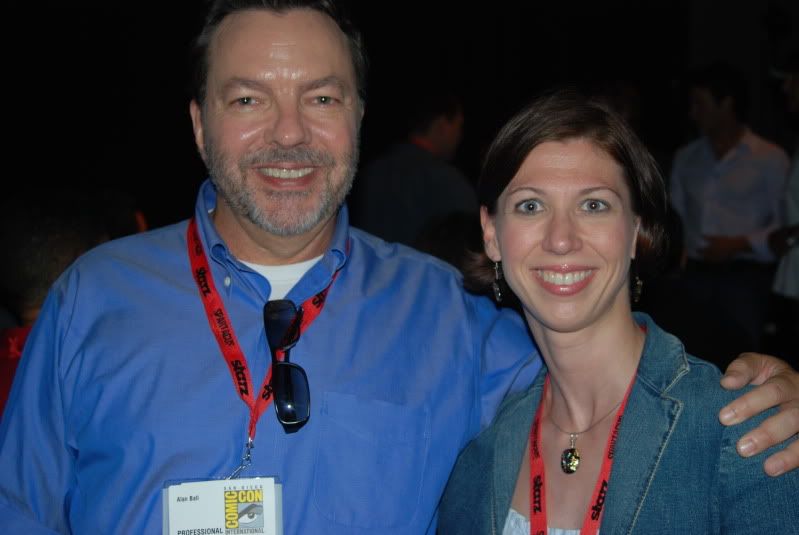
We ended an exceptionally busy and rewarding Comic-Con Saturday in an intimate press round table with the stars and producers of Discovery Channel’s hit science series MythBusters. For those of you who have not yet had an oportunity to check out this show, and are fans of great television science that entertains, it’s not too late to jump on board. In each episode, Jamie and Adam, aided by costars Grant Imahara and Tory Belleci, use basic elements of the scientific method to test the validity of various rumors, myths, movie scenes, internet videos and news stories in popular culture. It’s entertaining, explosive (sometimes literally!) and you get to learn cool science. What’s not to love? In fact, stars Jamie Hyneman and Adam Savage announced today at Comic-Con that they will be appearing on the September issue of Popular Mechanics. Fans can visit this site to enter to win one of 10 signed copies by the MythBusters themselves. Our discussion with the cast helped answer lots of behind-the-scenes about how the MythBusters episodes are filmed, where they get their source material and just how do they do that?!
From the Press Room: MythBusters
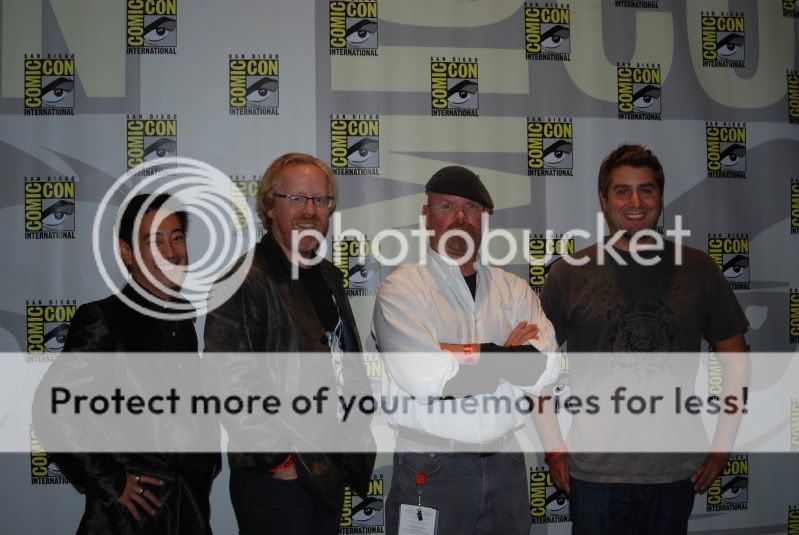
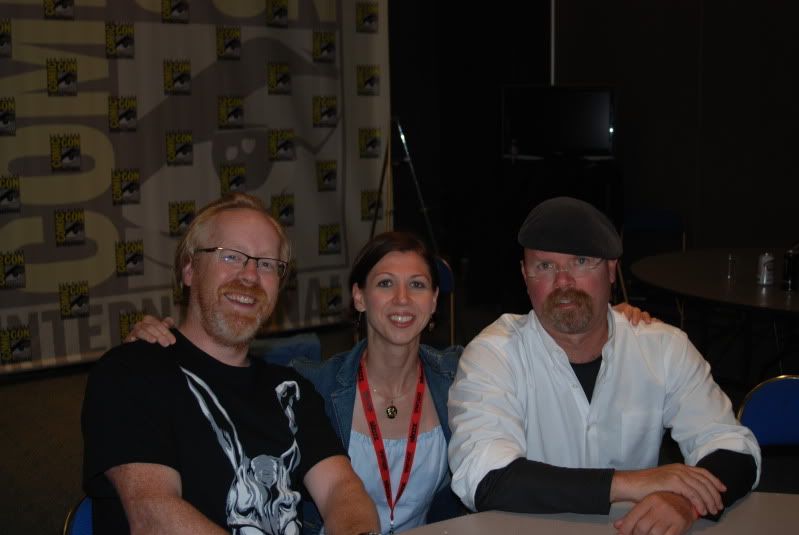
Press question: How did this all get started and how did you guys all find each other and say, “Hey! Let’s make a TV show out of having fun and blowing up stuff!”?
Adam Savage: Well, it’s not our idea. Actually, the original MythBusters creator found Jamie and I in the Spring of 2002. He was looking for special effects technicians to host a show based on busting or proving urban legends.
Jamie Hyneman: And his idea was to not just have us talk about these things but to replicate them and the fact that we build all sorts of unusual things was appropriate for that.
AS: And so Jamie gave me a call, asked me if I’d be interested in hosting it with him because he didn’t think he could quite hold the show on his own—
JH: I figured I’d find someone that was a little mit more of a ham than I am. And maybe we could bat it back and forth a little bit and it seems to work.
AS: So we shot the first pilots in the summer of 2002, and shot the first season in 8 months in 2003, 13 episodes, and then Discovery wanted 30 in the next year, and we had killed ourselves doing 13 episodes in 8 months, 6 days a week, 10 hours a day. So they said, “Maybe we need some more people to help bust myths. Let’s kill some other people!” So we brought in Tory and Carrie and Scotty Chapman, who was in that second season. And then Scotty left after the second season, basically because she wanted to do her own thing. She didn’t like the amount of time that doing television took. Since Jamie and I had worked with both Grant and Tory, Grant was somebody that we’d been thinking about for a long time that we wanted on the crew, and I’d called Tory when I’d called him and I said, “Dude, it’s Adam call me back! I’m gonna change your life.”
Tory Belleci: Well I’ve known these guys for over about 15 years. Jamie actually gave me my first job out of college doing model making. And then Adam I’d met up at ILM [Industrial Light and Magic]. He used to walk around like he had a TV show before he had one. He’d be walking around cracking jokes. I did this thing once where I took an X-acto knife blade, I snapped off the end and I glued it to my hand and put a little fake blood. He and I were working together on a model, and I kind of reached over and went, “Hey Adam, can you hand me that?” And freaked out. He was like, “Ahhhh!” And then he goes away and all of a sudden I hear everybody in the other room laughing their butts off and I walk in and he has taken a whole bunch and snapped them off and glued them to his head. And he’s like, “Heyyyyyy!”
AS: Can’t let a good idea go to waste!
Grant Imahara: I remember Tory and Adam and I were working on Matrix: Reloaded and Adam came in one day and said, “Hey! Me and Jamie got this gig! I’m gonna be flying in this lawn chair with all these balloons.” And I was like, “Heheh, you’re crazy!” So he left. And then Tory and I were working on Van Hesing about a year later and he was like, “Hey! I’m gonna join Adam and Jamie, it’s gonna be great!” And I was like, “Hehehe, you’re crazy!” And about a year after that I joined them. I’m crazy too.
Press question: Favorite myths? Maybe that you’ve done on the show and or favorite that you have yet to do—ideas that are growing.
JH: Well, favorite myth, hands down, for both Adam and I (I think) is “Lead Balloon.” Interestingly, it doesn’t involve any explosions or weapons or anything like that. But it’s—when you think about what we were able to pull off, the lead that we were using was .0001 in thickness, it was about like working with wet toilet paper, and yet we were able to build a balloon that was 14 feet across, weighed 28 pounds and it flew. And so what you have to do to pull that off is walk it through entirely in your head. And that’s how we design things. I think our greatest joy, even above all of this, is the design. It’s just a thrill, because a lot of the stuff like that hadn’t really been done before. And it’s like an adventure. It’s like climbing Mount Everest or whatever. For us, maybe it’s an adventure in our head, but it’s still an adventure that we don’t know how it’s going to turn out and it’s just thrilling.
AS: You lie there awake at night thinking through to tomorrow’s build, and thinking through, like, all the possible outcomes, including the one which took us a while to learn, which is what if nothing happens? Which is often one of the most dangerous situations that you can have. Push the plunger, dynamite’s live, nothing happens. It’s one of the most upsetting—
Press question: Yeah, that was a question I had, particularly when I watch one of the more perilous episodes, which is are there ever episodes that don’t make it to air?
AS: It’s rare. There is one story that we started working on that we stopped working on. And we won’t go near it again. What we were working with was just too dangerous and too unpredictable. And the second part is actually more important. The unpredictability is what made that story undoable. But I think that’s pretty much the only time that’s happened from us. Have you guys [Tory and Grant] had—you guys had a real problem with train suction, I remember.
GI: “Train Suction” took a long time. It took over a year to do and the reason is simply that we had to find a company that would work with us on allowing us to be that close to a moving train. A train moving at very high speeds.
AS: And then it was also a year spent not saying, “Could you get sucked off if you get too close to the train?” [laughter] Finding the right way to say that was difficult.
Press question: Can you talk about the bullet experiment? You talked about it on the panel.
AS: So, bullet drop versus fire, it’s a physics thought experiment that if you drop a bullet and fire it at the same instant in time, both bullets will hit the ground at the same time. Not including things like curvature of the earth in the equation. It’s something that we’ve always had on our list. When we get into these physics thought experiments, it’s one of my favorite things. Fertile territory. Things like airplane in a conveyor belt and swimming in syrup. We spent an entire day using a camera that filmed at 5,000 frames per second just making sure the bullet release was happening at the same time as the bullet leaving the gun. And that was the resolution that we needed to be able to watch these things happen simultaneously. An entire day doing that. And then an entire day finding the consistency of where our bullets would land so that we could know what our target zone was and what we could look for. Getting into that kind of percision over those long distances with things like guns is thrilling, but it also took a tremendous amount of mental effort to work through the thing repeatedly, work through the protocols so no one is where they shouldn’t be. Firing guns is never entertaining to me. It’s always, sure when you’re standing on the firing line and firing an MP-5 it can be a really fun experience, but you’re working with a crew, you’ve got to get the footage in, you’ve got to be safe, everyone has to be behind the line. And we all take that stuff super, super seriously.
JH: That particular story was also a good example of, you don’t really need to know how to do that. It’s kind of like, what practical use is that? Probably none. It’s the process, though, of what we had to go through that we had to figure out that intrigues us. It’s an exercise. It’s another tool in your arsenal to apply to anything. It answers questions someplace else that you may not be aware of.
AS: And just like “Swimming in Syrup” and “Airplane on a Conveyor Belt”, we know for a fact that no one’s done it. We’ve done a lot of experiments that we know other people have done. We’ve built a lot of research and our researchers are phenomenal. But then there are the ones like this, that we know when we do the final experiment full-scale, no one’s ever tried it before. We’re way out on this edge. Maybe not an edge of utility, But it is very thrilling for us to be doing that. Knowing that when someone sees this episode, when a physics teacher sees this episode, he doesn’t just have to say it’s so.
JH: There’s also another prime example of that, and that was “Polishing a Turd.” [laughter] I mean, you absolutely don’t need to know how to do that.
AS: But we’ve all done it professionally. We found polished earrings made of poo, didn’t we?
JH: But it’s about the process, and you find things along the way. We get a kick out of doing things that are so unlikely, like that. One of the things that we’re gonna be taking up here before long is a poo special. I think they were wanting to call it an excrement extravaganza. And this was another example that maybe you don’t need to know how to this, but when you start to look into it, for example, I had been fascinated with hybrid rockets that use pretty much any hydrocarbon along with nitrous oxide or some other oxidizer to make rocket fuel. So I wondered what are all the hydrocarbons that we can possibly use. Obviously you want it to be a dense one, and I went through the list, and I realized that poo is a hydrocarbon and made up of stuff that might be usable as fuel. And, it sounds ridiculous, but when you start to look into it, which I did, I found out that NASA had done quite a lot of testing on this because you’re going to Mars and you’ve got some people on board and where there’s people there’s poo. What else are you gonna do with it? You might get away with recycling your urine, but the poo is a little bit different.
AS: I think you can only eat it twice before it loses its nutrition. [groans]
ScriptPhD: Getting away from poo for a moment, I have a little two-part question about your source material. Can you talk about the process that you undergo when you choose the next myth or the next source material. And then, what is the difference between the material that just interests you because it’s cool and the material that you think is interesting and is feasible to build an episode around?
AS: Well those two things are inextricably linked. Because the show is built on all of our interest levels. I think what’s successful about the show is that we’re actually having a good time. And what we’re having a good time doing is not just blowing stuff up or getting to wear neat costumes, it’s primarily getting to satisfy our curiosity. So really the primary driver, and where a story is going to go, is what are we interested in doing? So our producer, who is the guy who goes up to Discovery and says we’re going to do a poo special and it’s going to go roughly like this, and we’ll look at that story and we might say, “Yeah I know when we first started this was the thing, but I’ve done some more research and actually this is a more interesting direction. Let’s go in this direction.” Because we know that when we’re interested in a direction, that footage is going to be more compelling.
SPhD: And what are the places that you go to to derive this stuff? Is it where your curiosity normally takes you—articles, journals, the internet?
AS: Well, I’ll give you an example. On Twitter, shortly after I started posting regularly, someone Tweeted a myth that said, “Dirty versus clean car as a myth.” Dirty car gets better gas mileage, because the dirt has a golf ball-like effect on the surface of the car and allows it to slip through the air. Dimples, in other words. And I knew, because I’ve sat next to Jamie on countless plane trips where he’s bent my ear going “I don’t know what the golf ball effect is, and why don’t planes have little golf ball dimples, and so on”, and I’m thinking, knowing that [Jamie’s] interested in that, the moment I heard this myth, it cascades into a story that I know is going to interest me. I know it’s going to be fascinating because we log these little things, these little trips, and we talk about them all the time. We’ve sat on planes where the guy behind us has said, “You guys really talk like this in the world!” [laughter]
Press question: what are Tory’s and Grant’s and Carrie’s roles in the planning of the episodes? Where do they come in?
TB: We have our own team. So [Jamie and Adam] have their own stories and then we get a whole list and we do look through them and ask, “What do you guys want? What do you want?” And if we’re really excited about a story, we’ll say “Oh what if we did this! What if we added this?” and we start building and then they’re like, “Yeah, you guys are psyched about it, run with it!” And then if it’s entertaining, we have to ask if there’s going to be enough to make it scientific and entertaining at the same time. And we do these story meetings where we just sit around and brainstorm about how we’re going to test this, or what if we added this or so on, and it just grows and builds.
Press question: So you guys [Jamie and Adam] are the cover guys, but there’s a real honest division of labor between you?
AS: Those are totally separate stories, yeah.
TB: But every once in a while, we’ll get a story where there’s a cross-over.
AS: Also, there’s stories where these guys will do preliminary work on and we’ll pick up years later and ask how they did, or we’ll be doing something that they did and we’ll ask them how they did that.
JH: A good example, if I can interject, was one that I believe has aired, which was “See-Saw Saga.” Both teams worked on this, and when I first saw this story, I went through it and said, first off, while it’s gruesome (because it involved a skydiver whose parachute didn’t open) it also was funny because he lands on a see-saw and a little girl gets launched up to ten stories in the air and walks away from it safely. Here, when you start to look at that, I start to see a lot of interesting stuff because the impact that this guy is creating is a lot of science, terminal velocity and it’s likely going to break the see-saw and all that stuff. There’s a lot of physics to consider here. The rig that we eventually try to do, shows that even if it didn’t happen, or couldn’t happen, we would try to make it happen. And the engineering involved with that was quite involved. We used CAD, we used a lot of high-end materials, we were able to invent something that hadn’t been made before. It was really quite cutting edge in its own way. And so there’s all the elements that you could possibly want in an episode in that one thing: humor, science, a lot of challenges, a lot of complexity and depth in the process.
AS: But also I have to say, and I think one of the things you were getting at, is it’s not like we get lists of things from a producer to go and do. The producer, Dan Tapster, will outline a whole season, because Discovery has to buy off a whole bunch of stories. But those outlines are the faintest of sketches. The actual construction process, the actual design process of an experiment, is driven by the team that is doing that experiment. So it’s so much more than being on-camera talent, and I think that’s one of the reasons that the show is still getting the same ratings it was getting six years ago. We’re still engaged and I think I can speak for all of us—after 168 hours of programming, we’re still having more fun now than we ever have. We feel consistenly more of a sense of ownership of the material as we go, as we get better at doing this, as we get better at spotting stories and chasing down these paths. The experimental designs just get more and more fun.
TB: We actually got a criticism from our producer, and he was like, “You know when an explosion happens (and we were looking at some past episodes), try not to triple orgasm, try not to do that. If it’s something that interests you, great, but not this over-excitement.” And we looked at each other thinking, “We actually were that excited!” You can’t hide your emotions.
GI: We’re involved with the design process of how to bust a myth, of the mechanical rigs. I think that if we weren’t, you wouldn’t be able to see that on camera, because we’re not actors. So, it’s hard to give the impression that you’re involved if you’re not involved. And so you’d like to be involved, I like to do my own research, I find the best way to sound like you know what you’re talking about is to actually know what you’re talking about.
AS: Well, I think it’s the thing I see when other networks attempt to replicate MythBusters style of show. What I consistently see is hosts that aren’t engaged with the material. And in fact, when I watched shows that I like, it’s hosts that are engaged with the material. It has nothing to do with the material itself.
SPhD: Can you offer any examples, obviously without calling someone out?
AS: I don’t wanna name names, because I don’t want to trash other shows.
JH: An example that goes indirectly at this is one of the things I never see on any of the other shows, as far as I’m aware, are tangents that sometimes go off in a different direction and when that happens with us, it’s because we have come up with some sort of a seed of an idea, and we start to go into it and then we find interesting things along the way. A lot of times, we’ll do a right turn off in some obscure direction, because we are fascinated. It’s like, “Wow, who knew that this would happen?” and I’m curious about it. And fortunately, production has learned to appreciate that this makes for something that actually has more depth to it. It’s not just picking a subject and linearly following it and busting the myth and that’s what it’s all about.
AS: I’ll give you a good example. One of the best informed to me, of the MythBusters offshoots, is ESPN’s Sports Science. That’s a terrific show. I love watching it. But I think that what they spend a half hour on would take us six minutes of screen time to explain and demonstrate. There aren’t really hosts of that show. They have an outline and they methodically go down it. And they shoot down their targets as they’re going. And I think Jamie is absolutely right. It’s those tangents where you get those—because to us, the soul of the show is just these two guys on a Sunday in their garage. What would they do?
SPhD: Well as a build-off of this answer, and your previous comment, Tory, about the mix of the science and the entertainment, who do you view as your audience? Because there are a lot of spin-offs and there’s a lot of material available now. Do you sort of feel like there’s a certain demographic that is there, and then you tailor the show to them, or do you have an idea, you go with it, and it’s a wide spectrum of people who will come?
JH: Yes, we’re actually just having fun and screwing around. It seems to work. And yes we will be premeditative about it in the sense of my previous example with the see-saw thing. We can see certain elements in it that make for a clear trail of a good story. It’s got all the makings and we’ll make sure that we have that balance in it and make it into a composition that way, but as far as tailoring to an audience? It’s pretty much we’re just believers in the honesty of the approach. We’re just having a good time, we’re exploring, it’s an adventure for us to do what we do, and while we’re aware that the cameras are there, at least in my case, it’s just a pain in the ass. I would say get out of my way.
AS: One of the surprising and impressive things about the show is the feedback we get from kids saying it’s interesting, parents saying it’s interesting, our kids like the science, science teachers saying that their Thursday morning class discussions are the liveliest of the week because of what happens on our show the night before. The National and California Science Teachers’ Association have made us honorary lifetime members. But what we love saying is that if we’d set out to make a show that was “educational”, we would have failed miserably. It’s not by design. We understand that that is the case now, and yes, we can look down the throat of a narrative and say, yes, let’s bring in this element, and let’s bring in this here, and then in the middle of that demonstration, something really remarkable might happen. We’ll go down a different path. Most shows, like Bill Nye’s and those types of shows, are demonstration shows. They describe a concept and then they demonstrate it. We are steadfastly not a demonstration show. We’re an experimentation show. Because we don’t know what’s going to happen when we’re setting up to do something. Sometimes we do, but honestly, the largest proportion of the time we’re surprised.
JH: A lot of times, we think we do and it turns out that we don’t. And that, for us, is the best thing because it means that we learned something in the process. In my sense, the biggest excitement and bonus of doing this show is what I personally learned.
AS: I’m not going to give you the result of “Dirty Versus Clean”, but the result was so shocking to us that we literally just sat there and giggled on camera. We were totally wrong and so were all the experts. It’s great!
Press question: Have you gotten any interesting feedback from academic scientists?
JH: All the time. We get insulted about things that we’ve done, we get questions. A lot of time the inquires are just, “What kind of material do you use or where did you access it?” But we’ve had pretty much any scientific institution that you can name has contacted us in one way or another with some kind of inquiry.
AS: It’s not like we actually engage in discussions where they’re like, “We think you got this experiment wrong.” Actually, I think there’s a real clear understanding in the scientific community that these aren’t publishable results we’re coming up with. But what they see that we’re doing that’s a benefit, is that we’re doing things like, we’re showing you that we were wrong about our intuition. We’re showing you that the experts helping us to make wild-ass guesses were wrong. We’re showing that science is this very messy process. We’ll spend an entire episode realizing we’ve been asking the wrong question. And that’s really important, that people see that science isn’t guys in white lab coats going, “It’s just as I expected!”, it’s people going, “What do we do now?! Where do we go from here? We got this result and I have no idea where to put it.” To show science as such a creative process.
Press question: One question that isn’t in your bios. Which of you has the most degrees piled up?
GI: Electroengineering. A degree. Bachelor’s of science.
Press question: And second question. Have you done a do-over episode yet?
AS: Oh, we’ve done dozens of do-over episodes! There are a lot of stories we’ve gone back on with new data, new material, new information. Because fans will absolutely spell it all out for us when they think we’ve got something off. And if it’s enough material for us to come up with a different conclusion, and I love that! I’m always saying, “Wouldn’t you love to watch the History Channel, and have them air a disclaimer saying “You know all those Nostradamus documentaries we’ve been wasting your life with? Turns out it’s all crap! Sorry!””
Press question: Adam, you mentioned in the panel, somebody asked about Bigfoot, and doing an episode about that, and you said, “We’re not into proving negatives.” Can you talk about that?
AS: Well, if you are going to tackle ghosts, you’re going to have two outcomes: you’re either going to find a ghost or you’re not. If you don’t find a ghost, that doesn’t mean they don’t exist. All you’ve done is proved that you couldn’t find a ghost. There’s not much that’s scientific in that. You’ve just demonstrated the negative, you haven’t demonstrated the positive.
JH: That’s the super part in supernatural. There may be something there that doesn’t fit within science or things that you can test, things that you can wrap your brain around other than being able to say, “Well, we weren’t able to find anything.” While we are at times coming up with results that are not definitive, well that’s most of the time, we’ve got a sample size of one or sometimes three, if we’re lucky. It doesn’t mean that we’re going to go off on wild goose chases after things and make statements about stuff that is out there.
SPhD: Right down the line, favorite episode to date?
TB: My favorite episode would probably be “Red Flag to a Bull.”
AS: For me, it’s “Lead Balloon.”
JH: Same.
GI: Probably the Wanted myth, where we tested the curving of a bullet. The experimental design was really fantastic.
I know you’ve been waiting for it, folks! The Day 3 Comic-Con Costume of the Day. Today was a very tough call. Compounding the fact that Saturday tends to be the busiest day at the Con, it is also the night of the annual Costume Masquerade Ball, so it definitely brings out the creativity. Our pick is a graphic designer whose costume took over two hours to put on, with some very neat results:
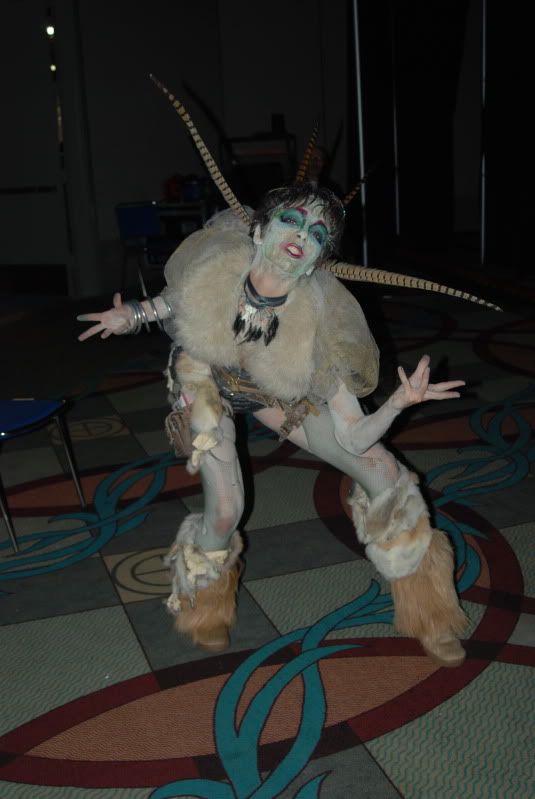
Please come back tomorrow as we close out a relatively relaxed last day with two amazing final panels (the inimitable Dr. Who and Supernatural) and our first visit to Hell on Earththe always packed convention floor. Good night!
~*ScriptPhD*~
]]>
Greetings! Day 2 of Comic-Con was a very scaryspecial occasion: Official Star Wars Day. Yes, the personal hygiene was questionable and the light sabers were many, but the ScriptPhD soldiered on to bring you our coverage of as much science entertainment content as you can pack in one website. Today we start by putting the science in science fiction with the special 10th Anniversary Farscape reunion panel, including information about their new DVD box set release and upcoming projects. ABC’s electrifying new science-fiction serial thriller FlashForward provided a world premiere sneak peek of the first 15 minutes of the pilot and a special guest surprised the audience. Our press room coverage from Day 2 includes some phabulous physics with CBS’s Emmy-nominated Big Bang Theory, including a one-on-one interview with Emmy nominee Jim Parsons, who talked to ScriptPhD.com about his journey into science and preparation to play a science geek, and Bones, including interviews with star Emily Deschanel and showrunner Hart Hanson. We also have our daily Comic-Con Costume of the Day and the Light Saber Count Tally. Stay along for the ride with ScriptPhD.com. Click “continue reading” for more!
Farscape: 10th Anniversary Panel
Moderator: Keith R.A. DeCandidio (author of official Farscape Comic)
Panelists: Brian Henson (executive producer/director), Rockne O’Bannon (creator/writer), Ben Browder (John Crichton), and Claudia Black (Aeryn Sun)

Farscape: 10th Anniversary Panel
Moderator: Keith R.A. DeCandidio (author of official Farscape Comic)
Panelists: Brian Henson (executive producer/director), Rockne O’Bannon (creator/writer), Ben Browder (John Crichton), and Claudia Black (Aeryn Sun)
Brian Henson: Thanks for coming everyone. We are primarily here to announce our special 10th Anniversary DVDs being released thanks to the efforts of our new distribution partners. November 17th is the official release date, with lots of new material previously not available. We heard from fans that what is most missed is Farscape: Undressed, and we actually only aired it once. So it’s really nice to make it special and it will be a part of this box set.
Keith R.A. DeCandidio: In fact, you have 29 commentaries on specific episodes. So there’s lots of commentaries and documentaries, 90 minutes of deleted scenes. What about the webisodes though?
Brian Henson: The webisodes are really good creative work. Rockne has been working with Ricky Manning, and they’re going to be great but it’s a tough time to finace things. We’re working on raising money, but we are poised to go on with them as a project and Rockne has been working on the comic books in the meantime.
Rockne O’Bannon: I’ve been honing a suitable story that can be done on the web in 4-5 minute segments, and it’s been tough, because the original was ambitious even for television. We wrestle constantly with a story that we’re excited about.
Brian Henson: What we’re trying to do is approach webisode opportunities from a unique perspective, not necessarily a linear one, not interconnected, but where you get a piece of an important puzzle as you watch each one. That is the initial launch of the next big part of Farscape, and it’s very ambitious. It is the continuing story of Crichton and Aeryn and their son. And if you keep up with the comics, there are characters being introduced in those that will continue into the next chapter as well.
Rockne O’Bannon: First we started the webisodes [as follow-up material] and then the comics came along, and it’s the perfect interstitial material. Comics are definitely an important part of the equation.
Keith R.A. DeCandidio: We’ll start with some web questions first that were sent in. David Leslie asks Ben and Claudia, what was your first reaction to acting with creatures from the Henson creature shop?
Claudia Black: Well, to be honest, we didn’t know what we were getting into. The Henson involvement was exciting. I’ve always been a big fan of muppets, great production value, and I find them interesting.
Ben Browder: I didn’t know what they were going to do. My first audition was at Henson’s old offices, surrounded by Kermit. I just wanted to be with the frog. I didn’t realize it was going to be Rigel.
Brian Henson: Rock and I had been working on this together for four years before production actually started. And there was lots of work involved. The show is very innovative, a sci-fi tone with a new energy, lots naughtier, and pushes the limits beyond what people had previously done on television. When Ben and Claudia joined, we only had drawings of different episode ideas. In a lot of ways, it was psychotically ambitious to have new ideas for each episode [in terms of expense and sustainability]. Rigel and Pilot were the first two puppets built in London, the rest were built in Australia. I was personally always impressed with the Farscape cast. Because they must take it very seriously in order for the idea to work. The characters must be sincere and believe in the world, but with Farscape, because we have a lighter tone, very comedic, particularly with the creatures, you need to treat them with respect. And Ben and Claudia in particular, were taking them seriously and yet having fun with it at the same time!
Rockne O’Bannon: I remember in the early days, it took a few episodes to get comfortable, and once you could touch Rigel, it helped you make the whole thing that much more real.
Ben Browder: And the puppeteers themselves were okay with it. You didn’t WANT to touch Rigel, but you did want to hit him. I remember the first episode I hit him, Season 1, episode 6. And I asked the puppeteer for permission, which he gave, but we didn’t tell the director of the episode, so we filmed the scene and I nail Rigel in the back of the head, he goes down and before they called cut, we hear this “Oh my Goooooooood! Not the puppet!!!!!!” We realized that the puppet cost $1 million to make. I thought I was going to lose my job. You realize the appeal of the puppets pretty quickly when my children walked into the room with me, and engaged in a 30 minute conversation with the puppets. They never realized that Johnny was even there.
Claudia Black: And every year I made the bet that because [the Farscape plan] was so ambitious, we weren’t getting picked up, and every year I was wrong. They were able to create these really emotional scenes with rubber, to get these emotional reactions out of puppets.
Brian Henson: With rubber, leather and latex! No wonder we’re at Comic-Con!
Fan question: What’s your favorite line from anything in the show?
Rockne O’Bannon: Picking a single line is tough. But I am really proud of [the swear word] Frell. I was waiting in the airport at Salt Lake City on my way to Thanksgiving, and writing the scene for episode 9, and needed a curse word. So for me it was the invention of the word Frell.
Claudia Black: Same here! I thought it was a sticker. Every other episode we were like, “Can we use Frell? Can we invent more unique swear words?!”
Ben Browder: My favorite line. “CAN I GET A HELL YEAH?!”
Audience: Hell yeah!
Claudia Black: “Can you help me find a place to seize your soul?” They wanted me to test that character, and I did the line spontaneously when we taped, and watching the reaction on Ben’s face, it was the first time you’ve ever corpsed on set. It was so fantastic!
Brian Henson: For me, it’s like an ocean. How do you pick your favorite drop of water? There was so much Farscape! My favorite part was the romance between Crichton and Aeryn. That relationship and the performances that these guys did was what moved me the deepest. Which is weird because I’m the creature guy. And when Aeryn smacks Rigel’s head was such a surprising moment and always makes me laugh!
Claudia Black: I remember doing a lot of the B stories with Rigel early on and I remember telling Ben, “Hey! You’ve got to get your hands on Rigel, it makes a big difference.” I didn’t realize he was going to be real, and here he comes with an entourage of six people at any given time. So dealing with him and his entourage and pretending that they weren’t there was a challenge.
Brian Henson: What you don’t see is that when there’s a Rigel scene, underneath him is a group of three people, and a rolling chair. So to get to Rigel, you have to make a plan, otherwise you’ll step on people’s faces and fingers. But it is funny. If you were to just zoom out 10 millimiters [they would be there onscreen].
Keith R.A. DeCandidio: Online question from Jonathan Schwest from LA: What was your most formative experience on Farscape, that made you feel like THIS is the reason I took this job?
Claudia Black: Watching that video [retrospective at the beginning of the panel] was it. I cried. I can’t believe what we managed to achieve. I think you had to film it overseas, where the tax incentives were, which means working with Australian crews, which are cheaper. [laughter] But originally, the plan was to block shoot multiple episodes at a time.
Brian Henson: Yes, the original plan was to have an ensemble cast and make simultaneous episodes, but we realized the driving relationship was Chricton and Aeryn.
Claudia Black: I turned around and said to Ben one day, “This is a love story.”
Rockne O’Bannon: For me the feeling really hit home when we were doing the Peacekeeper Wars, the fnal mini-series, when we were doing the birth sequence in the water. I thought, wow, it’s a gunfight, all our characters are gonna die, Aeryn’s having a baby, and Chricton is going to be delivering it, and they’re gonna get married and it’s gonna be…. funny! That’s when I realized, “Wow look at what we’ve done. After four years, it was just the Farscape way. We’ve gotten to a place and a show where we’re really stretching the limits of what we can do.”
Claudia Black: I was grateful for that water birth scene a few years later, when I birthed my first baby, because I did have it in water, and it wasn’t nearly as painful as for Aeryn. I remember thinking, “Huh. I’m tougher than Aeryn.” [laughter]
Ben Browder: My formative moment? My paycheck! First paycheck, I looked at it, and thought, “Ohhhhh the rent! Baby’s gonna eat today!” Why did I take that job, I don’t know. No, all kidding aside, it was near the end of Season 1, it occurred in stages. The first time I worked with Rowan Woods, episode 9 season 1, was a turning point for the series and what we were capable of. And then the two-parter where we introduced Scorpius. All those developments through Season 1, we were able to fail gloriously and succeed in surprising ways. It didn’t happen in a flash, but if you look back at more than one clip, you get very overwhelmed. It’s ten years! It’s still beautiful and well-crafted today!
Rockne O’Bannon: What’s amazing is that the clip reel was of material we’d made only in the first season, and just looking at the scale of what we accomplished just in one season, tribute to all the artists, Aussies who embraced it and threw themselves at it. My formative moment was starting development with Brian in 1993, and looking at shopping it to a network and looking for a network deal. And we both looked at each other like, “How do we do this?” We had four scripts, but the pilot itself was overwhelming.
Brian Henson: Sci-Fi (now SyFy) was terrific. It was their first show that they picked up as an original series, and that was a big risk for them. I know people are upset with them for eventually canceling us, but it was a big deal to even run us for 4 seasons.
Fan question: Would you ever consider a sequel or a spin-off?
Brian Henson: We’ve thought about it, but we’re most excited about continuing the story as is. The Farscape universe is a very rich one, very well developed. We’re excited about launching the next chapter. We’ve discussed a lot of different options, but now we’re most excited about the next chapter. “Puppet Up” is this puppet show that’s rated X, that we do in secret at the Avalon Theatre in Hollywood, to train the puppeteers. We were thinking about a “Puppet Up” mix with Farscape!
Very special fan presentation: Hi, I’m Craig Glendave from the Guiness Book of World Records. This is a book full of psychotically ambitious people. I have one preview copy of our upcoming book for you and your certificate. This is for “Most Visual Effects in a TV Series”. You have seven days to do one episodes, with 40-50 visual effects per show. In one season, you gusy do a motion picture’s worth of effects. Welcome to the Guiness Book!

Keith R.A. DeCandidio: Another web question. If you had a chance to go back in time, what would you change and why?
Claudia Black: Personally, I’d redo the first six episodes, because it was like a teething or a birthing process for me, because everyone was helping me shape the character, and for me, the seminal moment was when I took ownership of the show and I felt like I owned Aeryn. Up until then, I didn’t have a comfort level with Aeryn. I hit my stride by episode seven.
Rockne Obannon: For me, it was in the pilot, seeing the first few shots, and in comes the footage of Ben and he’s wearing like a jet fighter helmet. And we are like, “OK that’s not an astronaut helmet” so we would like to put on something different on him, but it reminded us to write great dialogue for him because he might be hidden by the helmet.
Ben Browder: I wouldn’t change a thing. I’m not smart enough to know what thread to pull, because of what could unravel. Because all the things we did badly, we got better the second time. Like the terrible beards! That was my own beard, by the way, for you online haters saying that it was the worst fake beard you’d ever seen.
Keith R.A. DeCandidio: Any final comments?
Brian Henson: Thank you for coming. You, the fans, are the reason we continued, and kept us alive. We’re still dedicated to Farscape and keeping it going. You guys have been so supportive for really unusual shows, and that keeps television going!
Ben Browder: So we’re all going for drinks afterwards…. Brian is buying, tell your friends!
[ScriptPhD note: I have never watched Farscape. Yes, I am hanging my head in shame, and yes I realize it’s a staple of science fiction television. But though I covered this panel because their material is so appropriate to our site, I must say, the clips and the energy exuded by the panel, clearly conveying their chemistry and camaraderie, made me an instant fan. I plan on going through the box set immediately. Maybe this will help me get over losing Battlestar Galactica]
From one great moment of science fiction past, we moved to the science fiction future, with ABC’s exciting new fall series Flash Forward. Comic-Con featured the first public footage of the first two acts of the pilot and the introduction of a very special cast member.
Flash Forward
Panelists: Brannon Braga (24), Marc Guggenheim (Eli Stone), David Goyer (Batman Begins), Joseph Fiennes (Shakespeare in Love), John Cho (Star Trek), Courtney B. Vance (Law & Order) and Christine Woods (In Plain Sight).

The panel began with an introduction and world premiere of first two acts by executive producers and writers. As a note, ScriptPhD.com is going to be covering and reviewing the entire pilot as part of our fall television preview. Think of this as a tease! But in the meantime, we have a transcript of the panel discussion featuring cast and writers.
Marc Guggenheim: Well, the concept for our show is based on a book entitled Flashforward by Robert J. Sawyer, and I remember my wife came to me and said this would make a great movie, but we subsequently moved into a house, and buried in the boxes a long time after, I found a copy of the paperback and started exploring it again. Then I talked to my friend Brannon. The big thing in the book is that the conscious shift is 21 years in the future, but we chose six months as more interesting. By the end of Season 1 we will have caught up with all the flash forwards. And I know what you’re going to ask. Do we have a plan for after Season 1? We do.
Moderator: And the story is building up to a big date, April 29th.
Marc Guggenheim: Yes, and this event is so big that this will be split up into two days.
Brannon Braga: What you didn’t see yet, is that every man, woman and child has a vision of the futuer six months from now. That’s 6.8 billion potential stories that you can tell! Great syndication package! Because of that, we saw great potential for stories but also something that’s universal.
Courtney B. Vance: I’d like to go all over the world. [laughter]
Marc Guggenheim: That will look like a green screen to you, Courtney. In all reality, we will be going all over the world during the show. Every person is a potential character, and every type of story will be told in the series: funny, sad, romantic, tragic.
David S. Goyer: Every episode will have at least one flash forward that is procedural mingled with our ongoing characters’ flash forwards.
Moderator: There are lots of mysteries embedded going forward. Moving forward, what are the episodes driven by? What’s the right balance of drama and human?
Brannon Braga: Well, Joseph Fiennes’s character has seen some things in his future that drives the investigation [as to why the blackout happened]. That is the overarching story of the series. But we’re also interested in the human drama element. What imprisons people by their visions going forward?
David S. Goyer: If you want the muscular procedural, there is that aspect through Joseph’s character from all these clues he’s dug up six months from now. Every image has already been figured out and they appear briefly on that board that you see flashes of with pieces of the puzzle, if you want to pause your TiVos. Part of it is that we started writing the first half of this, and then second half after WGA strike had eded fourteen months later. So that pause in between gave us time for lots of planning. But there is also tons of human drama involved in the show. If you knew everythng about your life would be different six months from now, would you do everything differently?
Marc Guggenheim: It’s another opportunity to elicit character, which is our mantra in the writers’ room. Even the guns and pyrotechnics are ultimately tied into character drama. Our show’s tone is as wide as its scope.
Moderator: You talked about LOST and it being a big inspiration for you. How did that play a role?
David S. Goyer: Nothing will be the new LOST, but our show ended up at ABC. We wrote a spec script and there were multiple bidders and I was friends with Damon [Lindeloff, writer on Lost], and the bottom line is that LOST was a genre-breaking show: daring, challenging. We figured that if ABC was that courageous with them, they’ll be courageous with us. And we pitched them a fairly excessive plan. We know the shot Season 1 ends on, we know how the season and series ends and they said, “Holy shit!” Literally, that’s what they said. The basic plan is that in order to tell the story we need as little as three seasons, and it could go out to…
Courtney B. Vance: Raw hide… 21 seasons!
David S. Goyer: We had a big plan and we didn’t know if it would work out.
Moderator: This is your first time on TV Joseph. Why did you want to do this?
Joseph Fiennes: I actually came to LA for a meetig on another project, and on the way to the airport I got a phone call and a script [for Flash Forward]. I knew of David’s work, but read the script and thought I had to do it. It was a combination of brilliance and smooth talking that landed me here. It’s been an extraordinary change of events going to TV, but I must say through the scripts and the process behind the series, I think that it’s so much more exciting in many areas than film. Film can be generic and structured, three act arc. You sort of predict what you’re going to get. Here there’s a different shape that is possibly like Raw Hide, going on forever.
David S. Goyer: There’s a cute story from the pilot of Joseph taking out this gun. And we showed him how to shoot a gun, since when we see him in the movies, he is usually on a horse in pantaloons. In the middle of it he did this ridiculous James Bond action role, and he threw that in because he was so excited.
Moderator: John, how’s your summer been?
[audience cheers]
John Cho: Summer’s been good. Had a film called Star Trek, and it feels so good. We went all over the world, it was a real privilege to travel with all those people. I didn’t get to meet everyone while we were filming, so it was a good chance for everyone to get to know each other
Moderator: How challenging is it to bring this to life? When all you have is a flash of the characters’ future and the writers give you little to work with.
Courtney B. Vance: I find it liberating to be in a series that is flashing 21 years in the future, I get residual checks for 21 years. I get the chance to work with these guys as youths and we will grow old together. I look forward to seeing my children go to college. In all seriousness, it’s a great group of people. I have been trying to hook up with another series for a while since Law and Order, so I was exhausted from that trek. My manager told me to go in on Saturday to see the writers of this new show. So I went in and met with them, and it was a life-changing meeting. I’m pleased and proud to be a part of this 21 year saga.
Christine Woods: This is my first series so that’s exciting. But it’s fun to go to work and have it be reactionary. You don’t know what’s going to happen, and sometimes they give you clues, but I think it’s cool to not know what’s next with less to think about.
David S. Goyer: I have a funny story about Christine. She has these three tattoos on her arm, and she auditioned and we loved her but couldn’t ever remember her name. So when we went to cast, I was like, “I want three circles. Where is three circles?” She became Three Circles for a month.
Christine Woods: I actully got more work after the tattoos because people remembered me.
Moderator: Lightning round. David, next Batman fim.
David S. Goyer: We’re still trying to think of the lamest Batman character. We’re BatMusing.
Marc Guggenheim: Green Lantern is happening, we’re filming in Australia. So look for it in January.
Brannon Braga: Loved the new Star Trek movie. And yes, I think we’ll absolutely see another reincarnation of Star Trek on TV again.
Marc Guggenheim: What you guys don’t know is that after Kal Penn joined the White House, John had a choice between doing this show and joining a non-profit for Sarah Palin.
John Cho: Yes, we would have been providing guns for every underprivileged child. [laughter]
Fan question: Some characters don’t have a flash forward.
David S. Goyer: We will be bringing that into the storyline.
Fan question: David, you work a lot in features, are you going to stay invovled with this show?
David S. Goyer: I co-wrote episodes 2 and 3. You know, in the past, I’ve flirted a lot noncommitally with TV, but I love this project so much that I signed a contract for the first season no matter what.
Fan: Has Robert J. Sawyer been involved?
David S. Goyer: He saw the pilot, he loved it, and he’s our science advisor on the show.
Brannon Braga: we planned the show with him before we even started writing, because certain things are different from the novel. But if you see his blog, he’s totally cool with it. We’re starting a new fan resource for the show: www.redpandaresources.com
Fan question: What caused the global blackout?
Marc Guggenheim: Rush Limbaugh farted. It’s a big ass, think about it. We know, we know, we knew before we started the show, but we’re not gonna say.
David S. Goyer: A master plan is important if you’re going to do a heavily serialized show that catches up to a certain date. The audience smells a rat if they think you’re making it up as you go along. We were able to get ABC to hire our writing staff well before we shot [to begin planning everything out], but if you are going to be true to the fans, you have to know where you’re going. Thus, we are able to lay in a lot of easter eggs, and aha moments that connect to seasons later on, well beyond even Season 1.
Fan: You imply that even though people know what their future is, they can’t change it because you’ve planned it out.
David S. Goyer: Part of the fun of the show is subverting expectations. A lot of people think we’re treading water until April 29th, but there’s a lot of game changers that happen early on. So… just watch the show.
After showing some rather funny clips of Sonya Walder (Penny Widmore of LOST) in her Comic-Con costume had she been here, the producers introduced the worst-kept secret in Hollywood… Flash Forward cast member Dominic Monaghan, whose mysterious appearance seemed to be as brief and mysterious as his character. [He did get a standing ovation from the audience, though.]

Dominic Monaghan: My character’s name is Simon and that’s all I know. I don’t know
if I’ll be on LOST again. I’m not really sure if anyone ever dies on that show.
David S. Goyer: We’d planned Dom’s involvement even before we started the pilot and he’s a game changer character that fucks things up a lot.
Fan qestion: Christine, what does your tattoo mean?
Christine Woods: It’s nothing too secret. Just a combination of femininity, presence, it’s my own little power symbol.
ScriptPhD note: ScriptPhD.com spent time in the press room with the cast and production talent of Big Bang Theory and Bones and we were thrilled to be able to ask the actors and writers about the science in both shows.
From the Press Room: The Big Bang Theory





Kaley Cuoco (Penny)
Press question: Did you have to talk to anyone about researching to play the role of Penny for background iformation?
Kaley Cuoco: Originally I was a little nervous that it was going to be blonde next door to two goofballs, which we’ve seen before. But if you’ve seen the show, it’s so not like that at all. Penny, like myself, likes these guys very much and actually wants to be friends with them more than they want to be friends with her. I think they were the mean ones at first. They wanted nothing to do with her. She just annoyed them. So I just love these guys in life and it shows on the show. We love each other.
Futon Critic: Do you feel like you’ve picked up any geekier habits from watching the show and learning about things you’ve never thought about before?
KC: No I refuse to pick up on any of those things. I still want to live my life, OK? I don’t live in the Big Bang Theory, I don’t know anything about physics, and I’m never going to learn anything about physics.
ScriptPhD: I overheard you talking about nerds during your video interview. Do they come up to you on the street and appreciate you and vice versa. What’s your interaction like with them?
KC: I don’t know if they’ve always been geeks and I don’t look at it like that, people seem every age, every looking person, every style of person seems to come out to me. They love the show. They’re just genuine about the show. I really feel like people love the show, love it, love it, or have never seen it. So the fans that come up know everything about it, they want to know more about Penny, they kind of think Penny is real. They’re like, “So what would Penny do tomorrow?” and I’m like, “I don’t know, I don’t have a script in front of me!” They kind of really believe and I don’t really want to take that away from them, but at the same time it’s sweet.
ScriptPhD: How did you get the role? Just curious.
KC: Because I’m awesome! Actually, I auditioned two years ago, didn’t get it. Auditioned again, went to network, didn’t get it. Chuck [the showrunner] told me I was not the girl for the show. And then a year later he rewrote the whole thing and called me and said, “I’m sorry will you come back?” And I was like, “No, I’m busy now.” He sent me the script, and he did rewrite the whole thing and I came in two days later and got the job. It was all an incredible timing thing for me. It wasn’t meant to be a couple of years ago, I don’t think it would have worked the way it works now.
Press question: Do you prefer the comedy to drama?
KC: Yes! I can’t be serious for two seconds. And I love the audience interaction, I love to laugh, I love to make people laugh, I love to be contorted and do silly things. My favorite episode for me personally was when I got to look like a disaster! It’s just been great. They’ve written some great stuff for me, I’m really happy.
Press question: When do you guys start shooting again?
KC: Two weeks from now. Not yet.
ScriptPhD: Are you excited for the Emmys?
KC: I am! I’m so excited for Jim, I’m thrilled for him.
ScriptPhD: Because it’s a lot of validation for the show in a way. Tell me about that. You’re veering into the mainstream, people are watching, you’re getting nominated for Emmys. What’s that been like for you guys?
KC: You know, it’s been a total steady climb. I mean we started out where reviews were bad, people thought the show was recycled, they’d seen it before, they’d done this, done that. They’ve really turned. They love it! And it’s so nice because we’ve worked really hard and our writing has gotten better and better and better. I think our second season was better than our first and that’s rare, so I’m hoping for a really great third season.
How do you feel that this casts light on nerds and your character likes. What type of world is this creating?
KC: It’s called television. Truthfully, I think it has opened the door for everybody. These are people that we don’t know. I mean, these brilliant, brilliant people are very few in the world, and I think it’s amazing that we’re casting a light on them. They’re not nerds. You’re only calling them nerds because they’re smarter than you and you’re jealous.
SPhD: Absolutely! The Fringe writers were just talking about that at their panel yesterday. That their responsibility is just to portray them living their everyday lives. And you do more for science by saying, “Hey these are regular dudes. They go home, they have love interests…”
KC: Yeah, they have a life and they’re briliant and way smarter than any of us.
SPhD: They’re not untouchable.
KC: That’s exactly right. Because I think they are almost more untouchable than the hot girl next door that they think they’re never going to speak to. They’re brilliant and have a lot to give to the world. Little socially awkward, but we can fix that!
Press question: Is there any level of improv to the show?
KC: You know, I have to be honest, the only reason that it seems like there is is because the writing is so good. When a show can seem like it’s just happening, it’s the writing. Everything is happening in the writers’ room. Oh the Emmy nominee over there! Emmy nominee at Table 2.
ScriptPhD: Let’s get some Cristal Champagne please!
KC: Ugh! Pop the champagne. His head is just huge!
SPhD: And if he wins, girlfriend, you’d better just watch out.
KC: I don’t even want to be on the show. [laughter] It really happened overnight. He doesn’t even call me by name anymore.
SPhD: How’s your camaraderie on the set?
KC: Horrible, I hate all of them. [laughter] Now that Jim has this Emmy nomination. He asked for a room outside of the stage so he doesn’t have to talk to these kiddie actors.
SPhD: With green M&M’s
KC: Yes! He doesn’t want to interact with us minions. [laughter] But truthfully, what is sad, is if you look at my iPhone, my Top 5 are the entire cast and that kind of says it all. I don’t talk to anyone else, I don’t know anybody else, I don’t have a life. I just speak to Jim and Simon and Johnny. It’s insane. Oh and Kunal. Sometimes.
SPhD: Or as my one friend in DC calls him, The Hot Indian Guy.
KC: Please don’t tell him that. Because I can’t handle two of them! I won’t deal with the big heads. I mean this Emmy nomination has taken over everything.
SPhD: It was really sweet of CBS to stick with you guys.
KC: Oh my god! You know we did eight episodes Season 1 before the writers’ strike. Eight. And I don’t know how we got back. It was incredible. It says a lot about people watching it, and CBS of course. We’re very lucky.
SPhD: Have you learned some science on the show? Any science?
KC: No. No. People hope I’m going to say yes, but I never do. I’m not going to lie, because then you’re going to say “What did you learn?” and I have nothing to say to you. I’m an actor! What do I care? I don’t need to study the physics. It’s all fake.
Press question: Do you play any games on set?
KC: We do play would you rather? Oh you wouldn’t love it on our set! We ask some narly questions. Would you rather, 20 questions, Jim is always Spock. And now he’s going to be “Who am I: Emmy nominee.” Stop me anytime.
Jim Parsons (Sheldon Cooper)
Press question: Can you talk about the Emmy nomination and what that means for you?
Jim Parsons: It’s not personally important. I will not deny that it is extremely flattering and extremely sweet. That’s the one ting I keep thinking about. It’s like people had to mark my name on the ballot. And that’s where it becomes unfathomable. It’s like somebody sat there at home and said, “I’ll mark Jim Parsons” and that’s like I can’t imagine that happening in a weird way. I don’t mean that self-deprecatingly either, it’s just one of those things that is hard to imagine. It’s only important though in what it aids to keeping the show on the air. Last year, after the first season, we had to pick episodes to submit. It was different this year, but anyway. We were submitting episodes and I asked Chuck Lorre if he had any suggestions and he did and he talked to me, but he said, “Remember throughout this process, there are a lot of people with statues at home who don’t have jobs.” And it’s such a valid point. So that’s what I mean. It’s only important if it brings more viewers to the show. That being said, would I throw an Emmy back in somebody’s face? No, I will run home with it, I will put it on the mantel, whatever it takes. I’ll stab your eyes out with her sharp little wings. Whatever you want.
Press Question: Jim, our website covers science in entertainment so I wanted to ask you a bit about the character you portray. Take me back to when you first got the role and you were like, “OK I’m gonna play this totally geeky physics guy.” First of all, how did you prepare, and secondly, what has been the evolution of this character in terms of what you bring from your craft to really give him a voice and the journey you’ve traveled?
JP: I hear you. When I heard we were picked up, I started watching anything I could. I always had a subscription to the New York Times, I admit I haven’t always paid attention to the Science Times on Tuesdays. I immediately started doing that. I bought a book—it’s called “Physics 101”. This is something the Smithsonian Puts out. I thought, “Well, that sounds smart to get. Why not?” I began watching NOVA. “Tune in to the NOVA! Why not?!” It does not take long, and I’ve said this before but I mean it sincerely, it does not take much research into science of any sort to realize what a specialized brain it takes to really wrap around that. And it did lead me to some dead ends as well. I didn’t get very far into the “Physics 101” book. We talked about Newton, and even there, just—gone! But what it did do for me, and Chuck and Bill talked about this from Day 1, they may be nerds, they may be geeks, but that’s not what we’re talking about necessarily. The biggest thing we’re talking about is that they’re geniuses. So that’s preparatory work. As we’ve gone along, it’s really hard to determine where changes have come into play and who brought what. What came first—the chicken or the egg? I don’t know half the time, you know? I don’t ever literally suggest something: “It might be good if Sheldon did….” But I haven’t done that. And I don’t know what they’ve taken from me, just observing me. Sheldon’s from Texas. I’m sure that came from the fact that I can have a bit of a Southern drawl at times. Especially in rehearsal. But their writing is so fleshed out and there’s so much in there that the only thing that I brought is to tell that story. So whatever I have to do to tell that story—use those words to tell that story, that’s all I feel like I do every week. And with their scripts, it’s been enough to keep that going.
From the Press Room: Bones

Press question: Can you talk about your reaction to the fans’ reaction to the finale?
Hart Hanson: Well the first response, I guess, came on the internet. I always get in trouble when I talk about this stuff. Because the second response were the ratings. They were very good and went up on the half hour. So that’s the real response. And then I do check in to see what fans think. I would say the first blizzard of response was negative, and then there was a lashback of positive response and then I left and let them argue throughout.
Emily Deschanel: Honestly, I just hear about these things so I don’t—I hear from Hart about the reaction. And I think it was somewhat anticipated on a certain level. I mean, I don’t know the exact percentages of how many people hated it, how many people loved it, but we knew that some people would be upset. It was a very different episode. And we were also talking about them getting together and it wasn’t in the real world. But at the same time, our hands are tied. If we get them together in the real world, it’s a tricky thing. They’re not really ready. But we want to give the audience something. You want to see the characters together as a couple and this gives the people an idea of how it would be, even though it’s not really them and it’s in a different world, but it’s from one of their brains or both of their brains, so it’s something. It’s giving a taste.
Hart Hanson: Yeah, here’s a taste of what it would look like for these two to be together. It looked kind of nice! I was thinking, this is a good spin-off. This nice world, it would be nice.
ED: My Grandma was upset. She was like, “I didn’t know they were changing the show and now you own a performance place.” She was confused by the end scene, it was another world, and that we don’t own a performance place.
HH: We are always delighted that there’s a response. Any response is better than no response.
ED: And the strength of the response rather than the direction of it, positive or negative, which is important. They’re obviously passionate about it either way, and that’s what really matters.
HH: It’s great that you guys built an audience that cares so deeply about what happens.
Press question: How much was it a placebo effect that you guys were trying to put in? You’re like OK, you’ve wanted this, you’ve been talking about this for so long, here you can have it, now we can move on.
HH: A bit. I think the first idea was to really make something for our stone fans, who love the show and have been with it a lot. I’ve been told by research that we have an extremely faithful audience. They follow us all over the place. And a good internet presence. All those things that indicate that there’s a strong, opinionated audience. And so my initial idea was to say thank you to them. Here’s something for you: it was full of inside jokes, full of inside references, full of echoes, and insights I hope. And we’re going to carry some of the things that we learned in that alternate world into the real world. It was kind of a bridge thing. So I would say, part of it was a, “Let’s see what it would be like to have Brennan and Booth be in love, be a really strong couple.” One of the debates was whether we had their marriage in trouble in the alternate reality, and we thought that was a bad idea. Let’s see what they look like as a solid, married couple, what everyone wants them to be. And this is what it would look like. So just a glimpse of that.
ED: And you get to see all the other characters that we love or that I love, I don’t know how you guys feel. But some of the squints, the grad students and different characters that come in and out of the show. You seen them in a different light and come in in a different way. And that’s kind of fun for the audience. So there’s so many things going on in the episode besides just us getting together. But that seems to be the thing that people are really opinionated about.
Press question: are you surprised that that would be the thing that bothers people?
ED: I shouldn’t be surprised at all. But you know, people say they want us to get together, but then at the panel today, it almost seemed like more people wanted us not to get together. Maybe people enjoy being angry that we’re not together. I feel like they want them to get together, but they don’t want us to give it to them.
HH: Emily said a brilliant thing. Will Keck, who was our moderator at the panel, asked the audience to clap if they wanted them to get together, and clap if they didn’t. It sounded like the latter group was a little bit louder. It was pretty close. And Emily said, “I think some people voted twice.” And I thought that that made total sense. We’re all like that.
ED: You can be conflicted about it and I think everyone is. This was a way of doing something without it being final. And that’s the kind of dance that we have to do every year.
Press question: So have you made up your mind about where it’s going to go or are you still confused about it?
HH: I do know, I’m not going to tell you. I do know if and when it happens, where it might happen in the season. But, I’ve said this many times, I’m not weaseling. A series is a very organic thing, and I’ve found with Bones, you kind of let the series point in the right direction. We have a very good company of actors, writers, producers, directors and it has its own force to it. And for me to just say, OK, here’s what we’re going to do, is not a good idea. But I know. Can I say it’s penciled in?
ED: He’s very good at adapting. I’m not so good at adapting, but he can do it. There will be different elements that we have to change for an episode, maybe an actor isn’t available or a location, or something has to change. He just writes it and changes it, and just goes with the flow. I’m just so impressed with it. He’s able to just go with it—there’s no grumbling, he just does it.
Press question: Is there anything that surprises you guys when you’re writing or creating the show?
ED: That’s a good question. I’ve been surprised several times. I always get excited by reading the episodes. I like to read the next episode as soon as I can. I get so excited to see what’s going to happen, because I feel I’m on a show where I’m always surprised by what’s going to happen and how my character behaves or reacts. And yet, it always makes sense for the character. I remember being surprised in the circus episode last year by how Brennan gets all carried away by the performance and gets excited to do the performance. I just loved that element, but I’d never predict that for her, to love performing for everyone and the attention from the crowd. Brennan is not someone who gets carried away often, and so to experience that, that was a wonderful surprise for me, and I loved playing that.
HH: Well, that’s a good example of, I was in the editing room, and it was supposed to be Brennan and Booth are joining the circus to come in and wave to the crowd and Emily made me laugh so hard I farted. [laughter] Somehow you had decided that when she was doing her grand gestures to the audience and telling Booth that he should work harder to make the audience like him, she was a little bit clumsy. A little stumble in there, and the actors surprise me constantly. Constantly.
ScriptPhD: This is for both of you, actually. Can you talk about Kathy Reichs’s role in shaping the writing and the science content with her background? And Emily, how much she’s helped you shape the character of Temperance?
HH: Kathy reads every script. She is a very busy novelist and an actual forensic anthropologist. So we don’t always get notes from her, but well over half the scripts, I’ll get notes from her or talk to her on the phone. It’s important to her, and I think it’s crucial to our series, that the science be—I don’t want to say a percentage—but way more accurate than not accurate. Kathy was very concerned, not to besmirch any other forensics show, but that we be more accurate than the other forensic show.
ED: Not to be named.
Press: Just give us their initials. [laughter]
HH: Kesee. Kesee. And, we might have cheated more if we didn’t have Kathy looking over our shoulders. So she keeps us honest in that way. And she is a character, kind of a force. I enjoy talking to her. I don’t know how much you [Emily] have spoken to her since the last couple of seasons.
ED: Well, most of the time I’ve spent with her was in the beginning, because she was there for the pilot, and I got to pick her brain and talk to her about herself and her life and forensic anthropology and different things. And that’s where I got most of it. I think it’s confusing for most people because my character was named after the character in the books, but really we have the rights to her and her life. So my character is supposed to be her, but very loosely based, because my character also writes novels, and is a forensic anthropologist. But from the beginning, we’ve said, this character is loosely based on Kathy, but it’s not exactly Kathy. It’s something we’ve all created. Kathy and Hart and me and all of us working together. But we have a forensic consultant on the show, always there, and being scientifically accurate is very important to us. Sometimes, we make things look fancier than they are, sometimes we compress time, we try to keep everything else as accurate as possible. But that’s basically how much she’s involved right now. It’s hard, because sometimes she’s in Montreal, working as a forensic anthropologist, sometimes North Carolina, and she writes a book a year.
HH: We’re trying to get her to write a script and she always comes up with ideas like, “I think we should go to the pyramids.” It’s like, Kathy. Or she’d be like, “I want to write the cross over with House.” That’s her latest one. It’s like, “Oh Kathy, that’s not going to happen this year.” Because she writes novels she can do whatever she wants, and she doesn’t understand why we can’t go to the moon.
Press: Emily, where do you want the show to go [on location]?
ED: Ahhh, there’s so many places, we’ve talked about a lot of different places.
HH: We came very close this year. The finalists were Monte Carlo, Spain, Madrid and Buenos Aires. We came very close to going to those places.
ED: I’m not complaining about any of those places.
HH: Now, the economy has changed. There’s no money.
ED: We’ve never been to DC! That’s what is amazing to me. They’ve sent other people to do the externals, and second unit photography for the backgrounds and stuff. And there’s even been a double of me walking in DC. I remember a family friend who lives there called me and said, “You’ve come to DC and you didn’t come visit!” And I’m like “I haven’t been to DC since I was a really small child.” And I’ve actually been meaning to go and check out the Smithsonian, but my time off has just been crazy! Anyway, we made it to London, and that’s exciting for me.
Our Day 2 Comic-Con Costume of the Day was a no-brainer, hands down. The instant winner:

However, if you disagree, you can find all of the costumes we chose from, and complete Day 2 picture roundup, on Facebook page. And last, but not least, we were counting light sabers all day from dedicated Star Wars fans, and our final tally came out to: 75. A paltry sum against such dedicated masses with whom the Force was, this I know. But apparently this year, Comic-Con contained all of their Star Wars activities and celebrations to one room. Sadly, I wasn’t in the place to be…
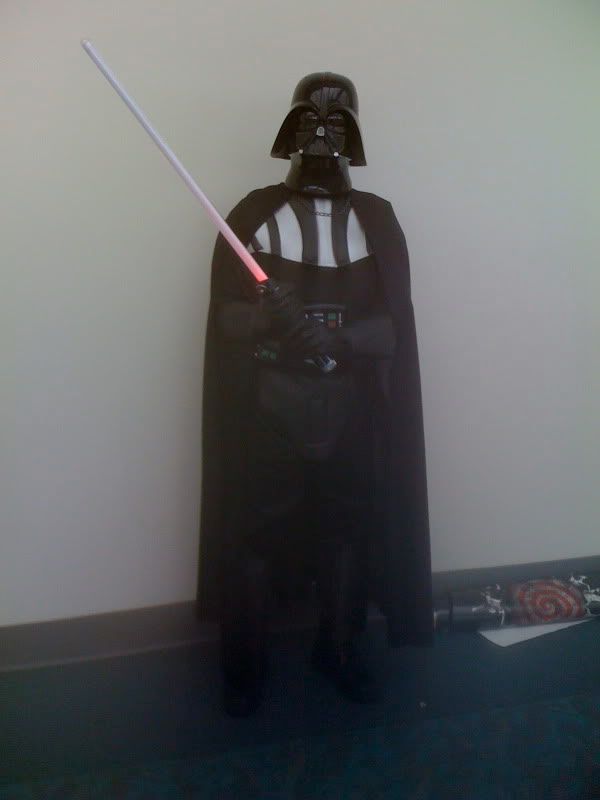
See you later tonight for Day 3 coverage of Comic-Con!
]]>
